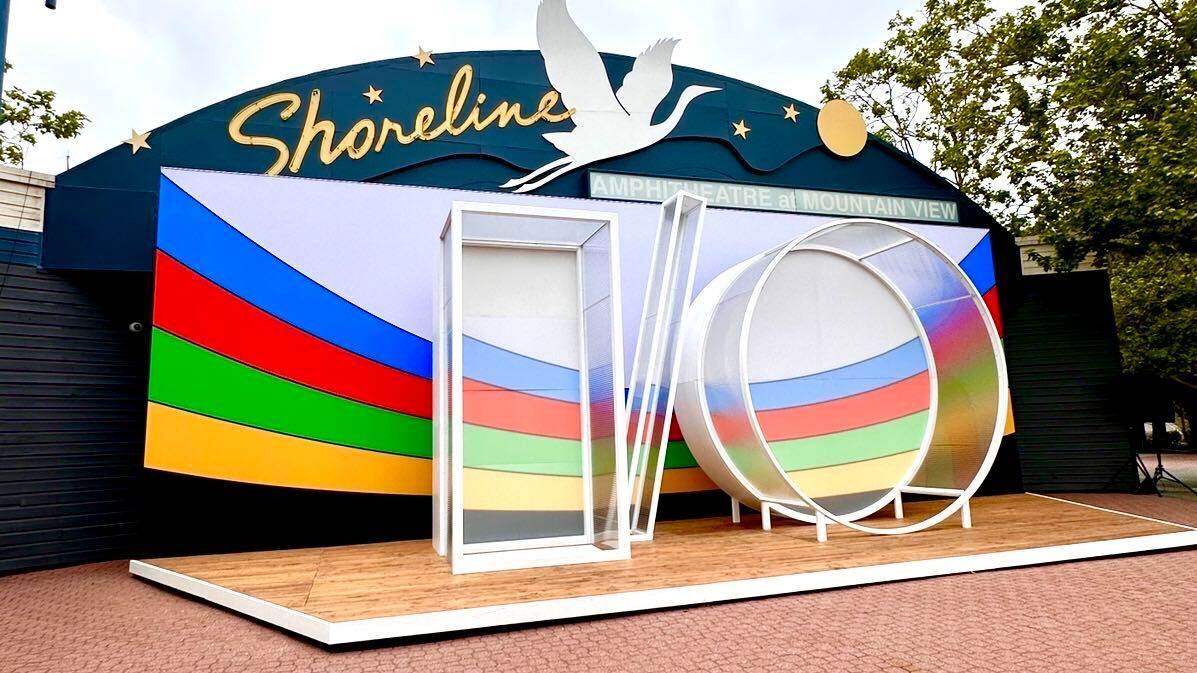
While new hardware was announced at Google I/O 2023, it was the company's AI initiatives that took center stage for much of the two-hour presentation. As was hinted at in a last-minute leak, Google used its annual developers conference as a platform to spell out its AI plans. Most significantly, it showed how its AI would be used to reimagine its search engine, which will potentially change how people look for and find what they need.
We also say how Google's AI initiatives will also impact Workspaces (Google Docs, Gmail, Slides and Sheets), Google Photos, Google Maps, and its other online products.
And, of course, we saw Google debut the Pixel Fold — its first foldable phone — as well as the Pixel 7a, a new sub-$500 phone, and the Pixel Tablet, which has a clever new docking station.
It’s a lot to keep track of, but we’re on the scene in Mountain View, Calif., for this year’s Google I/O. Follow along with this Google I/O 2023 live blog for the latest rumors and updates on Google’s announcements.
What we saw at Google I/O 2023
Here's a quick rundown of what was announced at Google I/O:
Google Bard and AI: As predicted, we saw the debut of PaLM 2, a new version of Google's Pathways Language Model which is the driving force behind the company's AI tools like Bard. The updated model focuses on coding, math and creative writing, and there's already a specialized version that can aid in medical diagnosis.
PaLM 2 has four submodels (Unicorn, Bison, Otter and Gecko) designed for different use cases, and is already powering 25 different Google products, including Android, YouTube, and Workspace apps such as Gmail, Google Docs and more.
Google previewed some of the ways that AI would be used for some of its products; for example, it's been testing out Help Me Write, which can compose entire emails for you in Gmail.
If you've been itching to try out Bard, good news: The Bard waitlist is gone.
Google Search: Most significantly, Google Search is being reimagined using AI, so that you can type in more natural-language queries, and Google will return a more conversational answer, rather than a series of links. It will also allow you to ask contextual follow-up questions to further refine what it is you're looking for. It's a radically different approach, and one that could upend anyone who relies on Google Search to reach consumers. So, like everyone. It's currently being tested, which you can try if you sign up for the waitlist.
Google Maps: A slick new immersive view is coming to Google Maps. Now, when you plot a route in the app, you can get a neat 3D flyover of the route, which will give you a bird's-eye look at where you'll be going. And, you'll also be able to add traffic, weather and air quality data to the route, too.
Google Find My Device: Similar to Apple's Find My feature, Google is also working on device location tracking. Like iOS, it will use Android devices to help you find your stuff — be it phones, tablets, or earbuds — wherever you may have left it. It will also work with third-party trackers — Tile and Chipolo were confirmed — and Google also noted that an anti-stalking feature would be included. There was no timetable on when it would be released, though.
Android 14: The first Android 14 beta came out last month, and we're expecting the finished version to be ready sometime toward the end of summer. However, nothing really new was announced at Google I/O. Still, you'll want to check out the new features coming to Android 14.
WearOS 4: Google did announce the developer preview for WearOS 4, the next version of its smartwatch operating system. Key features of the new OS include better battery life, new watch face tools, improved accessibility features, and a new text-to-speech engine that should be faster and more reliable.
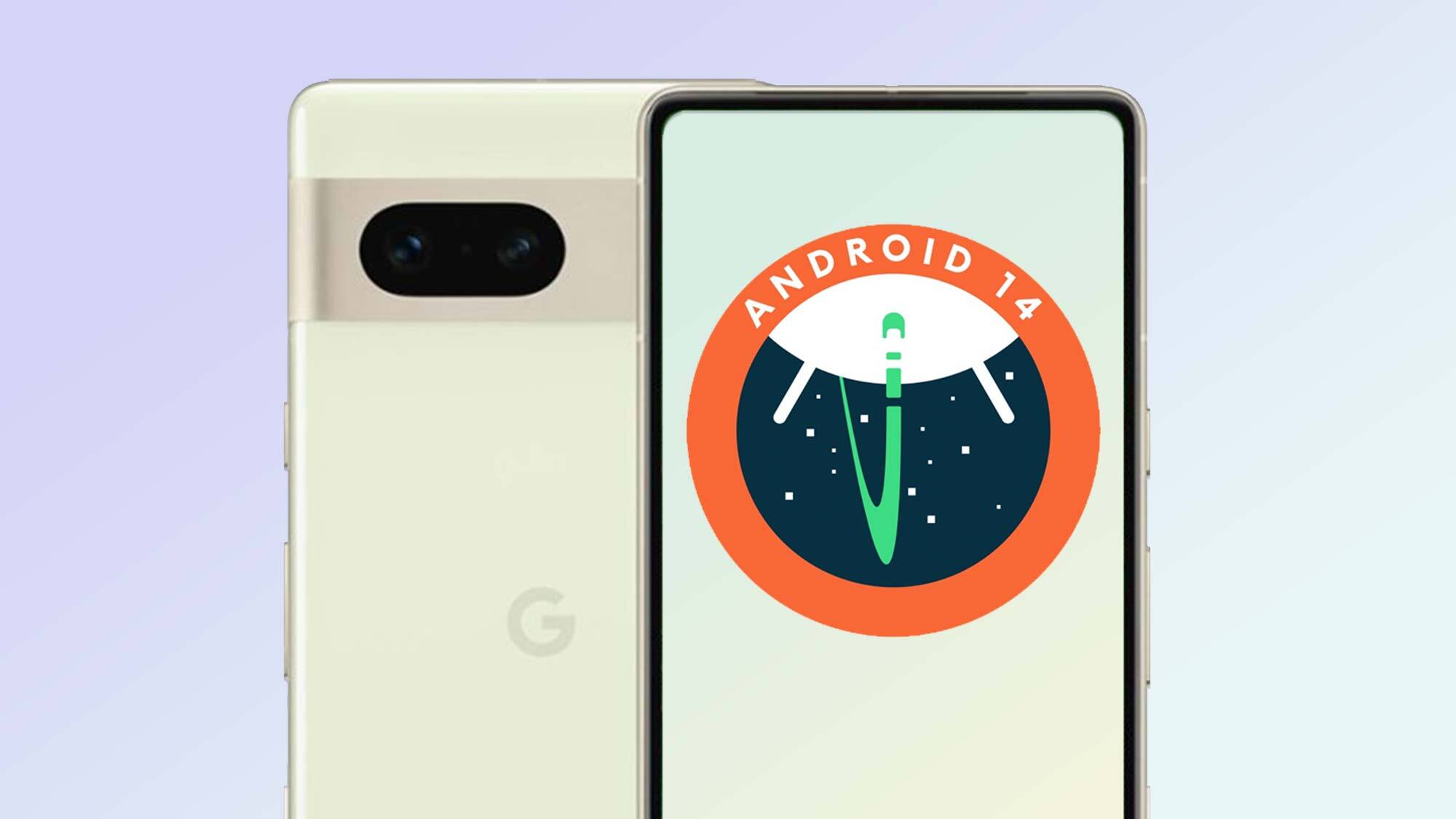
Google Pixel Fold: Google finally introduced its first foldable phone. The Pixel Fold Pixel Fold unfolds like a book to reveal a large 7.6-inch, 2208 x 1840 pixel display with a 120Hz refresh rate. The cover display is 5.8 inches in size, but has a wider aspect ratio than you'll find on the Samsung Galaxy Fold 4. The Pixel Fold is also the thinnest foldable, at 0.2 inches thick when open.
The Pixel Fold's rear cameras include a 48MP rear camera, 10.8MP ultrawide camera and a 10.8MP telephoto camera with a 5x optical zoom and 20x Super Res Zoom (digital). The front has a 9.5MP front camera and there's a 8MP inner camera.
Google Pixel Fold pre-orders start today (May 10), and the phone starts shipping in June. Verizon's release date is June 27. The Pixel Fold price starts at $1,799 for the 256GB model and goes up to $1,919 for 512GB.
Google Pixel 7a: The Pixel 7a uses the same chipset — the Tensor G2 — that powers current Google flagships, including the Pixel 7. The 7a packs two rear cameras —a 64MP (f/1.89) main and a 13MP (f/2.2) ultrawide — as well as a front-facing 13MP camera for selfies and such. It has a bright 6.1-inch OLED (2400 x 1080, 429ppi) display with a 90Hz refresh rate. At $499, the Pixel 7a is priced to compete with Samsung's Galaxy A54. But before you decide which of these budget phones is best, you'll want to check out our Google Pixel 7a review.
Google Pixel Tablet: Google teased us about a tablet at last year's I/O before giving us a full-on preview in the fall. And now, we know how much it costs and when it will be released: It's a very reasonable $499 — which includes the magnetic docking station — and is currently available for preorder; it will ship this month, too.
Other Google hardware teasers: We were hoping for teasers of the Pixel 8 and the Pixel Watch 2, but sadly neither made an appearance at the show.
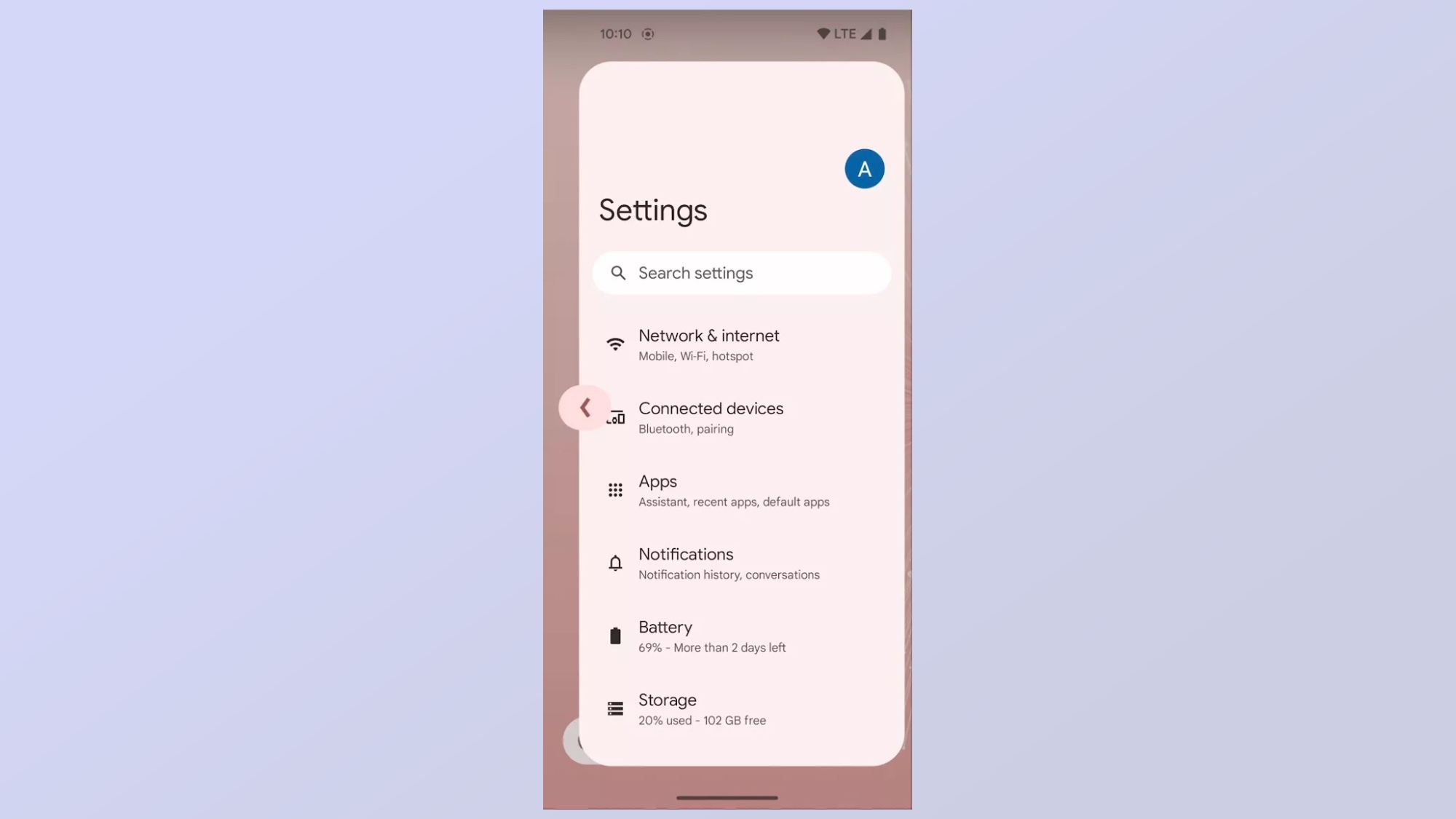
It's tempting to think of Google I/O as the Android show — after all, this is a developer conference and I/O usually provides a platform where Google can tell app makers all about the changes coming to Android phones via the Android update that's coming later in the year.
At Google I/O 2023, Android is probably taking a backseat to all the hardware news and AI talk that's going to dominate this year's event. But there's still probably an Android 14 preview in our future. In case you missed it, Richard Priday covered the 5 biggest Android 14 features we hope to hear more about at Google I/O.
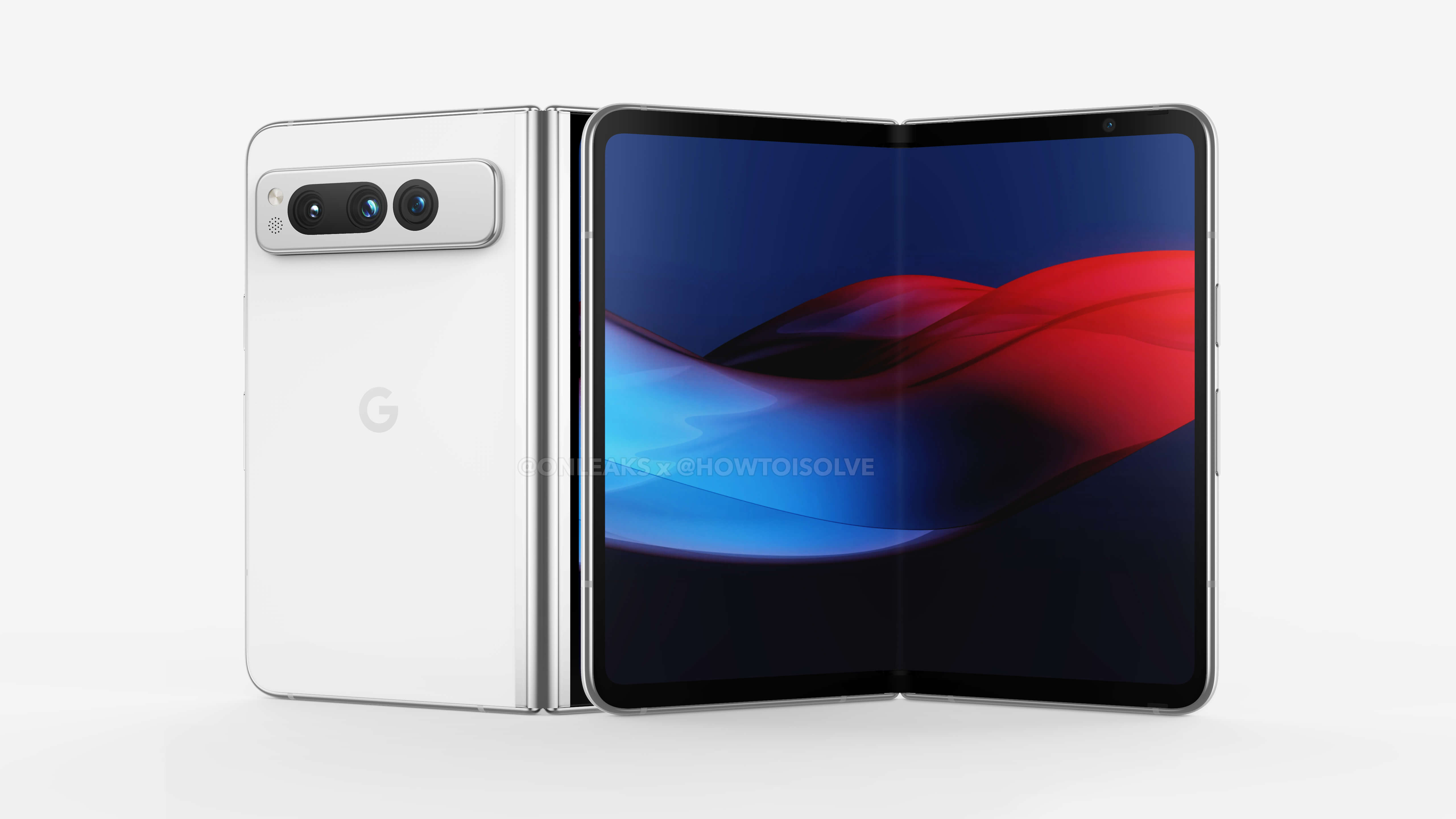
Probably the most anticipated announcement at Google I/O figures to be the launch of the Pixel Fold — something Google has already told us will happen via a tweet last week teasing the phone’s release.
Perhaps the biggest reason for the interest in Google’s foldable phone is that it finally means competition for Samsung, which has had the market for the best foldable phones all to itself up until now. Whatever Google announces today will certainly invite comparisons to the Galaxy Z Fold 4 and the Galaxy Z Fold 5 that’s expected to arrive in a few months time.
You’d think Google would have its work cut out for it, taking on a foldable that’s already up to its fifth generation. Yet, Mark Spoonauer writes that there are some ways the Pixel Fold can beat out the Galaxy Fold — and it all comes down to design and cameras.
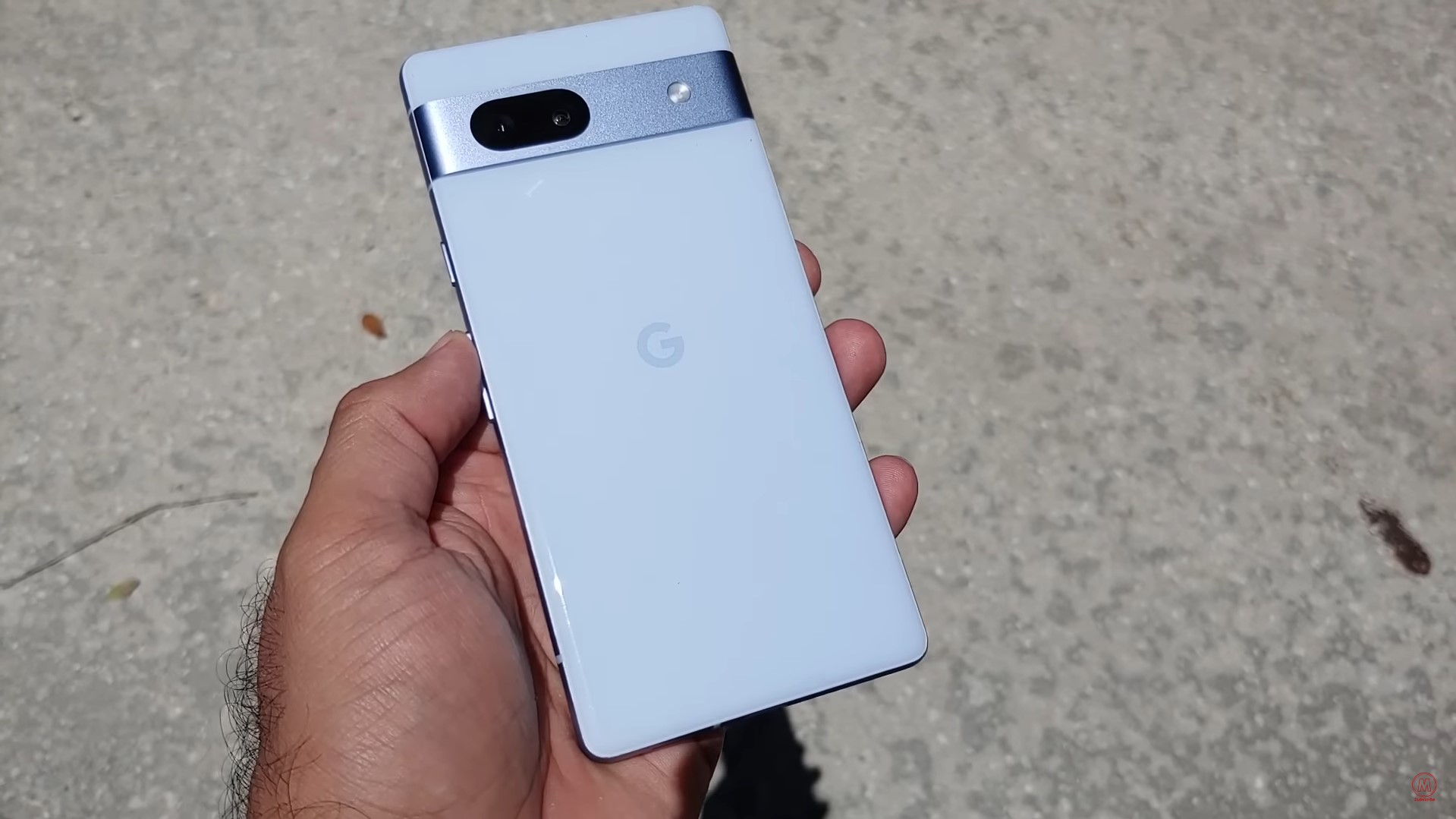
Google has never been particularly good at plugging leaks, especially where its phones are concerned. So it should be no huge surprise that some people got hold of the Pixel 7a early, and posted their initial impressions online.
There's one hands-on video from YouTuber munchy, which goes into great detail about the Pixel 7a and what it has to offer. The hardware nerds out there may also be interested in a complete teardown of the phone from PBKreviews, and focusses on the physical hardware you wouldn't normally see.
There isn't much in these videos we haven't already heard in other leaks. But it does seem to corroborate a number of those rumors, including the 90Hz refresh rate and the size of the Pixel 7a's battery. Though there do appear to be a number of inconsistencies, which suggests Google may still have a few surprises in store for us. But we'll presumably find out more on that later today.
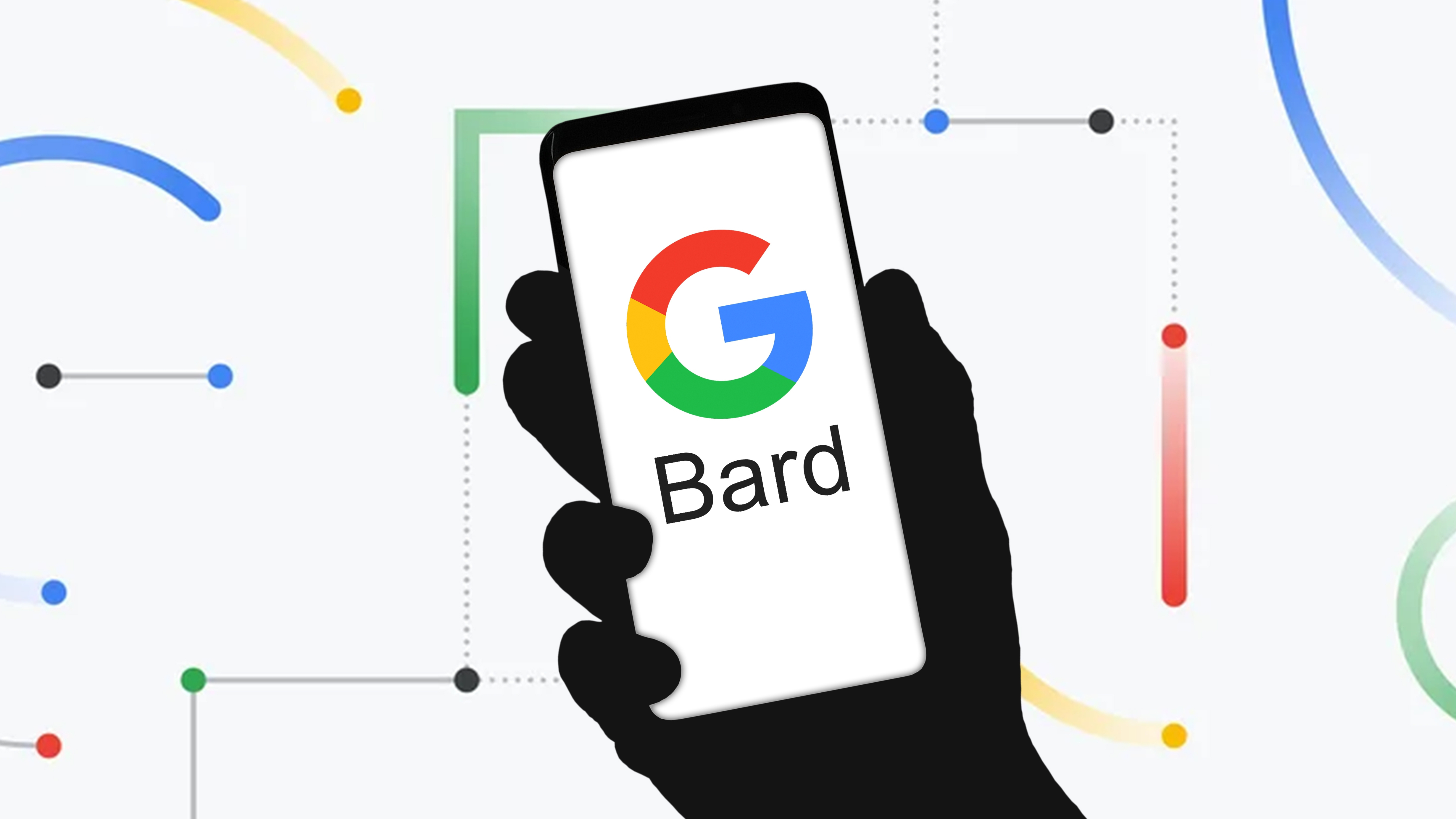
A safe bet on what’s going to happen at Google I/O is that you will hear the word “Bard” so many times, it will lose all meaning to you by this afternoon.
Google Bard is the search giant’s answer to ChatGPT, and it’s being used for things like answer questions or planning out events, trips and parties. Google seems to be pushing Bard as a natural extension of its search tools, and one of the ways it can do that is by getting more people to use that. If only Google made phones and a mobile operating system that could put Bard in front of more people…
As it turns out, reports have circulated that’s exactly what Google plans on doing — starting with the addition of Bard to Pixel home screens, possibly in the form of a widget. Is that something we could find out about today? It’s going to be a packed Google I/O keynote after all.
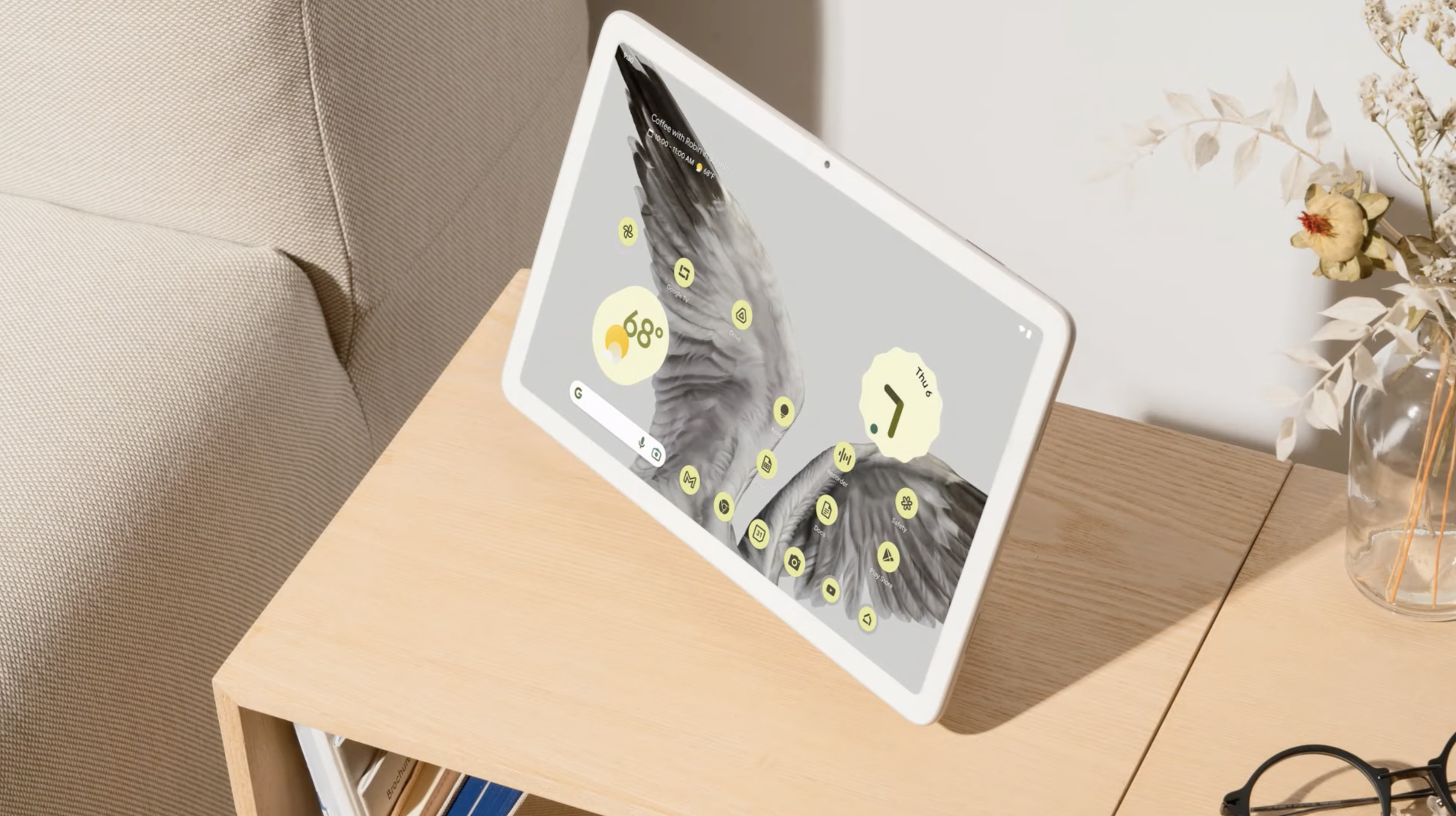
A lot of pre-I/O attention has focussed on the Pixel 7a and the Pixel Fold, with good reason. But they aren't the only hardware products we expect to see, since the Pixel Tablet should also make an appearance — and it looks like it's almost ready to be released.
How do we know? Because Amazon Japan jumped the gun, and posted its listing for the tablet a few days early. The listing also revealed the sort of specs we should expect, with the tablet apparently running on the Tensor G2 chipset, 8GB of RAM, 128GB or 256GB of storage, a 10.95-inch LCD display with 2560 x 1600 resolution, and a 27Wh battery. There are also apparently two 8MP cameras (one on the front and back) complete with f/2.0 aperture.
We don't know much about pricing in the United States, but the listing had a 80,000 yen price for Japanese customers. That works our at around $590, but variations in international pricing is a little more complicated than that. We'll no doubt find out more during the I/O keynote later tonight
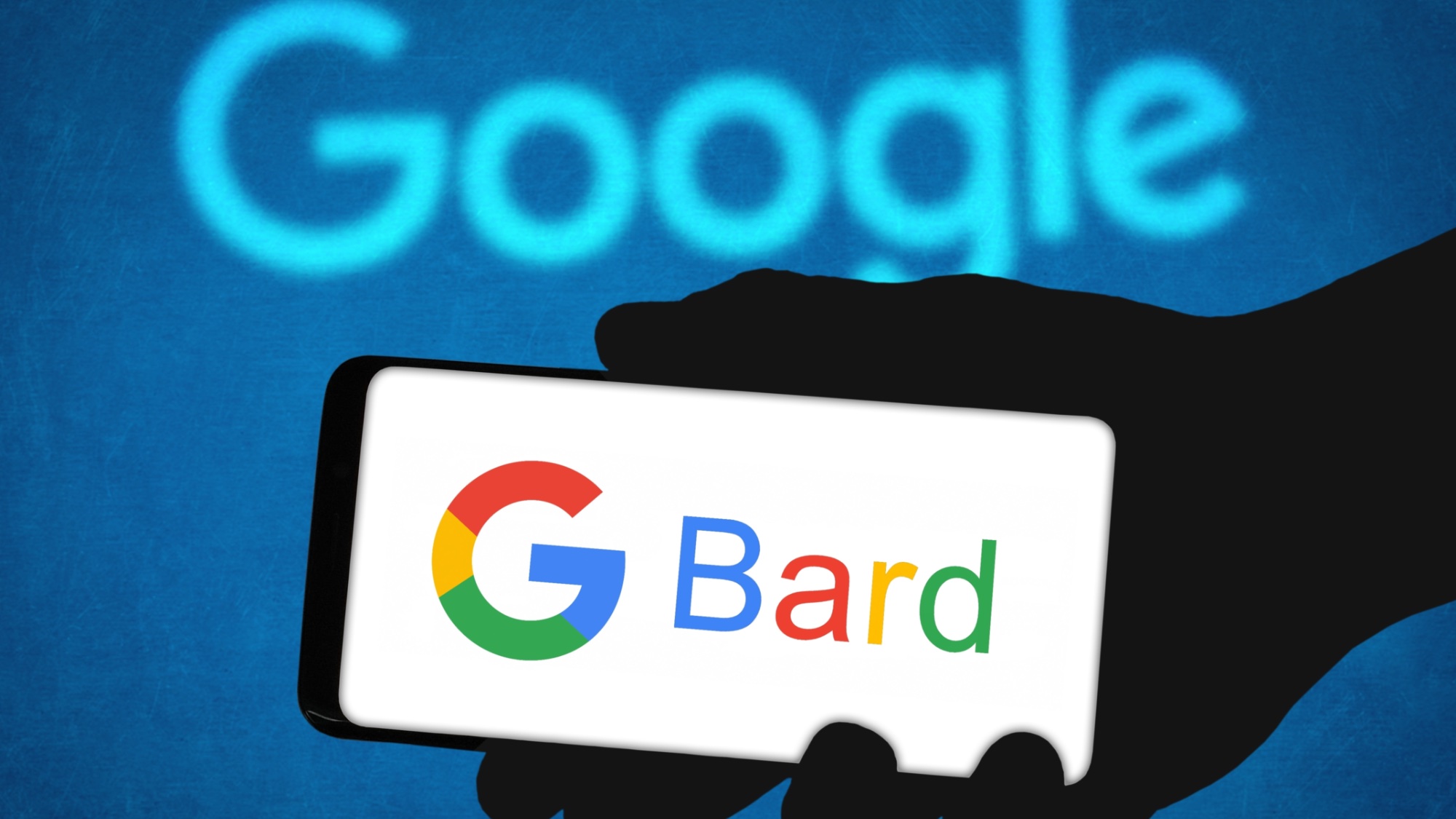
If you're feeling a little impatient and can't wait for Google to officially announce its upcoming plans for Bard, you're in luck. A bunch of the key details have already leaked detailing most (if not all) of Google's AI-centric I/O announcements.
According to documents seen by CNBC, AI will be a key feature at this year's I/O conference. But we may not hear much about Project Magi, Google's plan to integrate AI with its search engine. Instead the documents detail various upgrades to the Bard AI chatbot and the PaLM 2 large language model that powers the chatbot.
In fact the upgrades could see the integration of multimodal functionality in Bard. That would allow the AI to handle input and output with something other than text — which would be a big step forward.
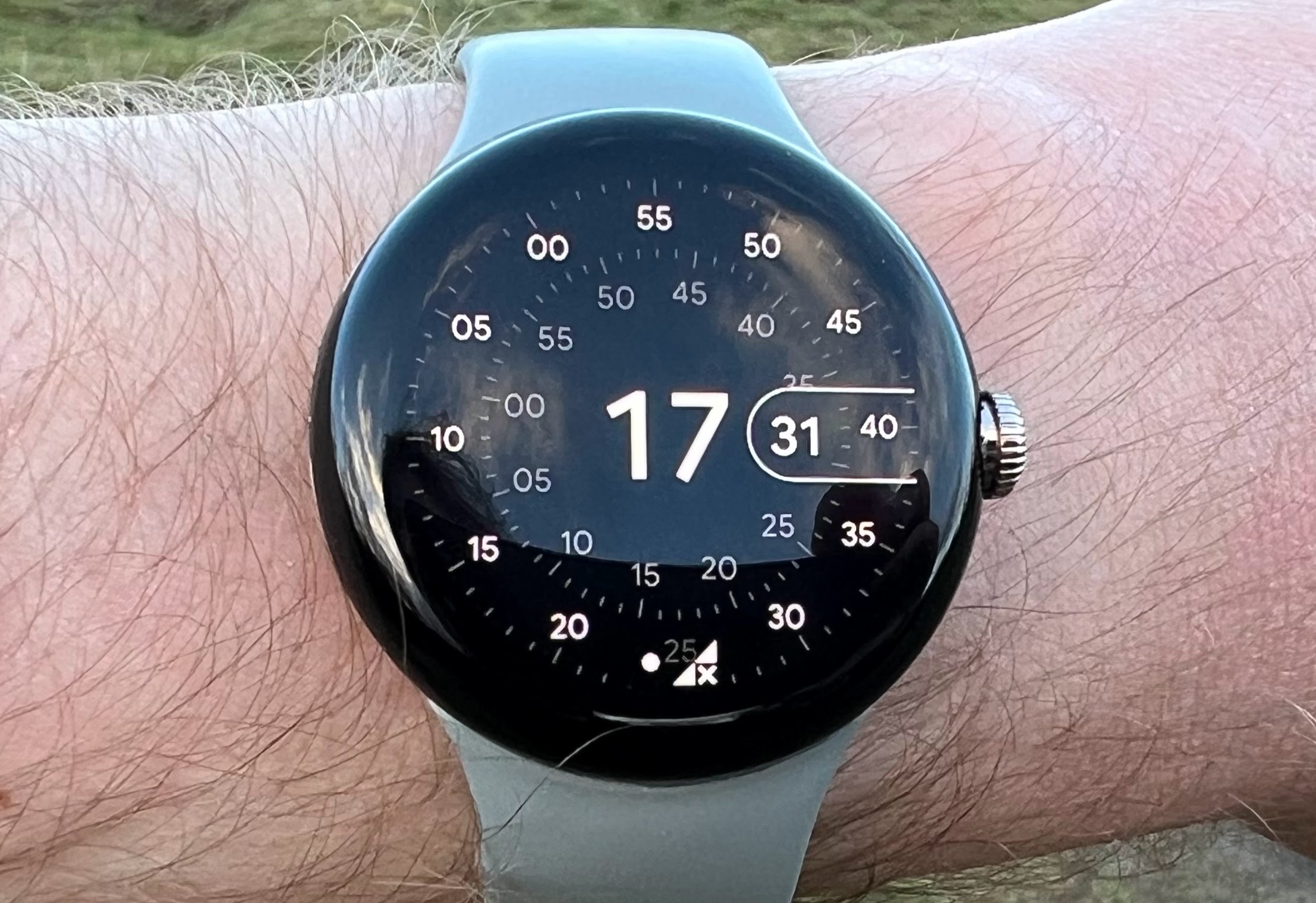
One thing we're not quite so sure about for Google I/O 2023 is whether the Pixel Watch 2 will be making an appearance. While the watch itself isn't likely to arrive until later this year, there is a possibility that Google could tease the new smartwatch the same way it did with the first Pixel Watch last year.
We don't know much about the Pixel Watch 2 right now, so any glimpse we get should prove to enlightening — even if it's just to a small degree. We're certainly hoping to see an improved design, with smaller bezels, longer battery life, and more health sensors that can help the wearable compete with the likes of Samsung and Apple.
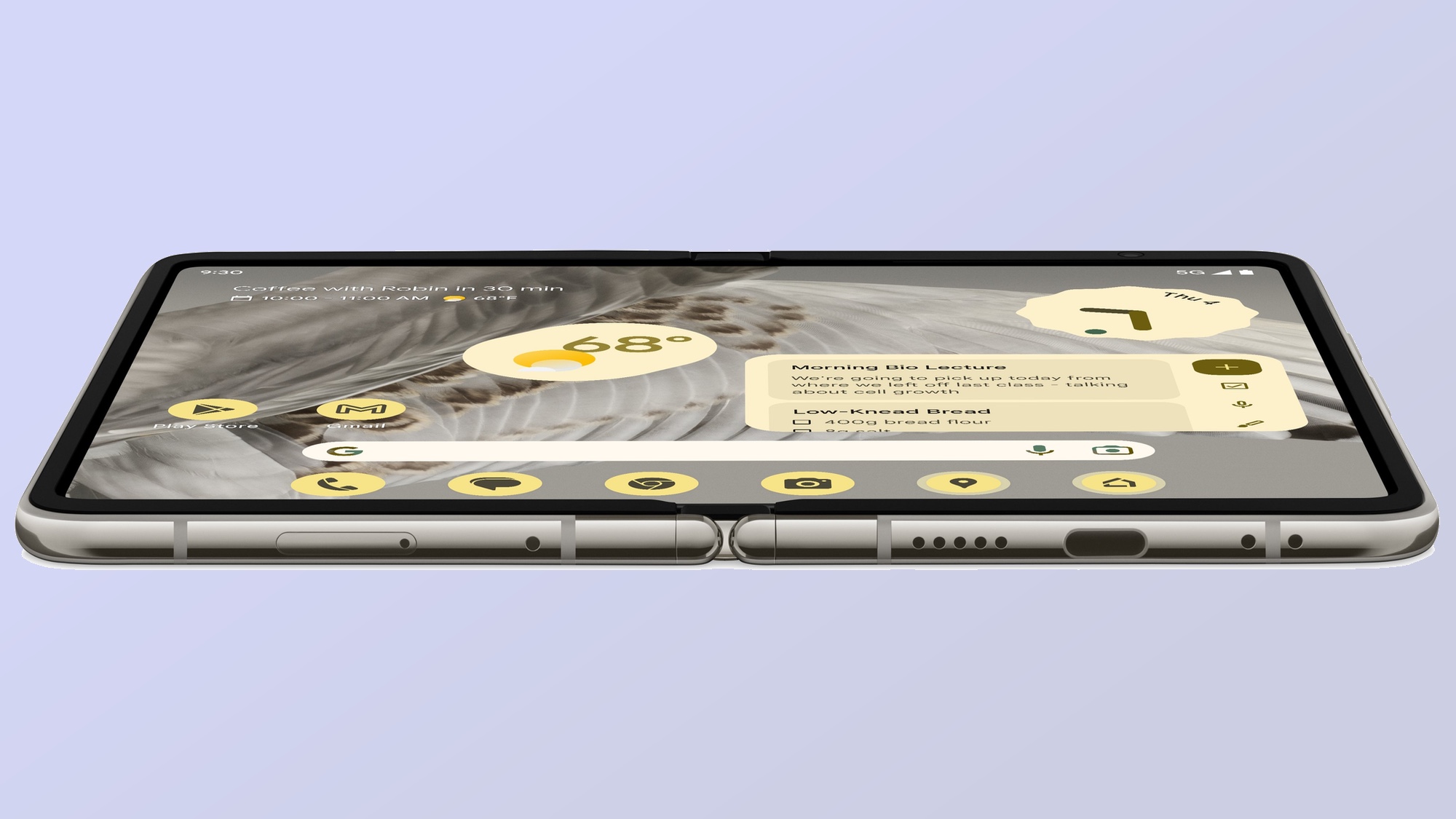
We’ve seen a lot of different Pixel Fold images out there, to the point where we know that Google’s adopting a similar design to the Galaxy Z Fold from Samsung — the phone will open up to reveal a larger screen, much like a book. Of course, rumors suggest Google has found a thinner design that makes its Fold a bit easier to carry around.
To give you an idea of what this might look, leaker Evan Blass has posted an image of a fully opened Pixel Fold. With the caveat that these images can be processed within an inch of their life, the lack of a noticeable crease is… intriguing.
Just because Google I/O is just hours away hasn't stopped the leaks from hitting the net. In fact there have been a bunch of last minute leaks showing off a bunch of stuff that will stop being interesting once the keynote presentation begins.
Like this alleged promo video from OnLeaks, showing off what looks like the Pixel 7a from every angle. It seems to be an official marketing video direct from Google itself, albeit with French captions. Nothing in the video is a major surprise, given the sheer amount of leaks we've seen already, but if you want an official-looking glimpse at the Pixel 7a ahead of launch, this video is your chance.
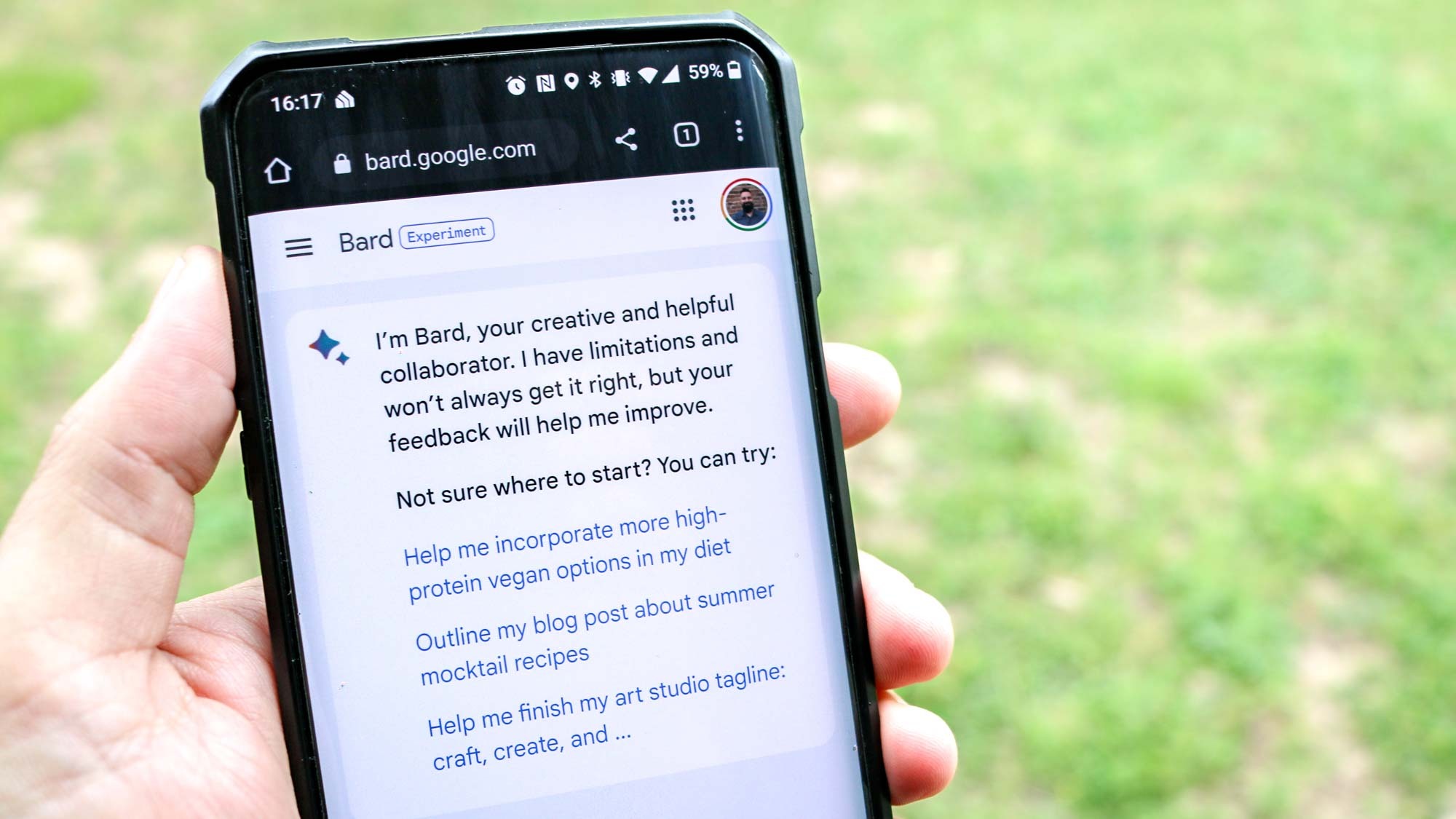
Google clearly has big plans for Bard, based on some of the leaks we've heard, but it could also be making the leap to Android homescreens. As with so many other new features, word is that this will kick off with Google's own Pixel phones.
According to a report from 9to5Google, based on code in the latest Android app APK, it looks like Google could launch a homescreen widget with direct access to Bard. The report claims this will be a Pixel exclusive "at the start", but it may not stay that way for long. After all if google wants Bard to succeed in the face of competition from ChatGPT and Bing AI, it's going to need to find a way to get users engaged.
Unfortunately we don't know what else will be involved with this widget, and whether it could offer more than one-tap access to Bard. Hopefully things will be elaborated on during the I/O keynote later tonight.
If the leaked Pixel 7a promo wasn't enough for you, then maybe this leaked Pixel Fold promo will help satiate your appetite for Googly news. Believe it or not this one was posted on the official Google Pixel Twitter account, though it's not clear whether this was deliberate or some sort of mistake.
Regardless of how the video ended up online, it's the contents that are more interesting. Apparently Google will be partnering with the NBA, and this video is designed to advertise that partnership — as well as the features and capabilities of Google's first foldable phone.
It also gives us a good look at the phone's design, including its super slim profile, camera bar and the unfortunately chunky bezel around the inner display.
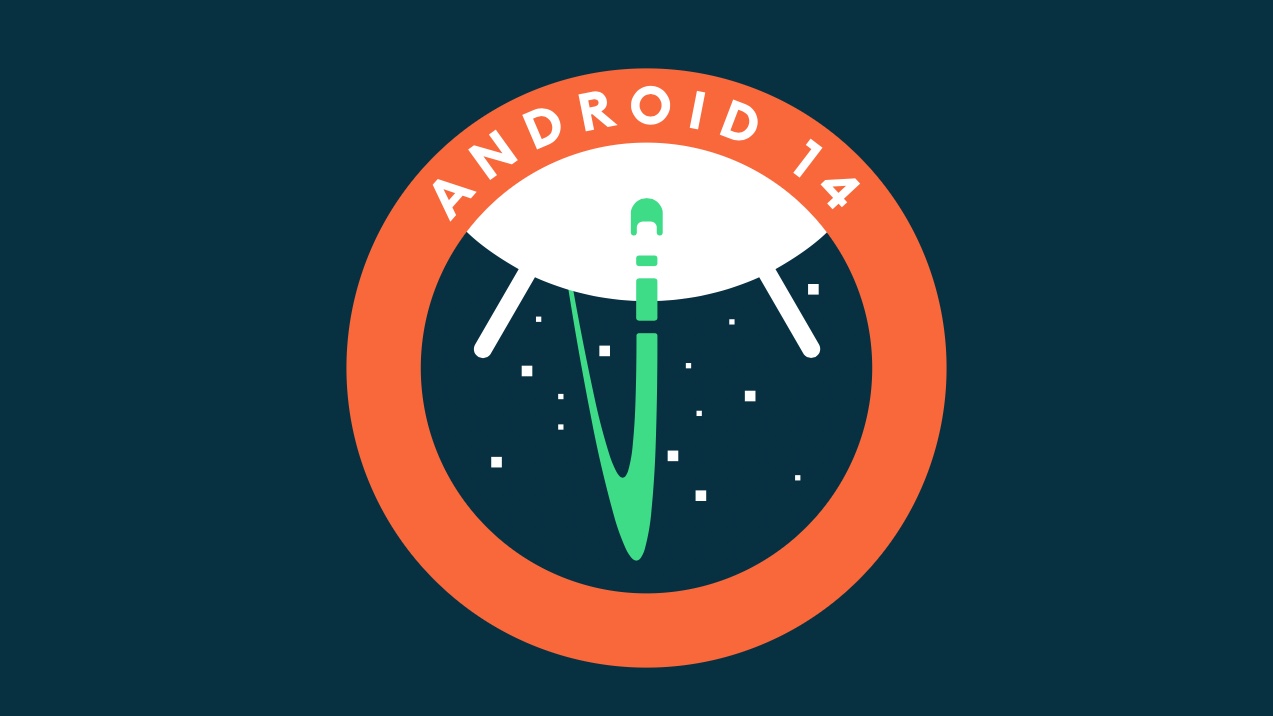
We're also expecting Android 14 to be a major topic of discussion during the I/O keynote presentation, alongside some of the new features that should be coming to Android phones in the next few months.
We already know about some of those features, thanks to the Android 14 beta, but there are a few more we're expecting to see during the I/O keynote later today. That includes the rumored split ringtone and notification volume sliders, a predictive back gesture, app cloning, and more details about passkeys — the latest attempt to ditch passwords, the split ringtone
Of course with the expected launch of the Google Pixel Fold and Pixel Tablet, we want Google to talk more about its work optimizing apps for larger screens. Because that's something it hasn't done a great job of in the past.
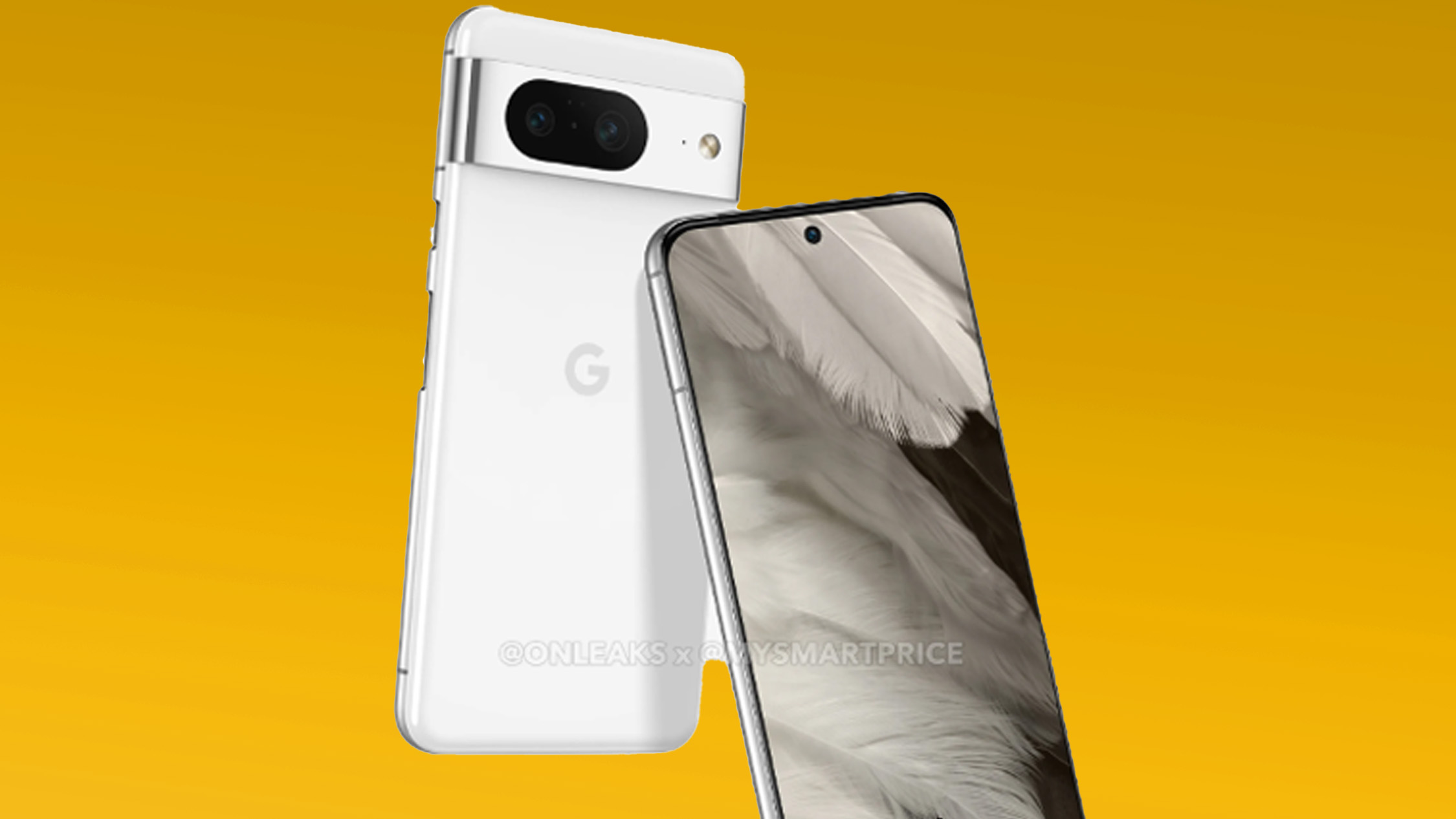
While a lot of focus is on the Pixel 7a and the Pixel Fold, they may not be the only smartphones on show at Google I/O 2023. In fact, if last year is anything to go by, we may end up getting our first look at the Pixel 8 and the Pixel 8 Pro — which we're expecting will formally launch sometime this fall.
Despite the fact the phones aren't going to arrive for a few months, we might have already learned some key details about both phones. Case renders suggest that the trademark Pixel camera bars are here to stay, though the Pro may end up ditching the curved display in favor of a flat one. Then of course there's the Tensor G3 chipset, which might unlock even more AI-centric features — including video unblur.
Don't expect much to be announced today, since the most we're likely to get is a quick look at the design. But it is one more thing to get excited about.
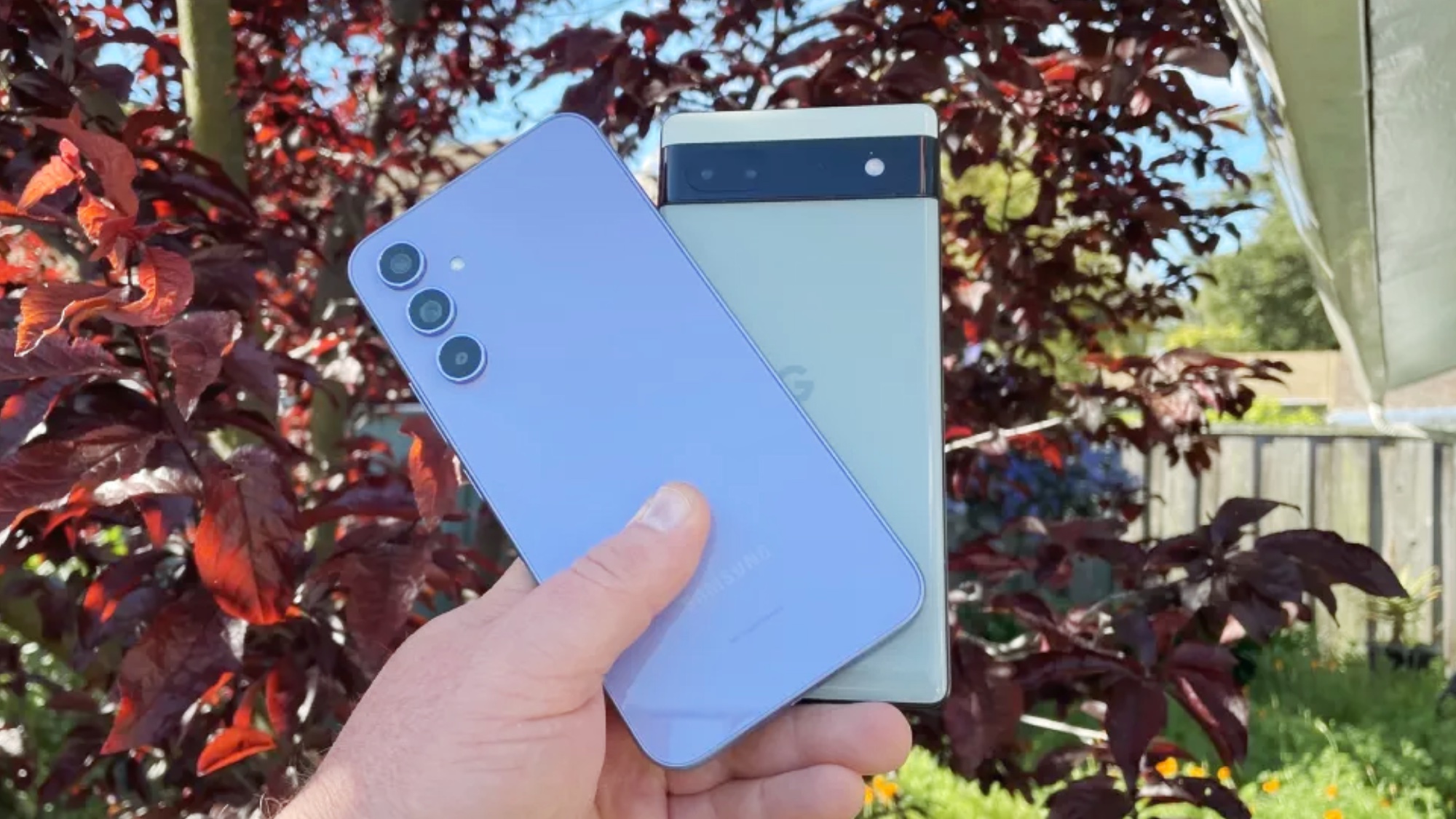
Should Google reveal a Pixel 7a today, the new budget phone is going to invite inevitable comparisons to Samsung’s Galaxy A54. What’s the Galaxy A54, you’re asking? Better read our Samsung Galaxy A54 to familiarize yourself with why the Pixel 7a has such a high bar to clear.
The Galaxy A54 costs $449, the same amount Google charged for the Pixel 6a. Samsung’s phone has a display with a 120Hz refresh rate, and it’s adopted the main camera used by the Galaxy S23. We actually think it takes better pictures than the Pixel 6a now, as you can see for yourself in our Galaxy A54 vs. Pixel 6a camera face-off.
Cameras are such a big part of the Pixel A series identity, that we’re eager to see how Google answers the Galaxy A54. Word is Google has a camera improvement of its own planned for the Pixel 7a, so we’re interested to find out if that rumor is true.
Today’s the day 🎉Join us online for #GoogleIO at 10am PThttps://t.co/UVJ58IaEI2 pic.twitter.com/0FRb93fJEcMay 10, 2023
We're now just three hours away from Google I/O 2023 and news has currently slowed to a trickle. So let's take a moment to recap some of the exciting phone leaks we have seen in the lead-up to Google's big day.
First, there's already hands-on footage for the Google Pixel 7a, a phone that hasn't even launched yet. Check out this YouTube video to see the new budget Android phone from every angle.
And speaking of videos, Google accidentally leaked a Google Pixel Fold promo on the official Google Pixel Twitter account. The video has since been pulled, but check out our coverage of the Fold leak to see this sneak peek of Google's first foldable.
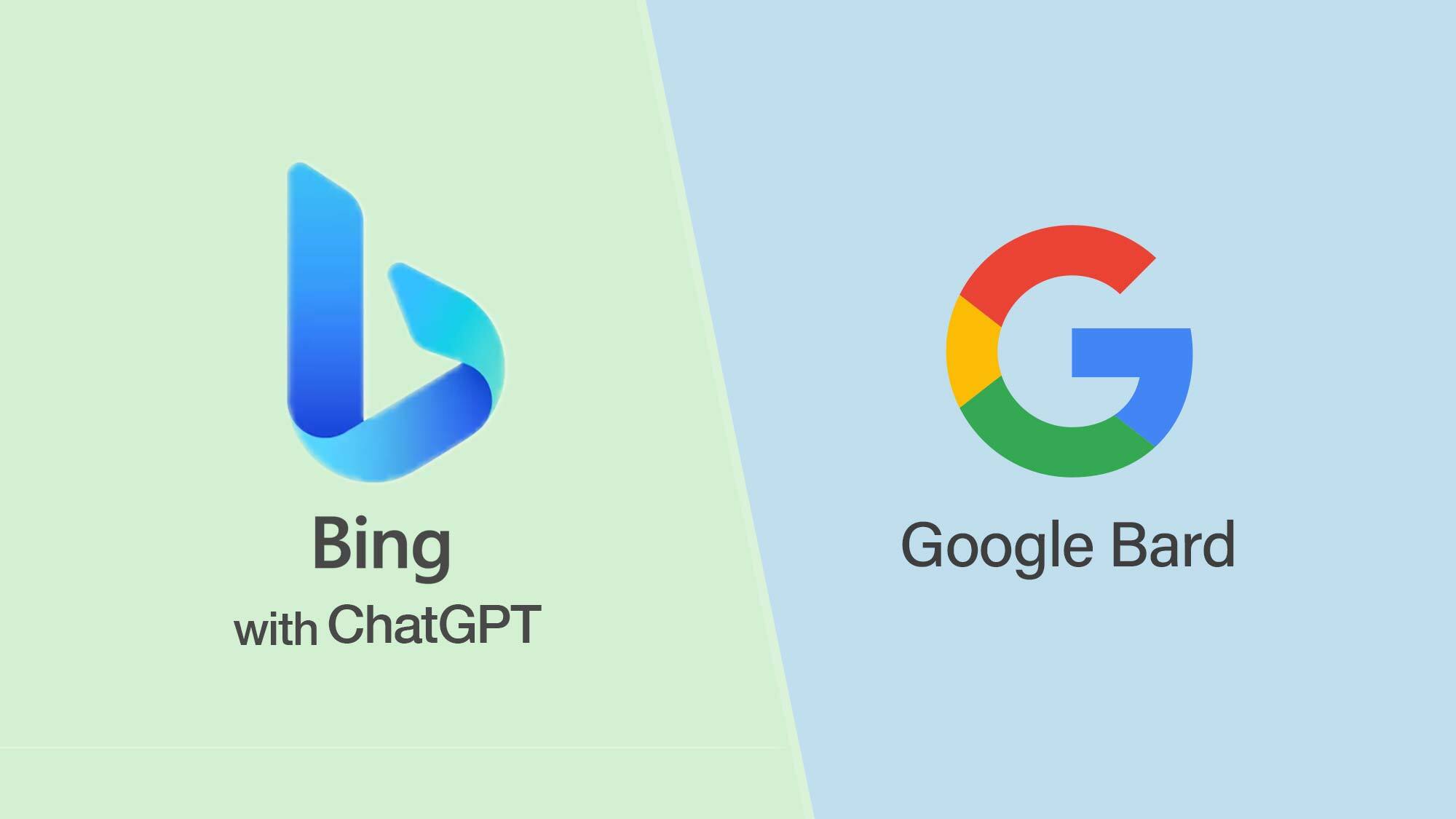
Google Bard is expected to get quite a few updates and upgrades today, with the highlight being rumored multimodal capabilities. This is when you can feed the AI chatbot images or videos instead of just text (or vice versa). We've seen some previews of this in GPT-4 and Bing Chat and it's clearly the next big thing in AI.
But for the moment, Bard is pretty limited in what it can do. Still, we've given the Google chatbot a few tests to see what it is capable of.
So if you want to see what Bard can do now, check out our Bing with ChatGPT vs Bard face-off. And if you want to test out the chatbot yourself before I/O, make sure to look at our guide on how to use Google Bard.
Oh, it's #GoogleIO already? Well, here you go. First up, #PixelFold1/3 pic.twitter.com/YKxJ9Qxda7May 10, 2023
We have a new Pixel Fold leak!
SnoopyTech on Twitter has posted a new Google Pixel Fold promotional video that looks like it's a leak of an official Google promo. The video touts several features of Google's first foldable phone, including multitasking, a lay-flat foldable screen and the ability to display at multiple angles for optimal viewing. It also makes the bold claim of being the "thinnest foldable," which officially puts Samsung on notice.
And that's not all the video teases. While the video shows off multitasking on multiple screens, the fine print claims that dual-screen support won't come until Fall 2023. But the biggest news might be that we may finally have a release date. according to this leak, the Pixel Fold will finally be available on June 27. Stay tuned for the official announcement later today.
I’m at Google I/O! Stay tuned for an exciting day at the Shoreline Amphitheater #GoogleIO2023 pic.twitter.com/AuO72MKzFqMay 10, 2023
Tom's Guide has officially arrived at I/O. We will have multiple staff members on-site at I/O to bring you all the latest news and updates today. So make sure to stay tuned to us here and on Twitter throughout the day.
Next up, the #PixelTablet pic.twitter.com/PPrsDTn7ARMay 10, 2023
Well, we thought news had slowed to a trickle but now it's a downpour. We have yet another Google promotional video leak — and this time it's the Google Pixel Tablet.
The leaked video comes yet again from SnoopyTech, though this one sadly doesn't include a release date. Instead, it highlights the versatility of the Tablet, which lives on an included speaker dock when it's not in your hand. The video also promises HD-quality video calls and the ability to transfer content between your Pixel devices.
While the Tablet's speaker dock looks great, I can't say the same for the chunky bezels on the Pixel Tablet. I'm sure the tablet will still look great, but giving up some bezel for a bit more screen size would have been a welcome sight. Maybe the next generation will slim things down a bit.
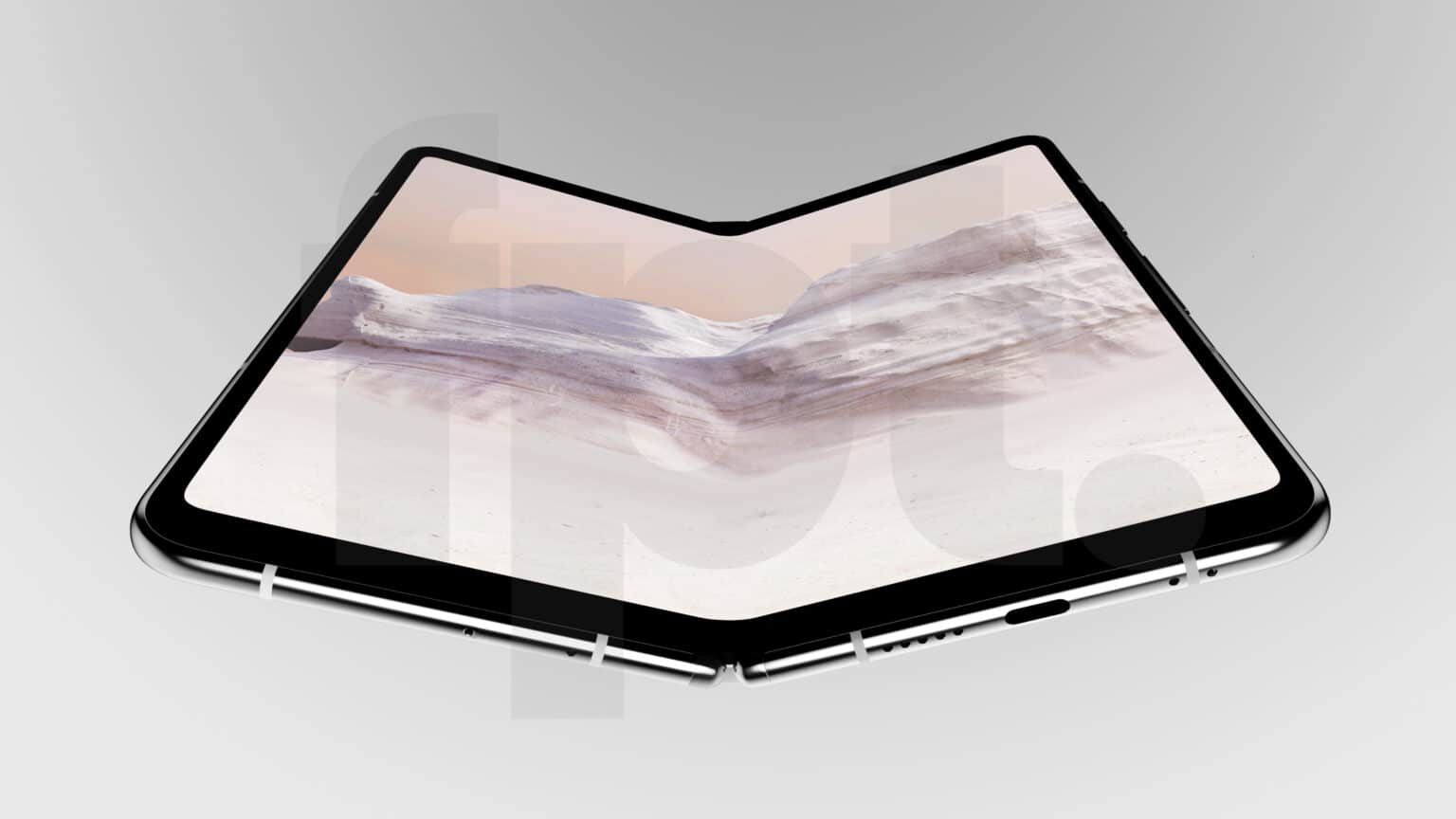
If Google wants to dethrone the Samsung Galaxy Z Fold as king of the foldables, it's going to need to do a couple of things. Luckily, we already thought of three ways the Pixel Fold can beat the rumored Galaxy Z Fold 5.
The biggest thing would be a tougher, thinner design. Based on the leaked promotional video we just saw, the thin part seems to be locked down if the Pixel Fold truly is the "thinnest foldable." But it remains to be seen how the hinge holds up — though it's reported to be the "most durable hinge on a foldable."
Aside from that, the big upgrades we'd like to see are a camera that can hold up with the best camera phones and a more usable outer display. Personally, the cameras on foldables are a big reason I haven't made the switch, so I'll definitely be keeping an eye on what the Pixel Fold brings to the table.
@tomsguide ♬ original sound - Tom’s Guide
Hello from inside the Shoreline Amphitheater! Google I/O is just about an hour away and we are ready to see what Google unveils today. Make sure to follow along here and on our social media accounts — including TikTok!
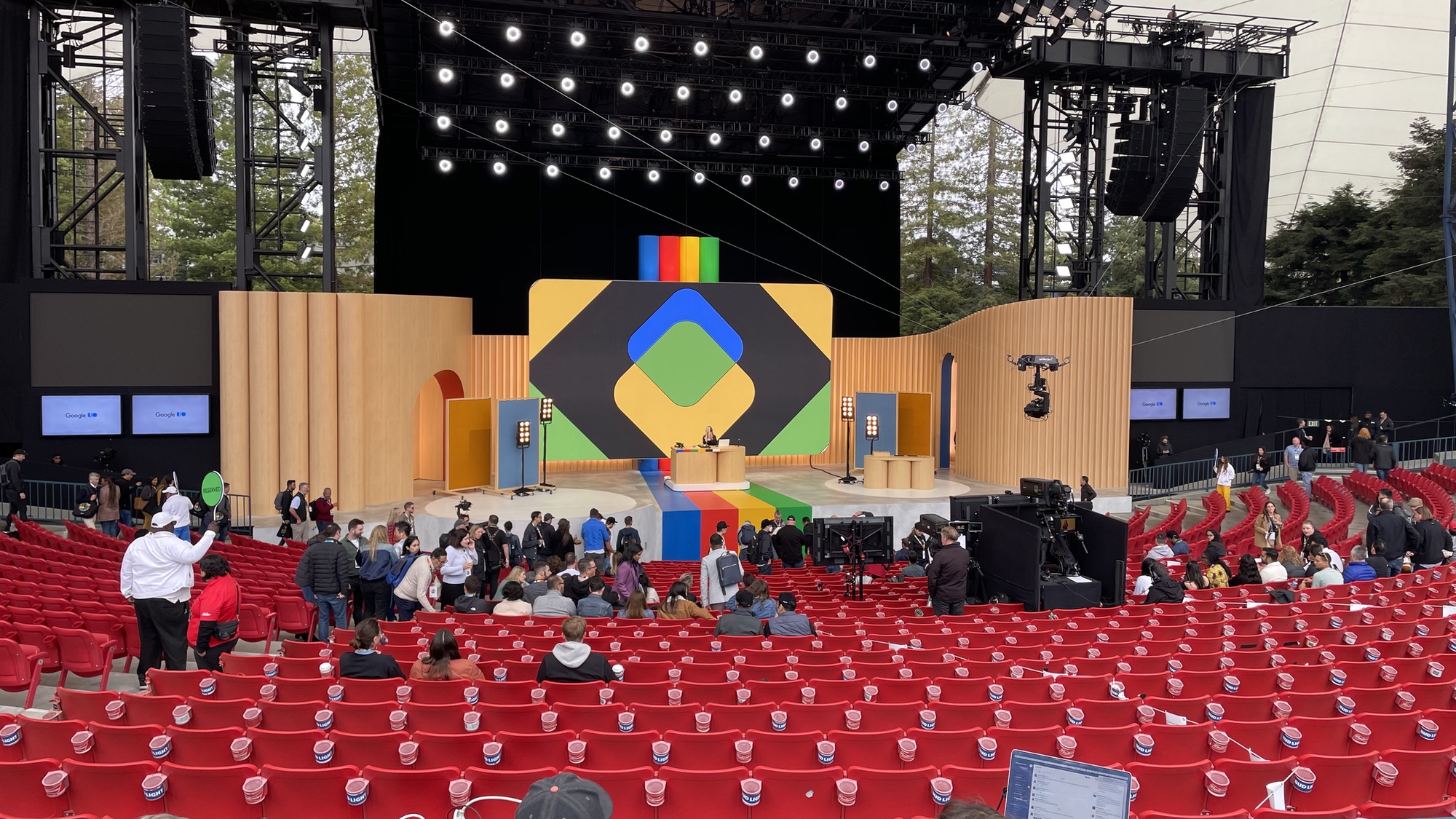
Philip Michaels here, live from Mountain View. Thanks to my colleagues Tom Pritchard and Malcolm McMillan for keeping our Google I/O 2023 live blog going while I made it through security to my seat at the Shoreline Amphitheatre.
This is my vantage point for the rest of the day, and a view of the venue about an hour ahead of showtime. Don't let the empty seats fool you, though — there's a big crowd of Google I/O attendees and developers outside about to be let in to fill the lower bowl of the amphitheatre.
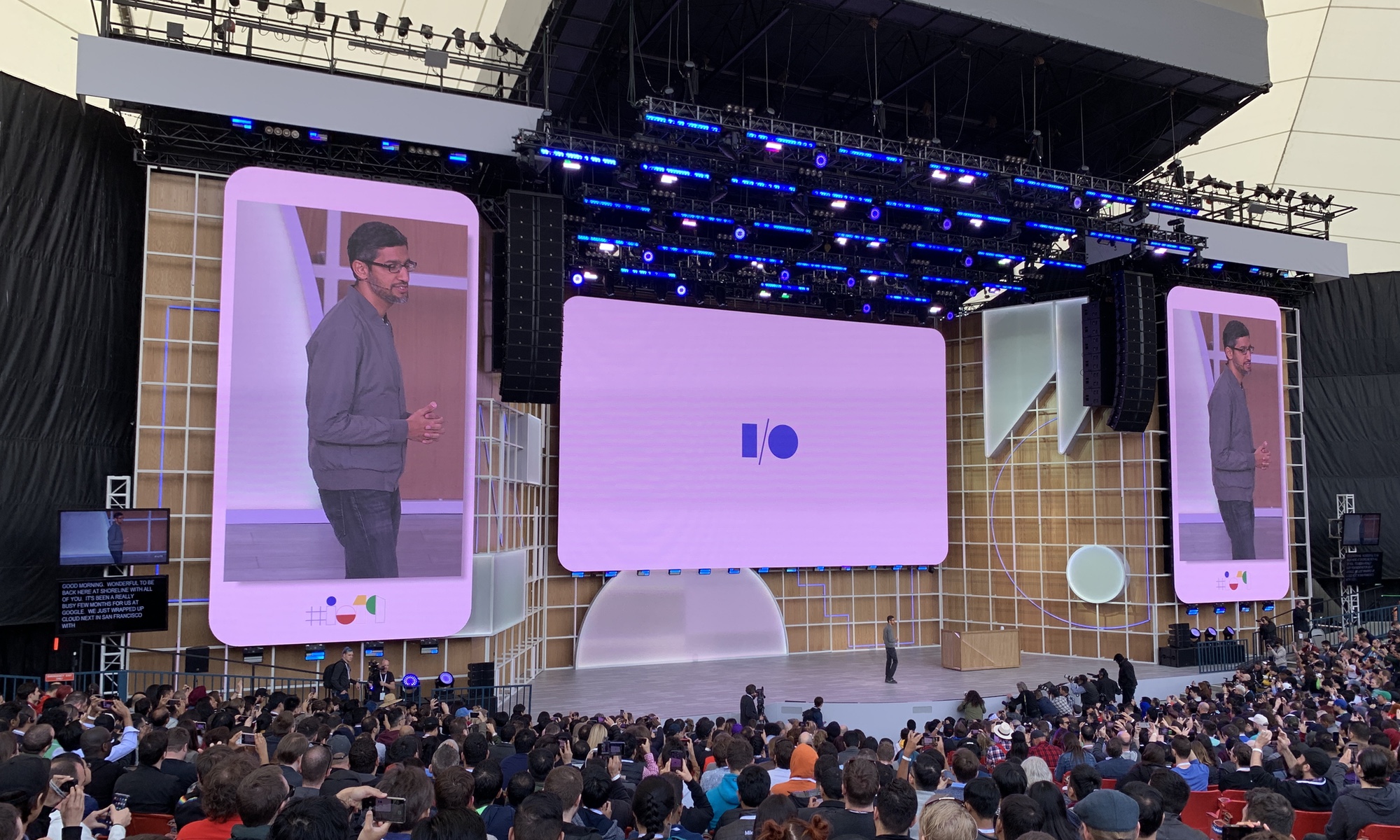
This is the 15th anniversary of Google I/O, incidentally, and Google is marking the occasion with a post on the history of its developer conference. Even if that sort of thing doesn't intrigue you, at least you can learn the origin story behind the I/O name to thrill on-lookers at your next party or get-together.
Google Pixel 7a (quick impressions)- Premium build, in-hand feel exactly like Pixel 7, with Glass back & metal frame.- Bright & Fluid 90Hz OLED panel, no major issues here.- 64MP cam gets you a good amount of detail & takes classic rich shots (16MP binned), with spot-on…May 10, 2023
If you need some last-minute leaks to whet your appetite ahead of the Google I/O keynote, leaker Yogesh Brar tweeted out some first impressions of the Pixel 7a. Based on the tweet, it sounds like the Pixel 7a shares a lot in common with the Pixel 7, right down to the performance. (Not surprising, since both phones are supposed to have a Tensor G2 chip inside.)
Brar also confirms that rumor about the 90Hz refresh rate on the Pixel 7a's display. "Bright & Fluid," he tweets.
We've got a full account of those Pixel 7a hands-on impressions, along with a leaked video apparently showing off a TV ad for the new phone.
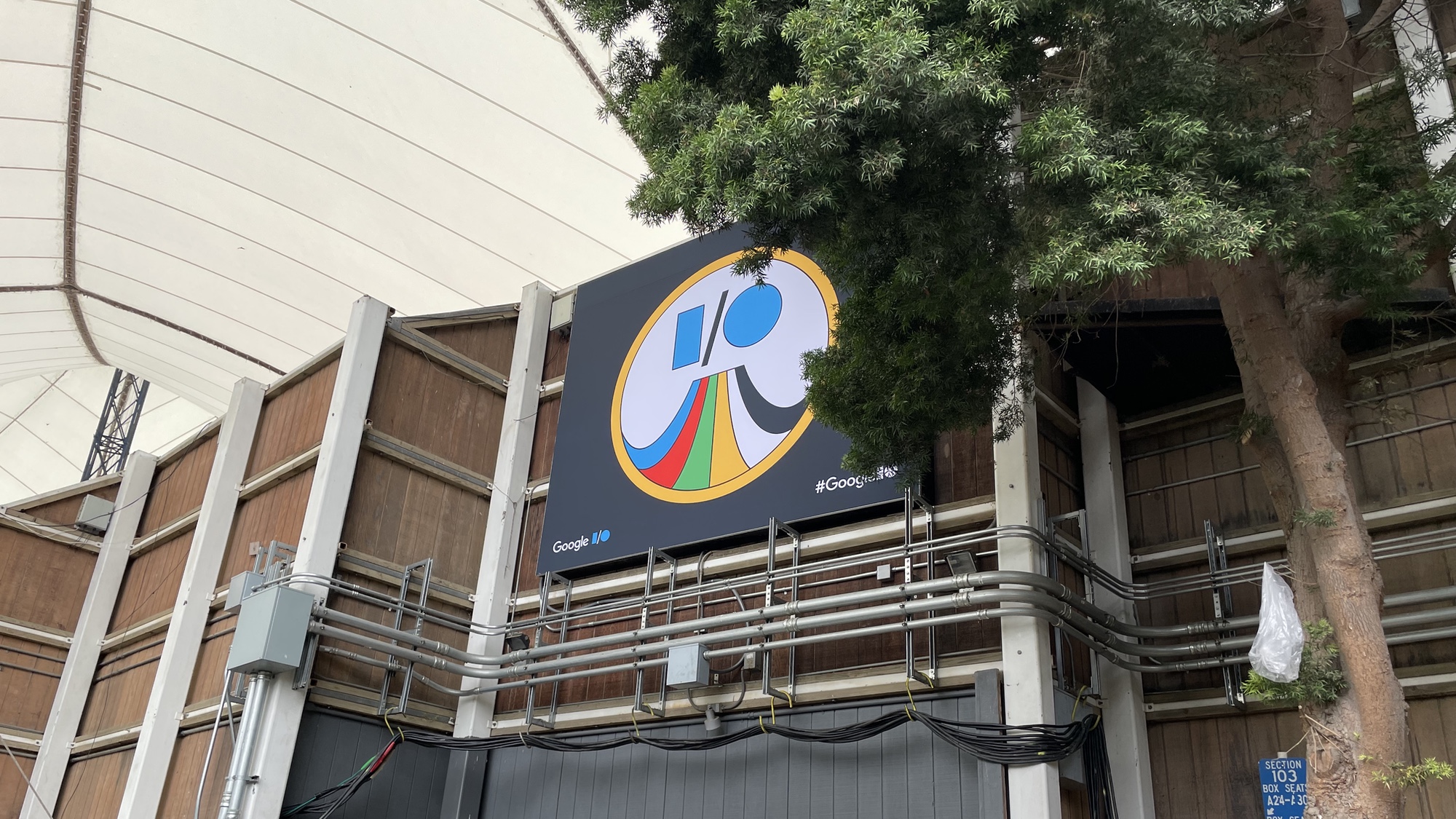
If you want another hint that we're probably going to see hardware at Google I/O, here's a possible clue I spotted upon arriving at the Shoreline Amphitheatre. At past I/Os here, Google has roped off a section outside the main stage as a press area where we can file our reports from the event. That areas back this year — but it was roped off prior to the keynote and we were told it won't open up until afterward.
My best guess? That's going to be a demo area for whatever hardware Google announces, which right now we're anticipating to certainly be the Pixel Fold and probably include the Pixel 7a and Pixel Tablet.
Or I'm completely wrong, and that area's closed off because there's just a really good post-keynote lunch spread being assembled.
#GoogleIO is tomorrow! ✌️Catch What's New in ChromeOS with Jeza and the ChromeOS team on May 10 starting at 10AM PT. We'll cover how ChromeOS is growing, the latest innovations, tools, and developer guidance, and more → https://t.co/lUI7hKPTBK pic.twitter.com/AQpXsgdz1UMay 10, 2023
We're obviously focused on the new hardware and the likely Bard announcements, plus whatever Android 14 news comes our way. But apparently we'll be getting some ChromeOS updates during this keynote, too, if the tweet from Google for Developers is anything to go by.
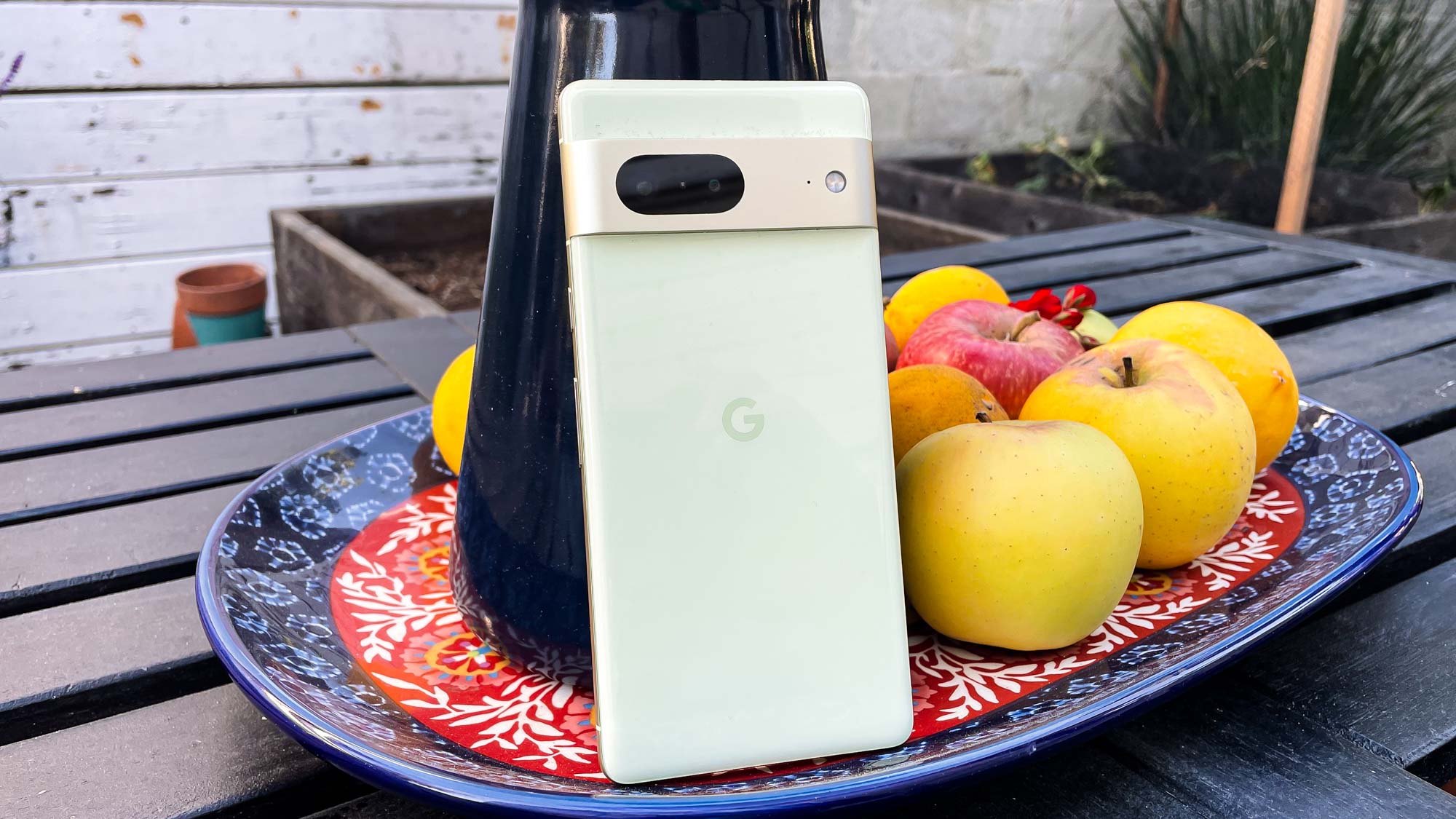
Top Pixel 7a rumors include a 90Hz display, wireless charging, a Tensor G2 chipset and a much improved camera setup. "Doesn't that sound a lot like the Pixel 7?" you may be wondering. And you are correct — based on the Pixel 7a rumors, the new phone could be very similar to the Pixel 7 Google released last fall.
Find out just how similar in our Google Pixel 7a vs. Pixel 7 comparison based on what we know headed into the keynote.
AI generated video at #GoogleIO. Of course. pic.twitter.com/CZGzwkfJ56May 10, 2023
Just so you can feel like you're here in Mountain View, here's the Google I/O preshow featuring AI-generated video and Bard-suggested visualizations.
t-25 min, see you soon! #googleio pic.twitter.com/RSxdUm4srvMay 10, 2023
Google's CEO checks in ahead of the start of Google I/O keynote. Also, I told you that amphitheatre would fill in prior to the keynote.
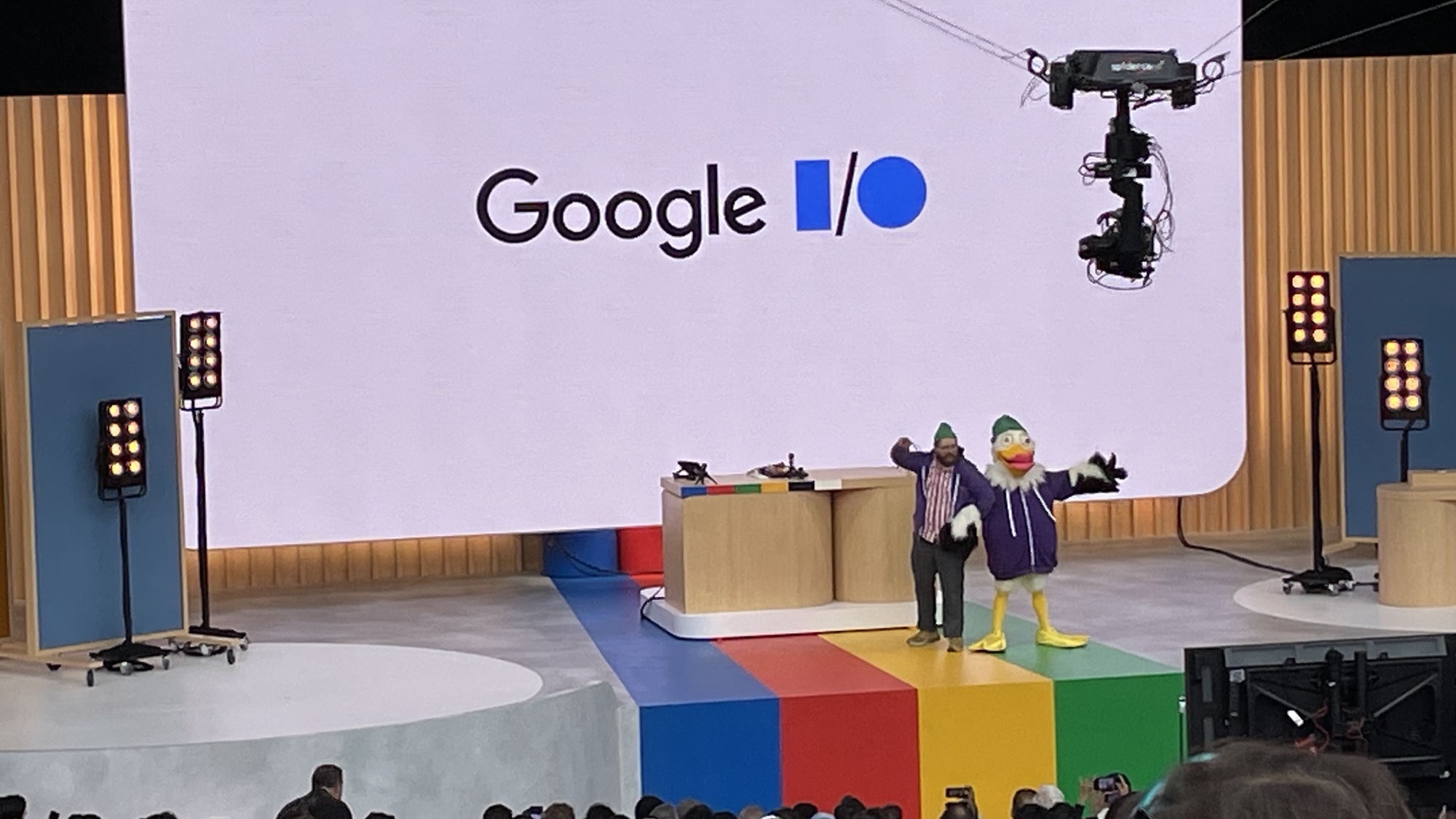
Yes, that's a duck with lips dancing on stage prior to the Google I/O keynote. Yes, it makes sense in context. Just go with it.
@tomsguide ♬ original sound - Tom’s Guide
More pre-show shenanigans, posted by Kate Kozuch, who's sitting right behind me.
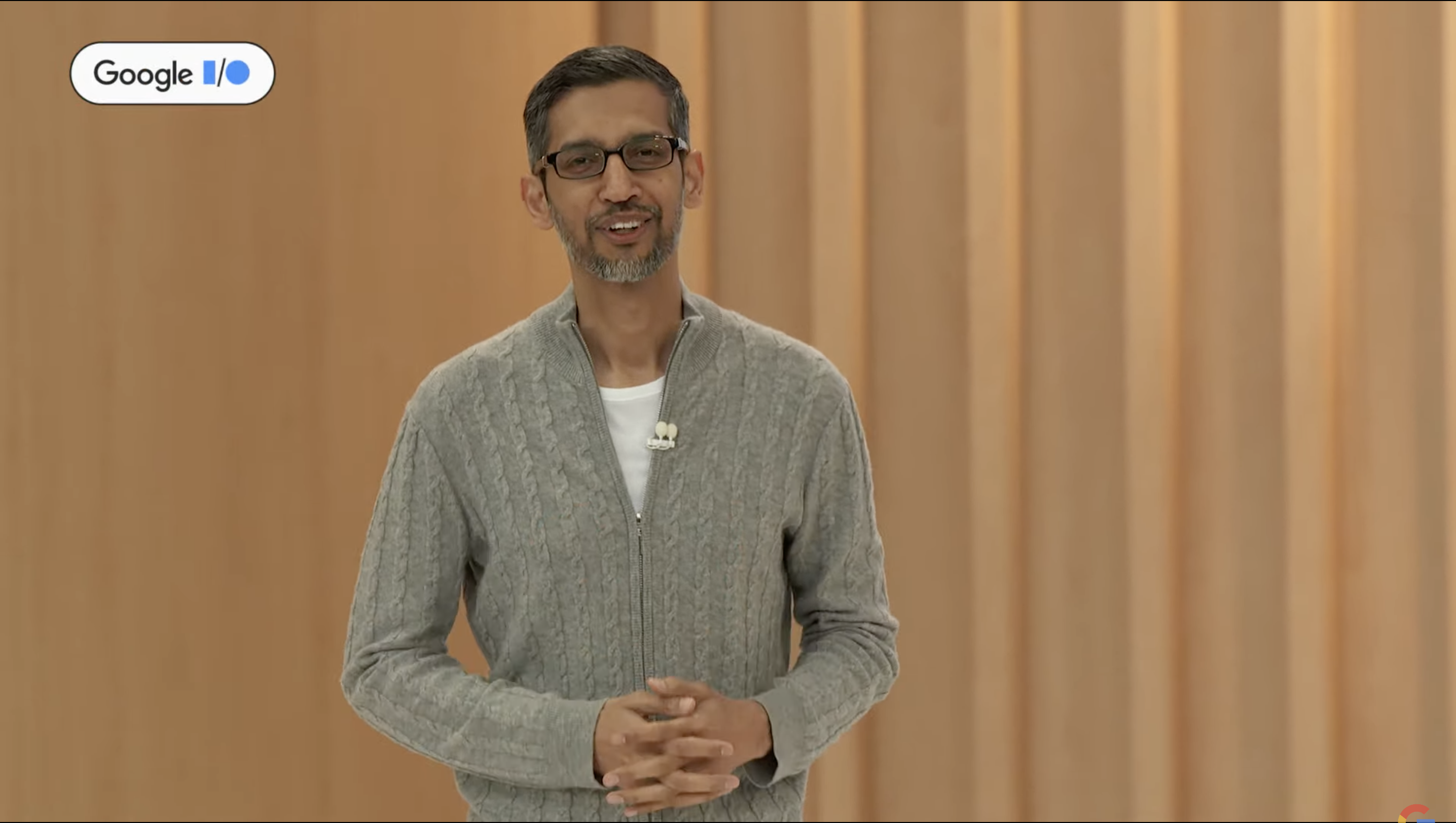
And we're underway, with a video preroll where Google says that it's goal is to make AI helpful for everyone.
"AI is having a very busy year," Sundai Pichai says. "So let's get started."
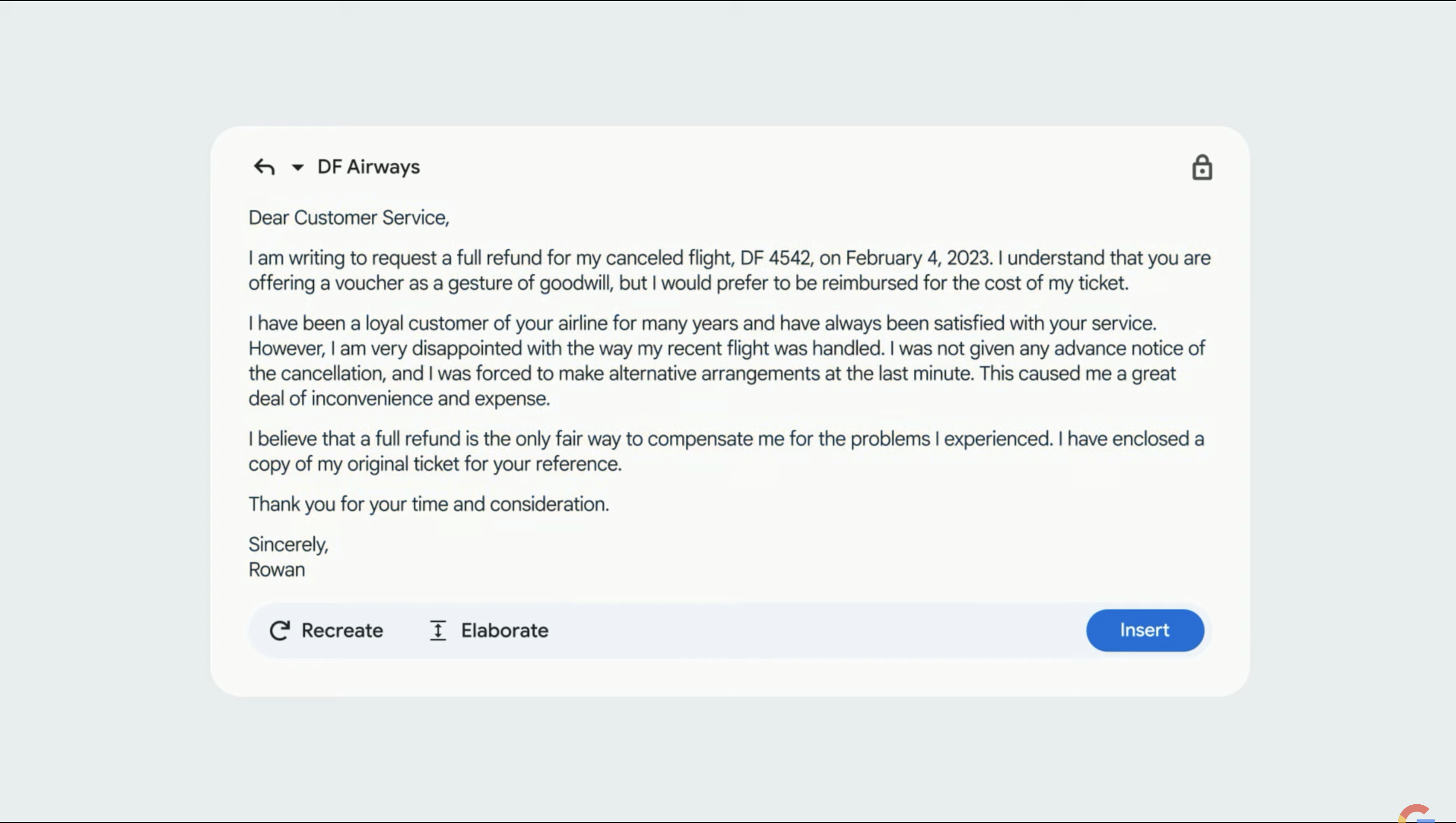
We start with Gmail, and a recap of features like Smart Reply and Smart Compose, which both use AI to auto-generate emails.
The next step is Help Me Write. An example is you get an email after a cancelled flight offering you a voucher. You can use Help Me Write to compose a letter that asks for a refund instead, pulling in flight information and other data.
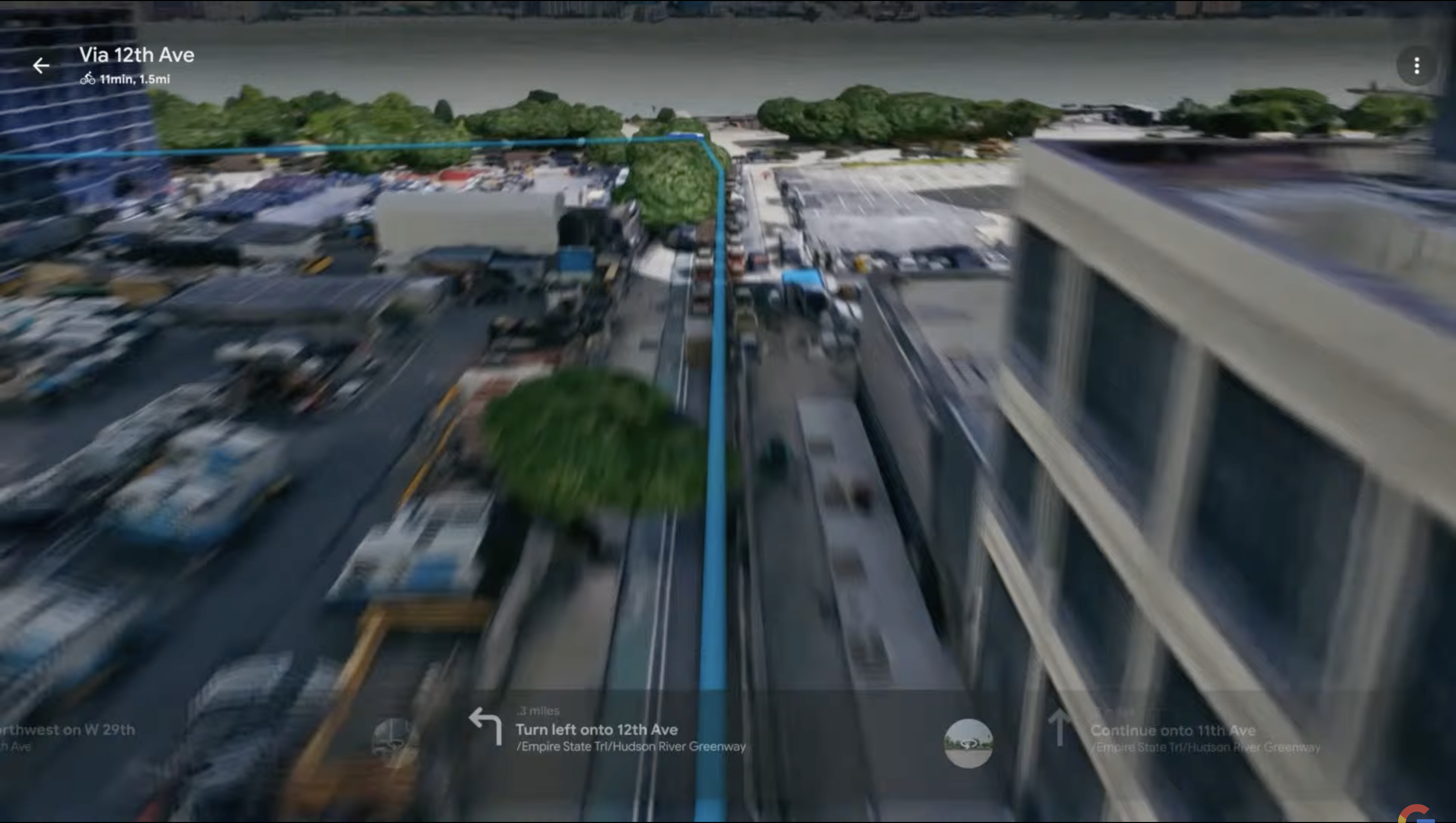
Maps is next up. Google is adding Immersive View for routes that shows you your entire planned trip in advance. Once you select a route, Immersive View shows you a birds eye view of the route. (Pichai is showing a bike ride, but presumably this works for driving and walking, too.) You can also see how whether is going to change over time.
It's launching in 15 cities by the end of the year, with a rollout beginning over the summer.
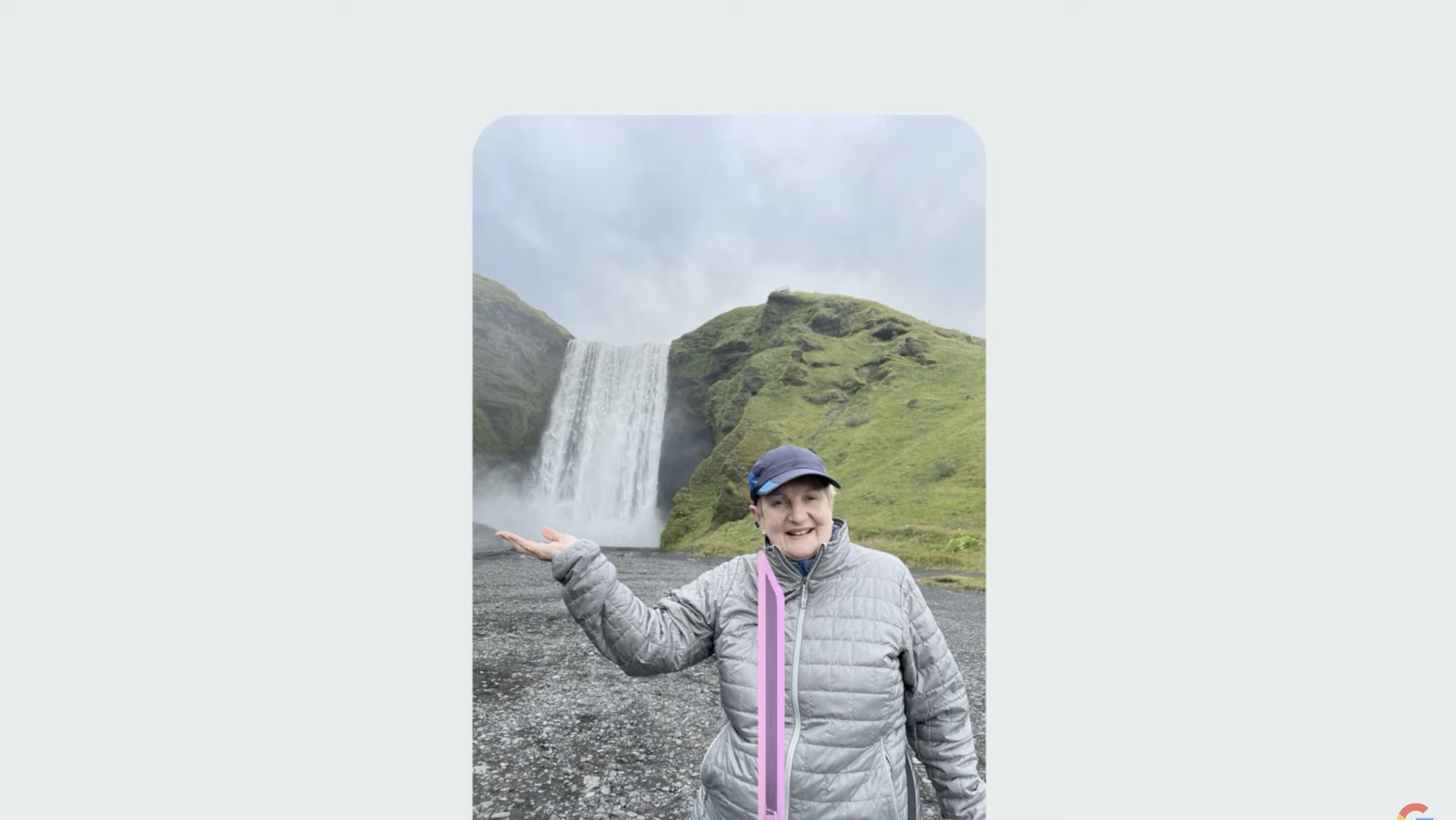
And now Google Photos and AI. You've already seen examples of this with Magic Eraser. A new version called Magic Editor is coming later this year.
Not only can you use AI to erase unwanted objects, but you can also edit and adjust photos more easily, changing the lighting and even the perspective of the shot.
For the record, it took 9 minutes of the keynote to make me uncomfortable with what Google's proposing with AI.
Anyhow, Magic Editor is coming to Photos later this year.
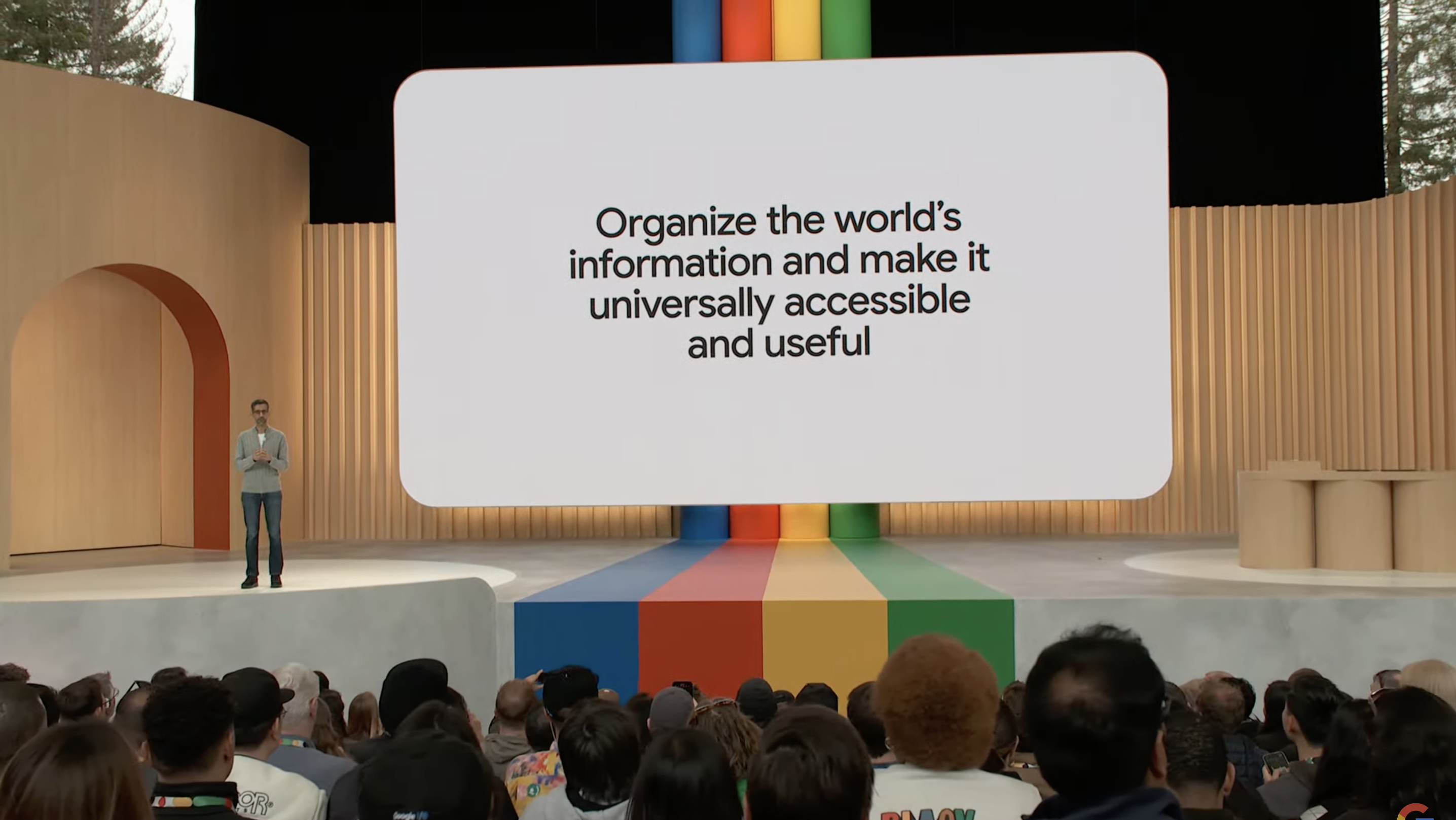
"Making AI helpful for everyone is the most important way we can advance our mission," Pichai says. This will happen in four ways
• improve knowledge and learning
• boost creativity
• do it responsibly
• make sure it's equal for all.
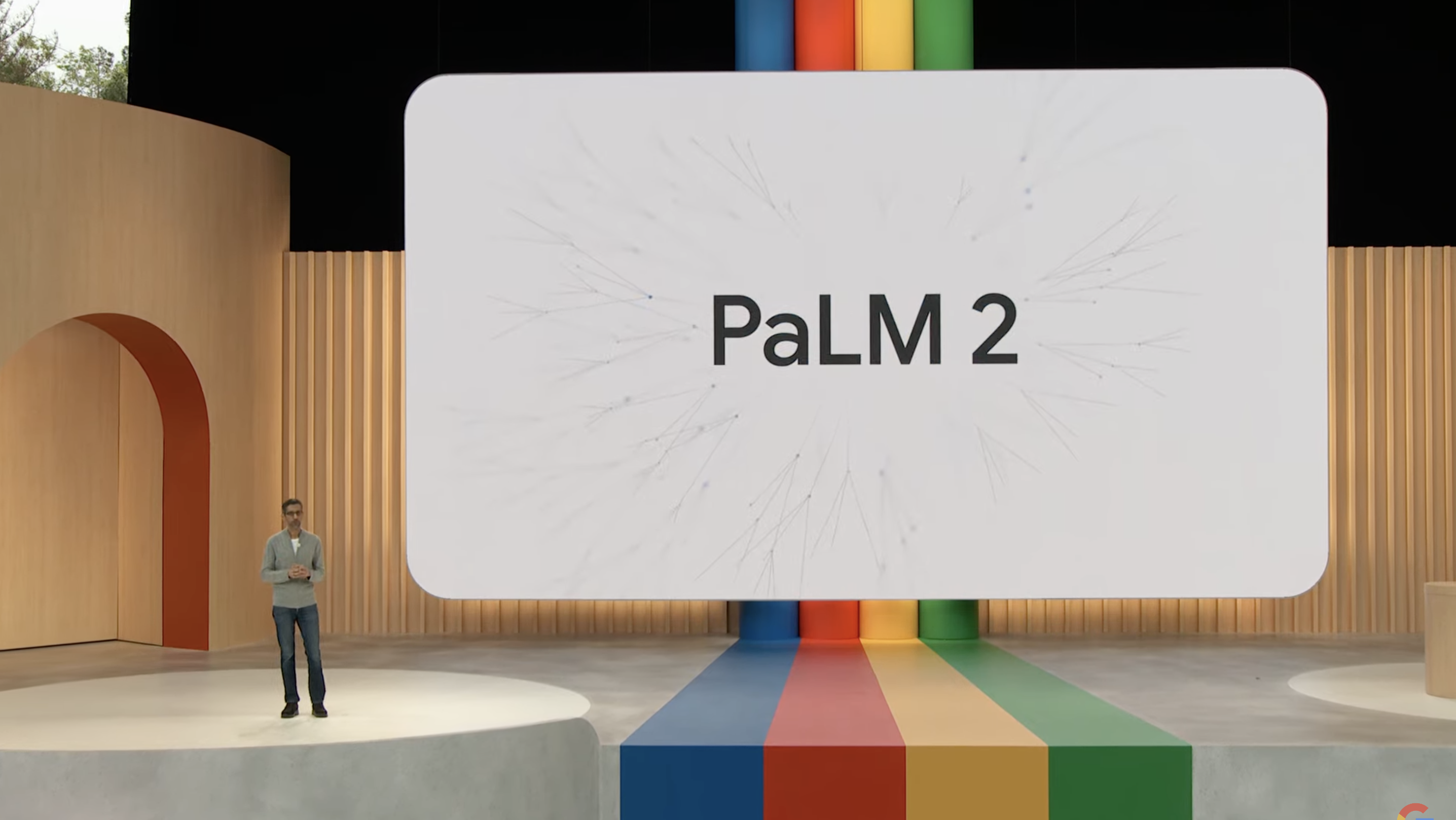
As expected, Google is introducing PaLM 2, its new language module platform. There are four models, the first of which is Gecko, which can work on devices that are offline. The example Pichai is using involves debugging and coding.
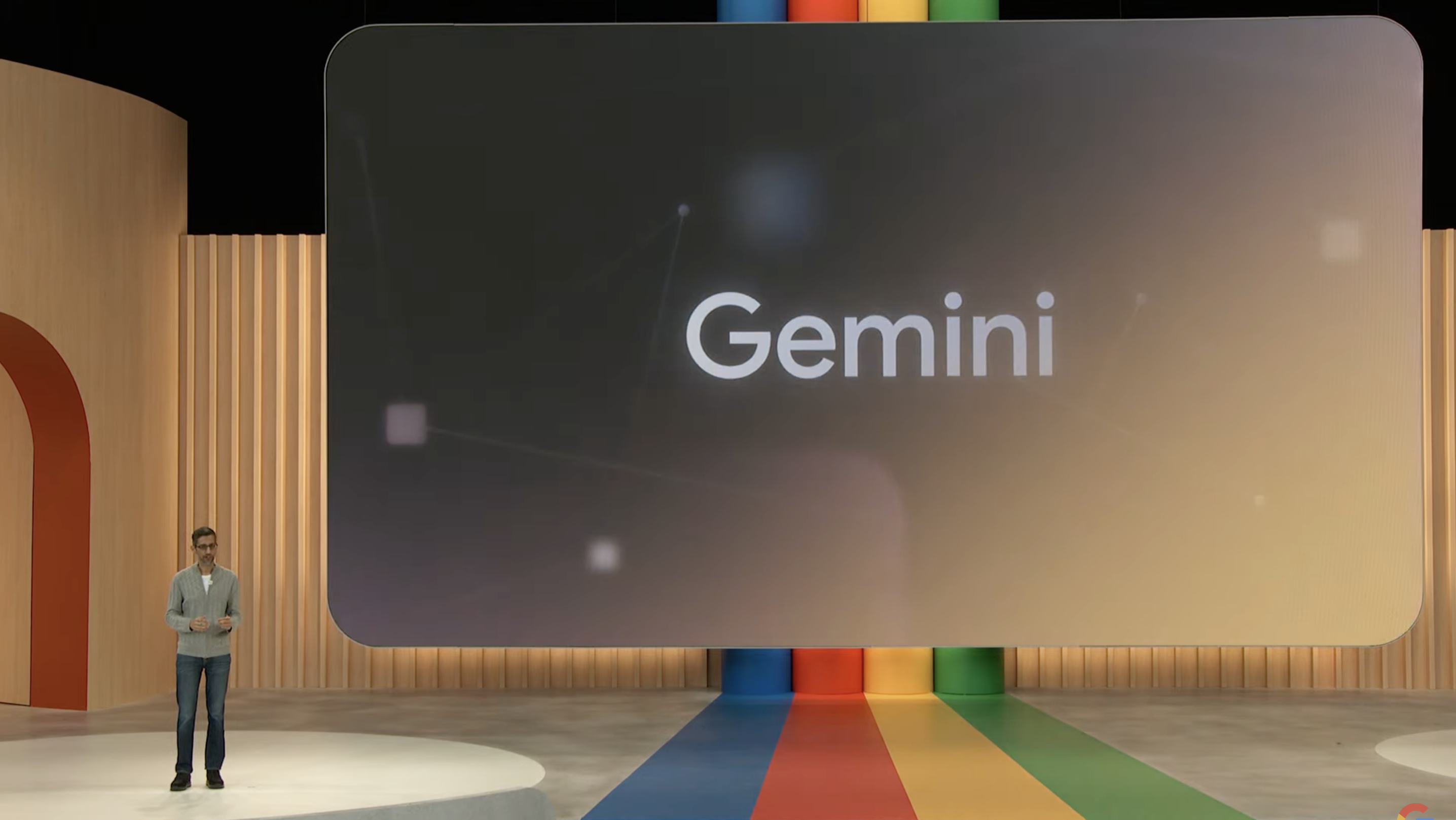
Now we're talking about Gemini, which is a multi-modal tool that's not yet available.
Google is detailing ways to do AI responsibly, which includes watermarking synthetically-generated images. Metadata can also provide more information, and Google's going to ensure all its synthetic images have clear metadata.
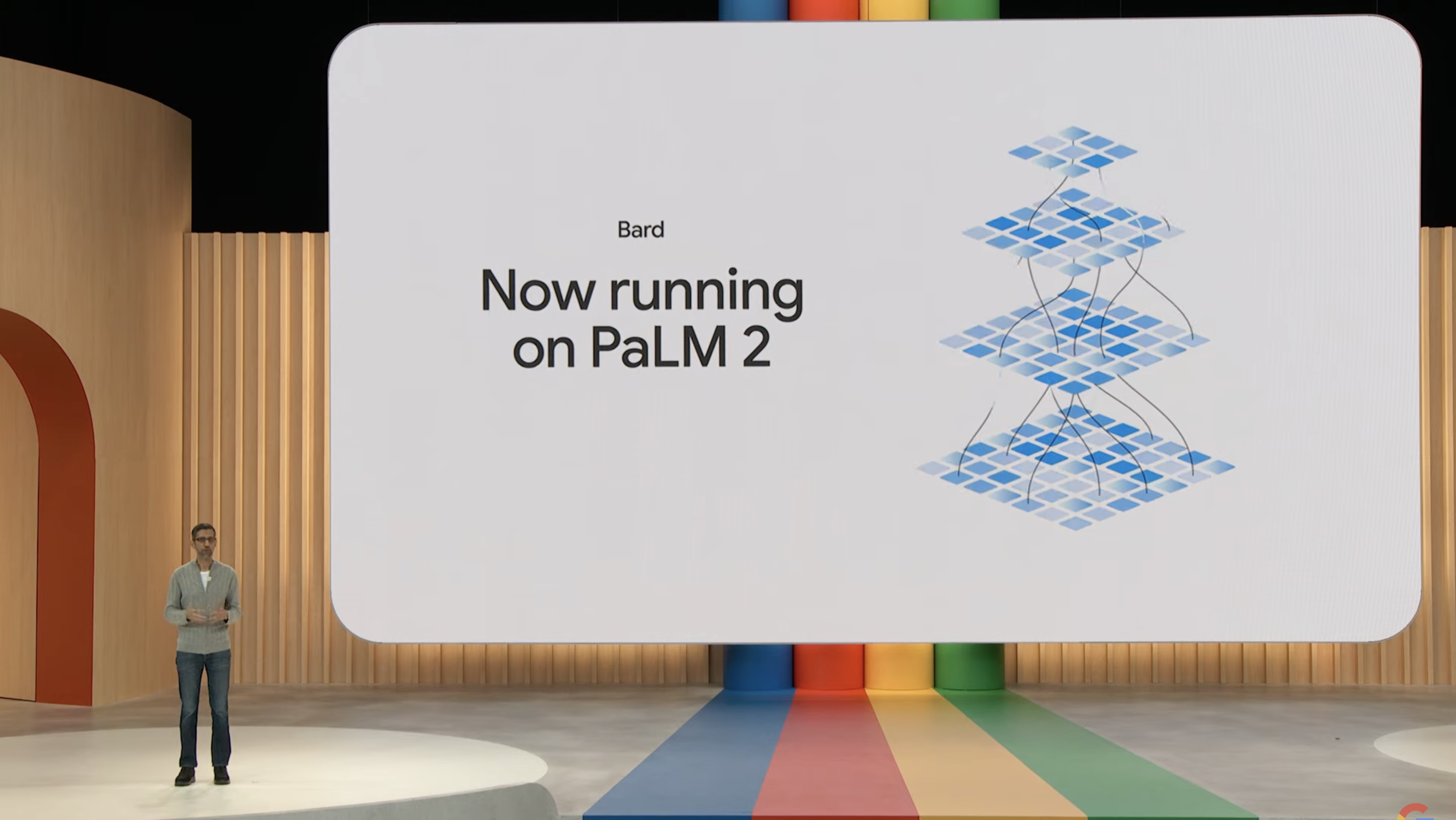
Bard is now running on PaLM 2, which means its math, logic and reasoning skills have leapt forward.It can participate in code generation and debugging, and it's learned 20-plus programming languages. In fact, coding has become one of the most popular things people have been using Bard for.
@tomsguide ♬ original sound - Tom’s Guide
Here's a closer look at Maps and Immersive View for your routes.
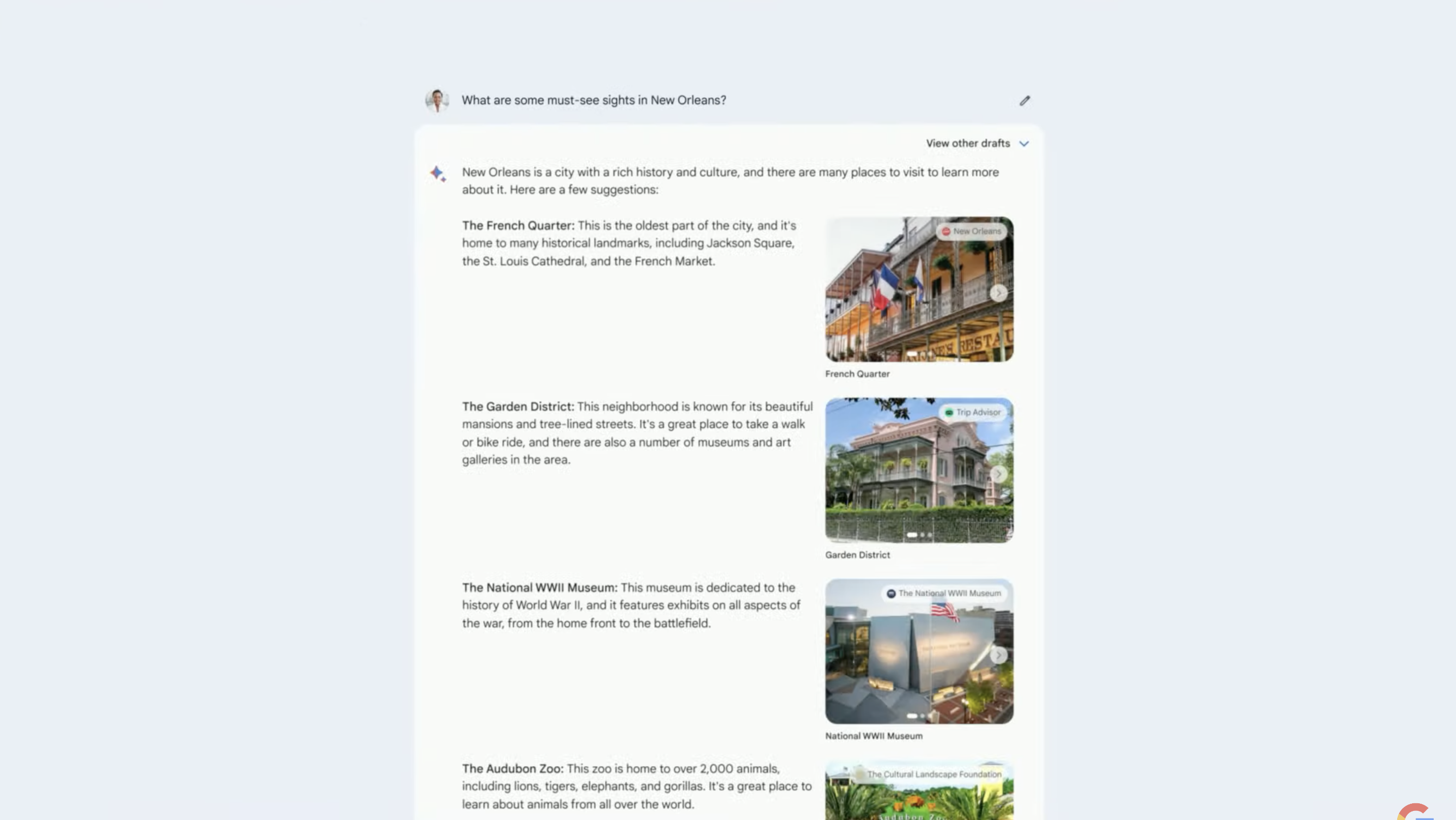
Back to Bard: Tools are coming to Bard that will let you tap into extensions. This will start with Google apps. In the next few weeks, Bard is becoming more visual both in responses and prompts.
Ask for the must-see sights in New Orleans, for example, and you'll get images of those sights along with text.
Google Lens' capabilities are coming to Bard in the coming months. Upload a picture of your dogs, and Bard can generate funny captions. I don't think the WGA writers on strike have anything to worry about based on the examples that flashed on the screen.
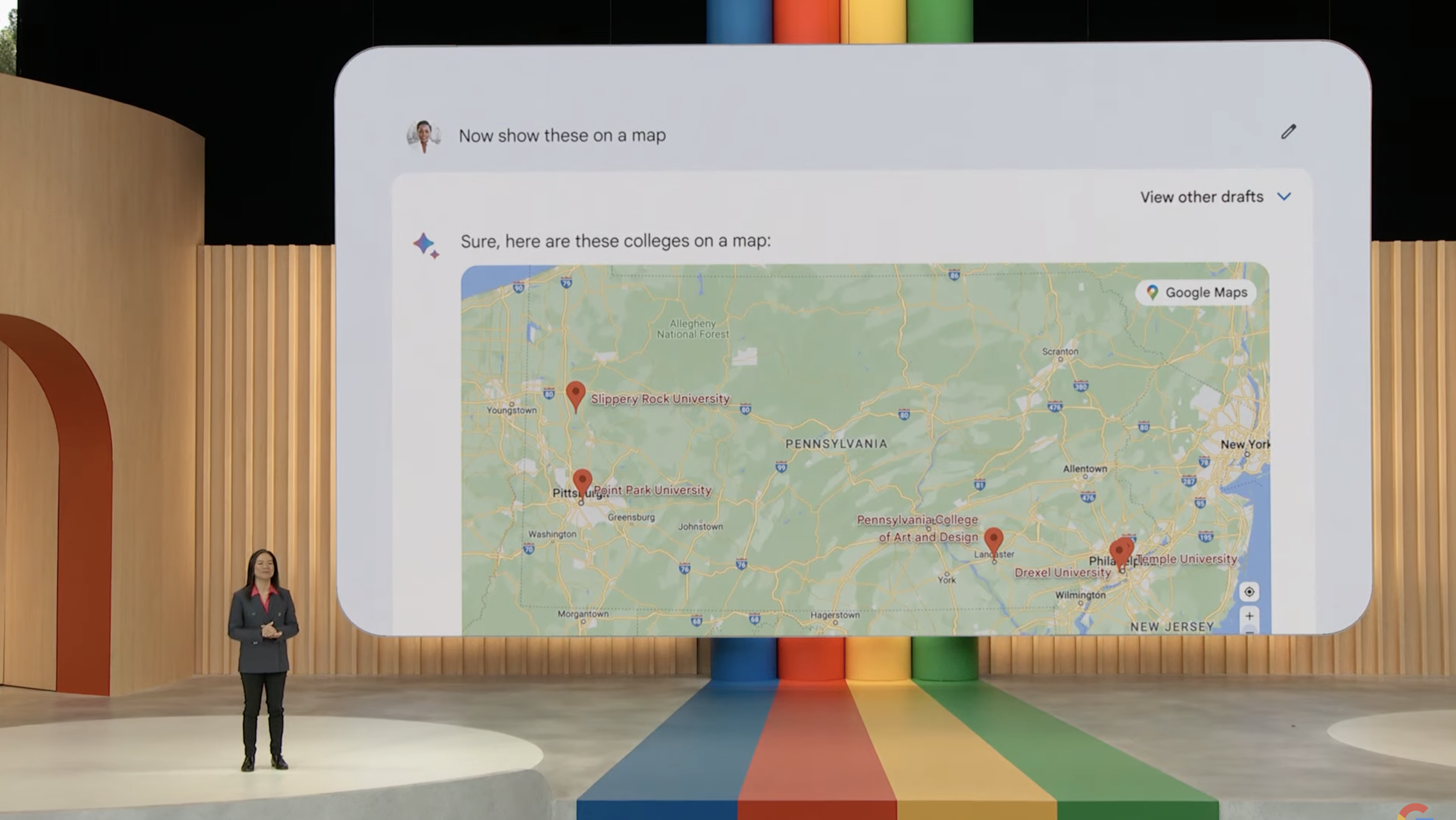
Pretty cool example of using Bard to do research on colleges that can show the findings on Google Maps and then import that information into Google Sheets so that everyone can review your findings.
Third-party integration with Bard is coming, too.
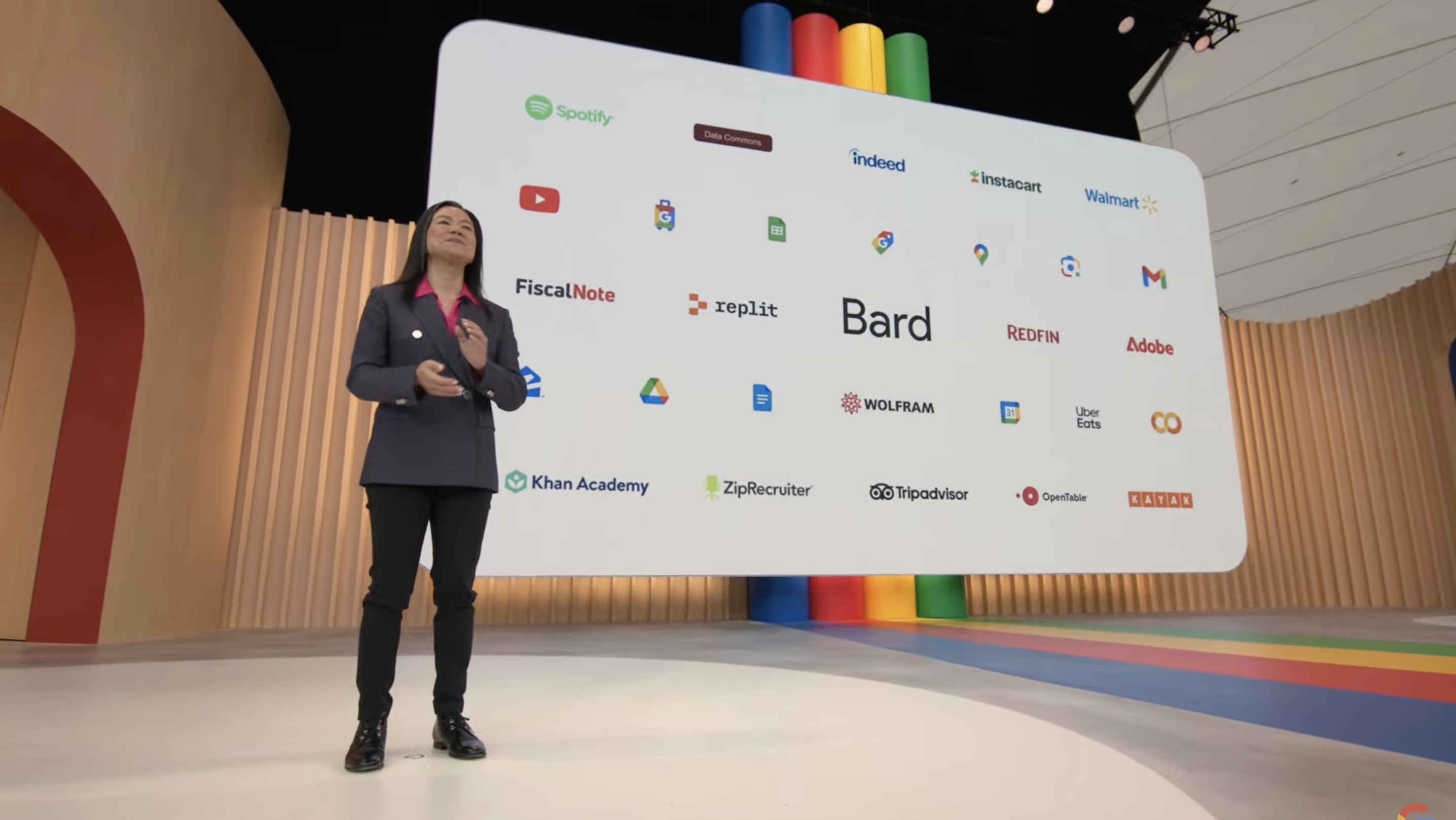
Bard is now open to 180 countries and territories. No more wait list. And Japanese and Korean language support is coming, too.
In fact, Google says it's on track to support 40 languages soon.
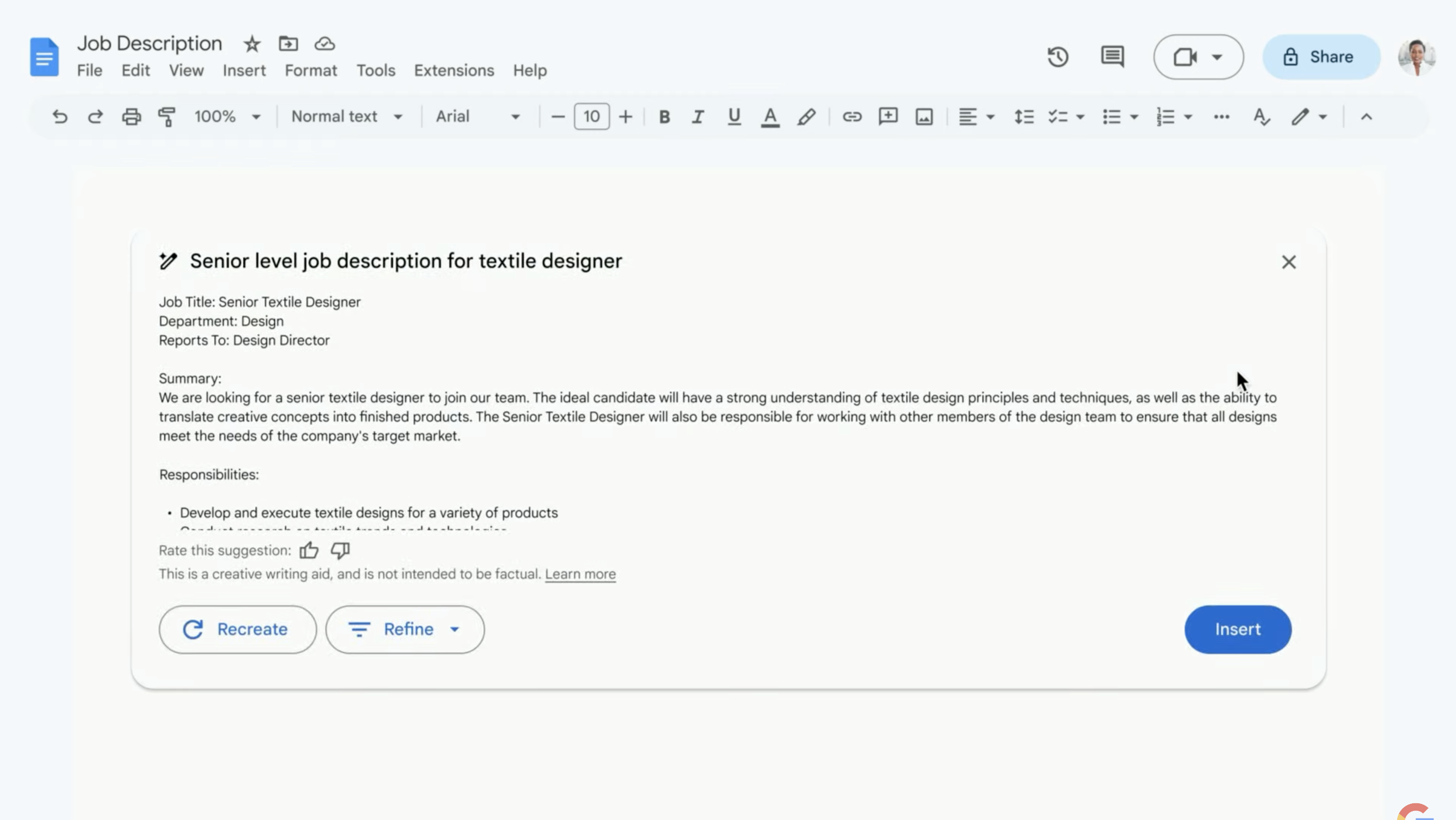
Time to talk about Google Workspaces and the ways AI is improving those products. Help Me Write is already a part of Docs and Gmail, and people have been using it in creative ways, Google says. The example we're seeing involves generating a job description using Help Me Write that you can then post on a job site.
The AI extends to Sheets, too, where AI generates a table for a dog-walking business that can schedule appointments, complete with client information.
Trusted tested are going to be able to try these AI-powered features across the Workspace apps in a few months.
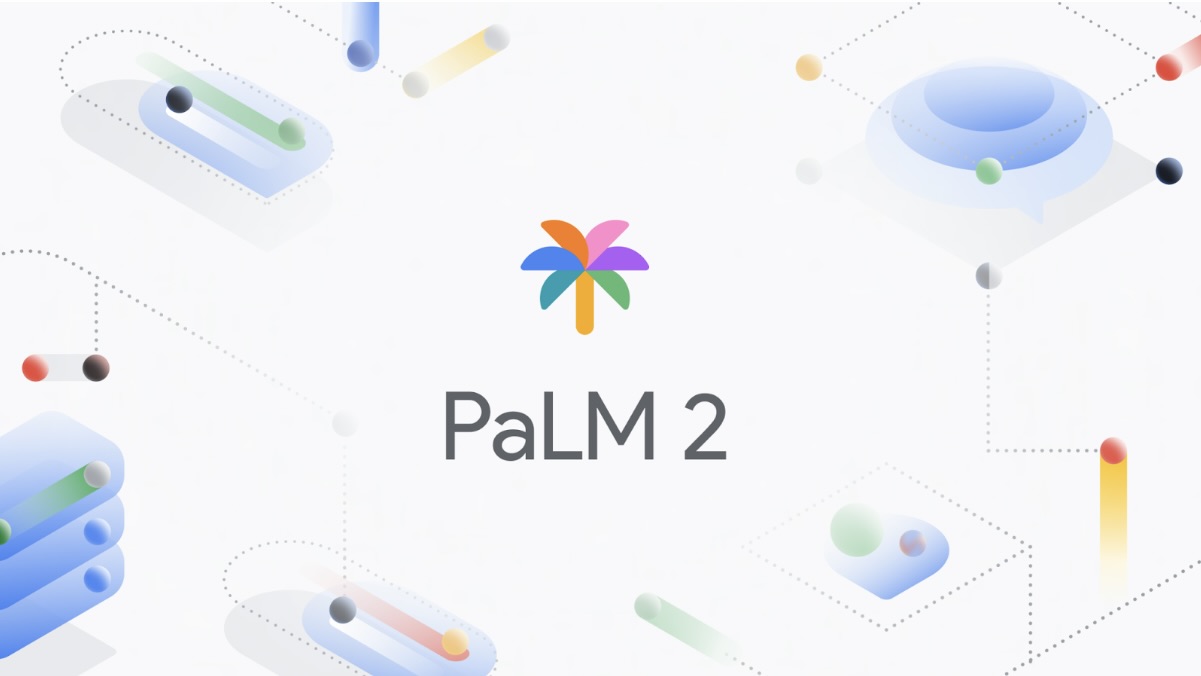
Intrigued by PaLM 2 and want to find out more? Here's our PaLM 2 explainer.
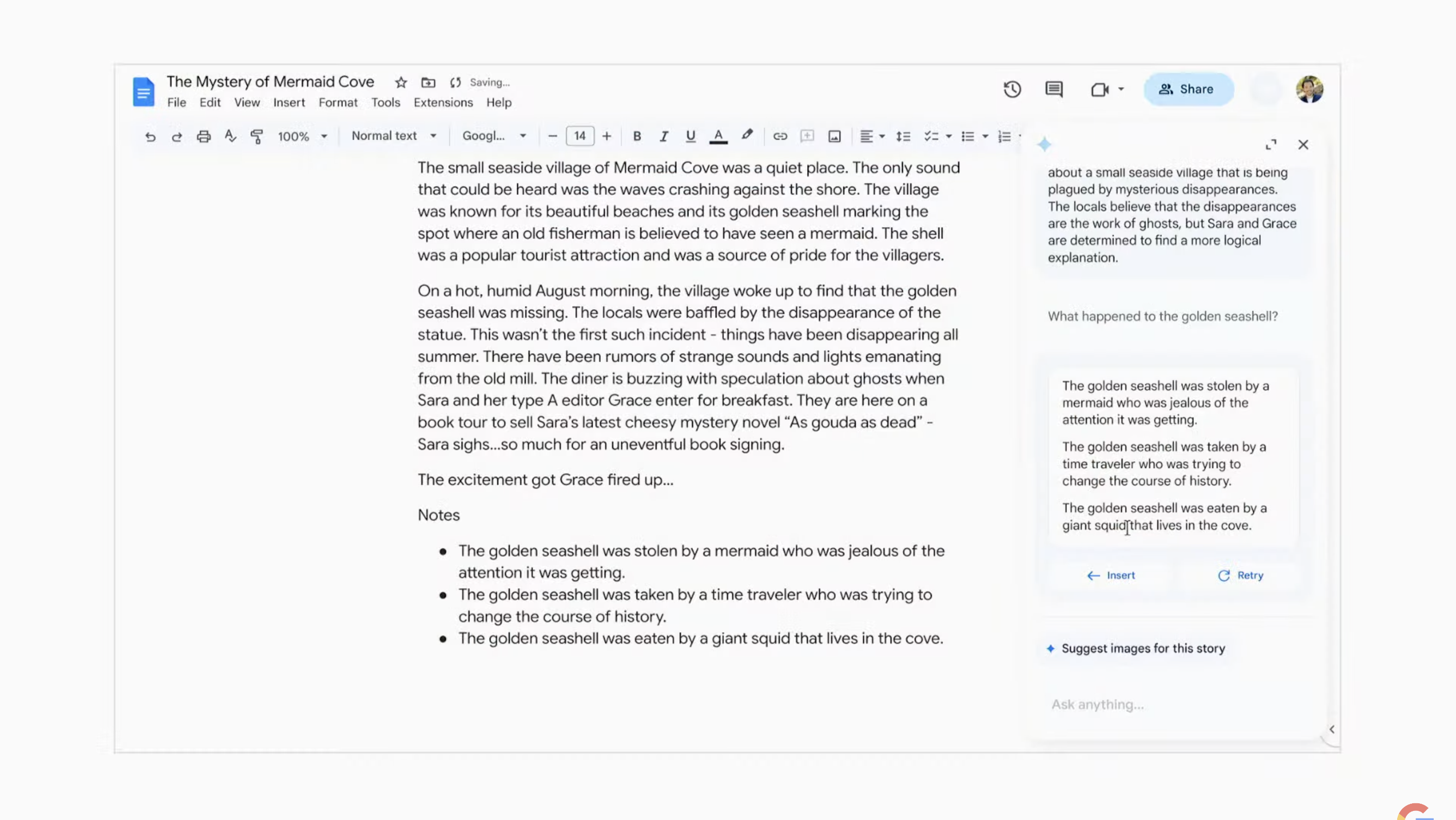
There's a tool called Duet AI, which features a Sidekick for Workspaces where you can use AI prompts to write notes or create presentations. Say you forget to prepare speaker notes for a presentation. You can use the Sidekick prompt to auto-generate speaker notes for each slide. You can insert and edit to convey what you intended. So it's a feature that's clearly intended as a collaborator and time-saver.
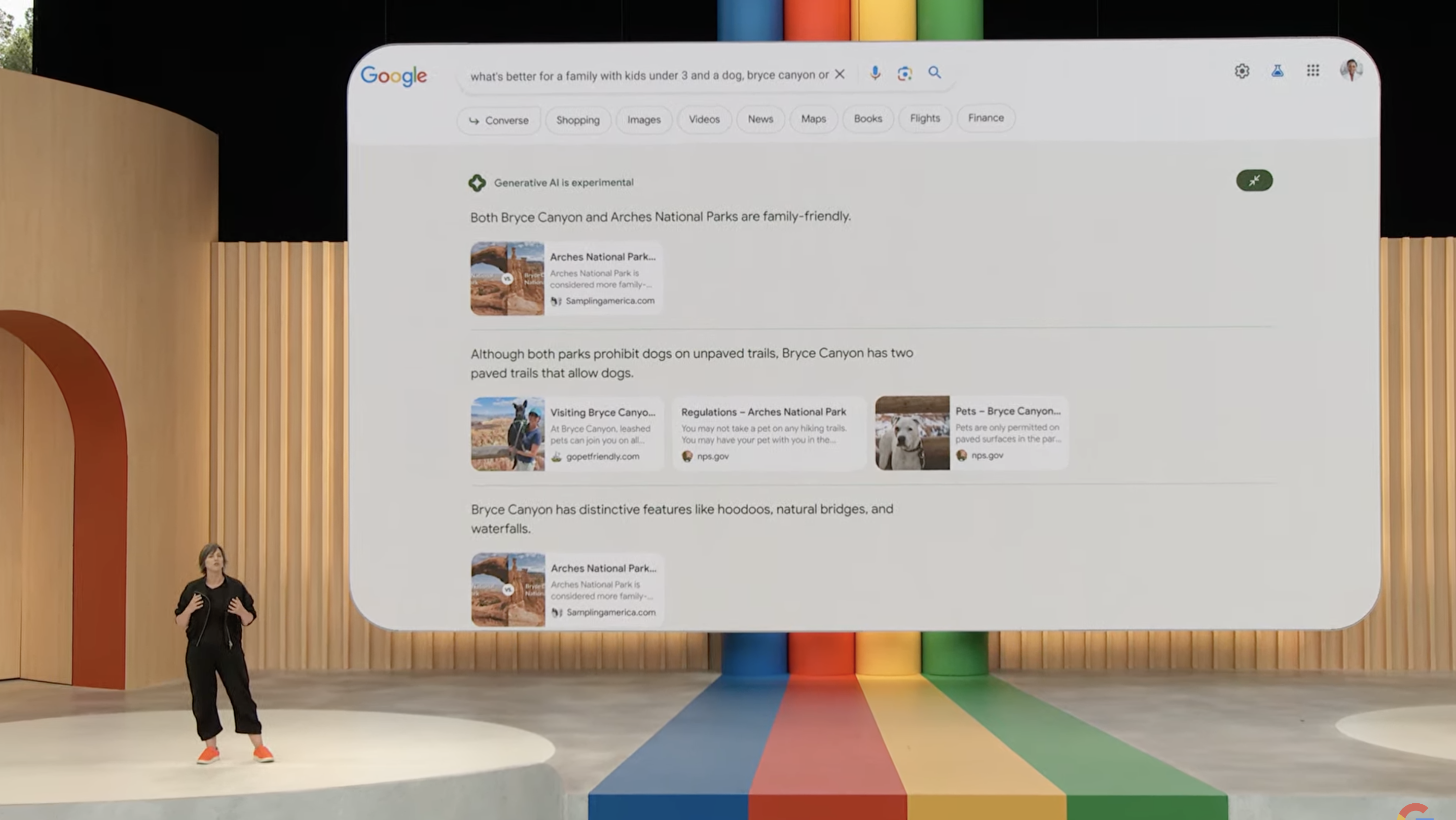
We're moving on to search and the potential of adding generative AI to Google's search offerings. Google is showing off an integrated search page, highlighted by an AI-generated snapshot that summarizes findings. Links are included in the snapshot to drill down. And there are links further down the page that highlight portions of the AI-generated search results.
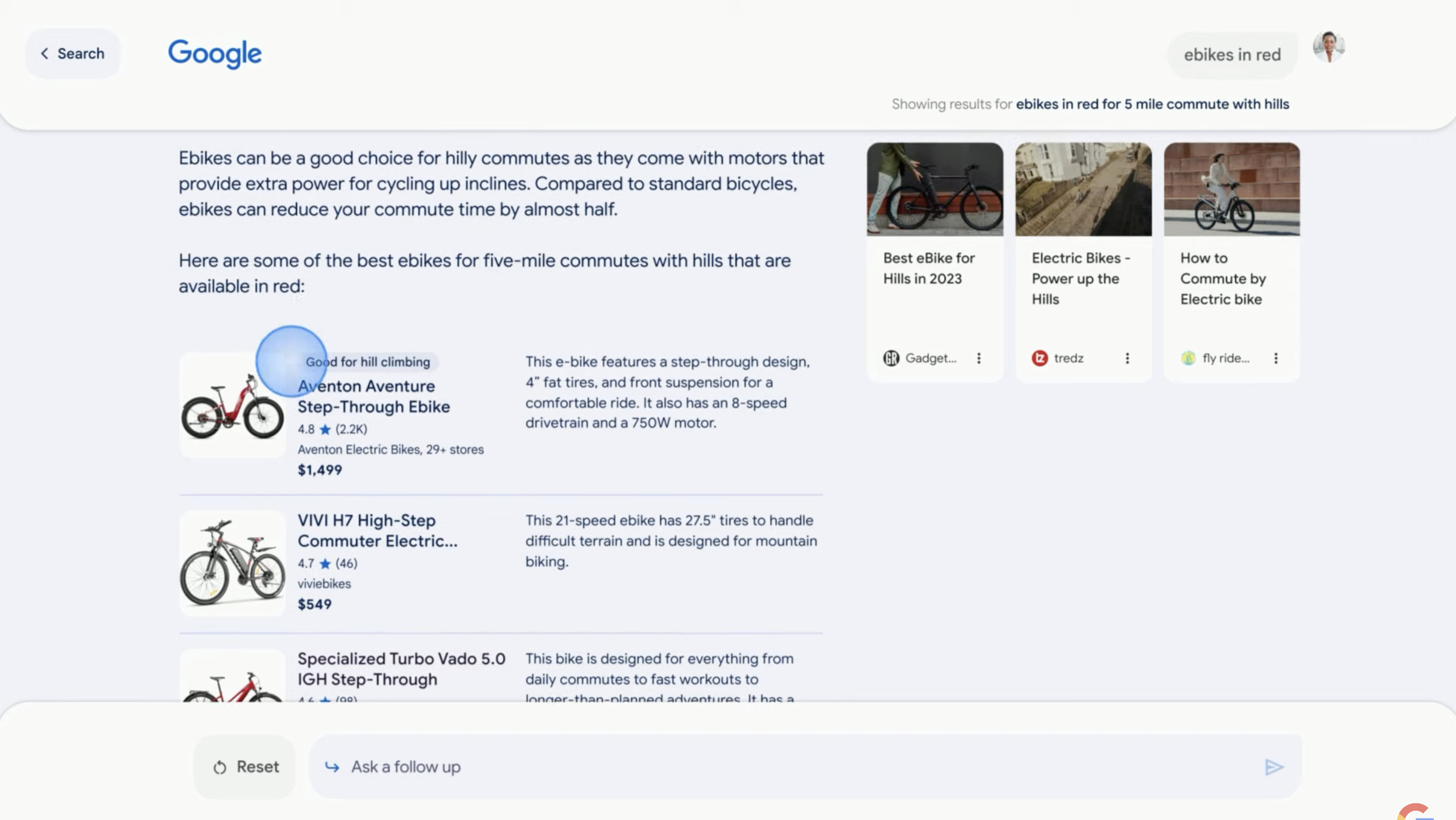
Google says generative AI will makes searches "smarter and simpler."
Here's an example: a search for a good bike with a five-mile radius that's good on hills. The ensuing results pull from Google's Shopping Graph, producing what Google says are fresh relevant, results. Those appear right below the AI-generated summary.
A conversational mode can let you ask follow-up questions.
Google search AI powered snapshot is a huge risk. I don’t see ads up top (yet) and it also pushes content publishers further down. So you really want to be in that AI block. #GoogleIO pic.twitter.com/T9fKDsUokaMay 10, 2023
From Twitter, my colleague Mark Spoonauer has some thoughts on what we're seeing from Google here.
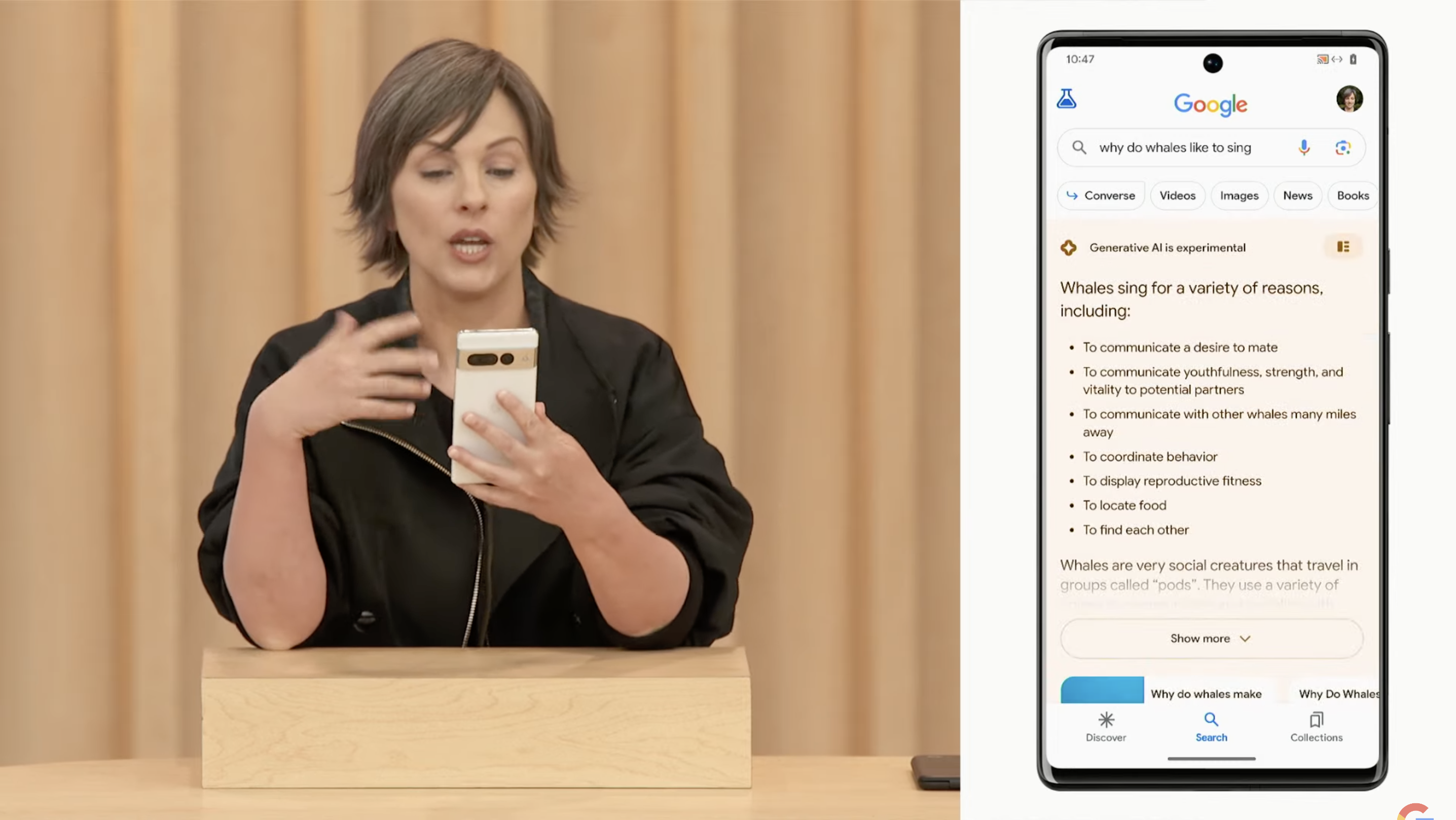
Think of all this as "search super-charged," the Google executive on stage tells us.
Google’s new Help Me Write is coming to Gmail to write full emails for you and get that refund. Click “Elaborate” to sound more pissed off pic.twitter.com/IhBeyHQBH7May 10, 2023
While Google highlights Google Cloud's role in AI — frankly outside of the scope of our coverage — here's a closer look at how Help Me Write can generate complaint letters on your behalf.
This is the new Google Search with generative AI and follow up questions. This literally changes everything… #GoogleIO pic.twitter.com/ufDwF9NRv5May 10, 2023
More talk of some business-focused Google Cloud news gives us the chance to share some more videos of the features Google's already talked about. Here's a look at Google search with generative AI and follow-up questions.
As we begin our second hour of AI Talk, we're now looking at how PaLM 2 can be used by developers. The PaLM API is being integrated into Firebase and Colab.
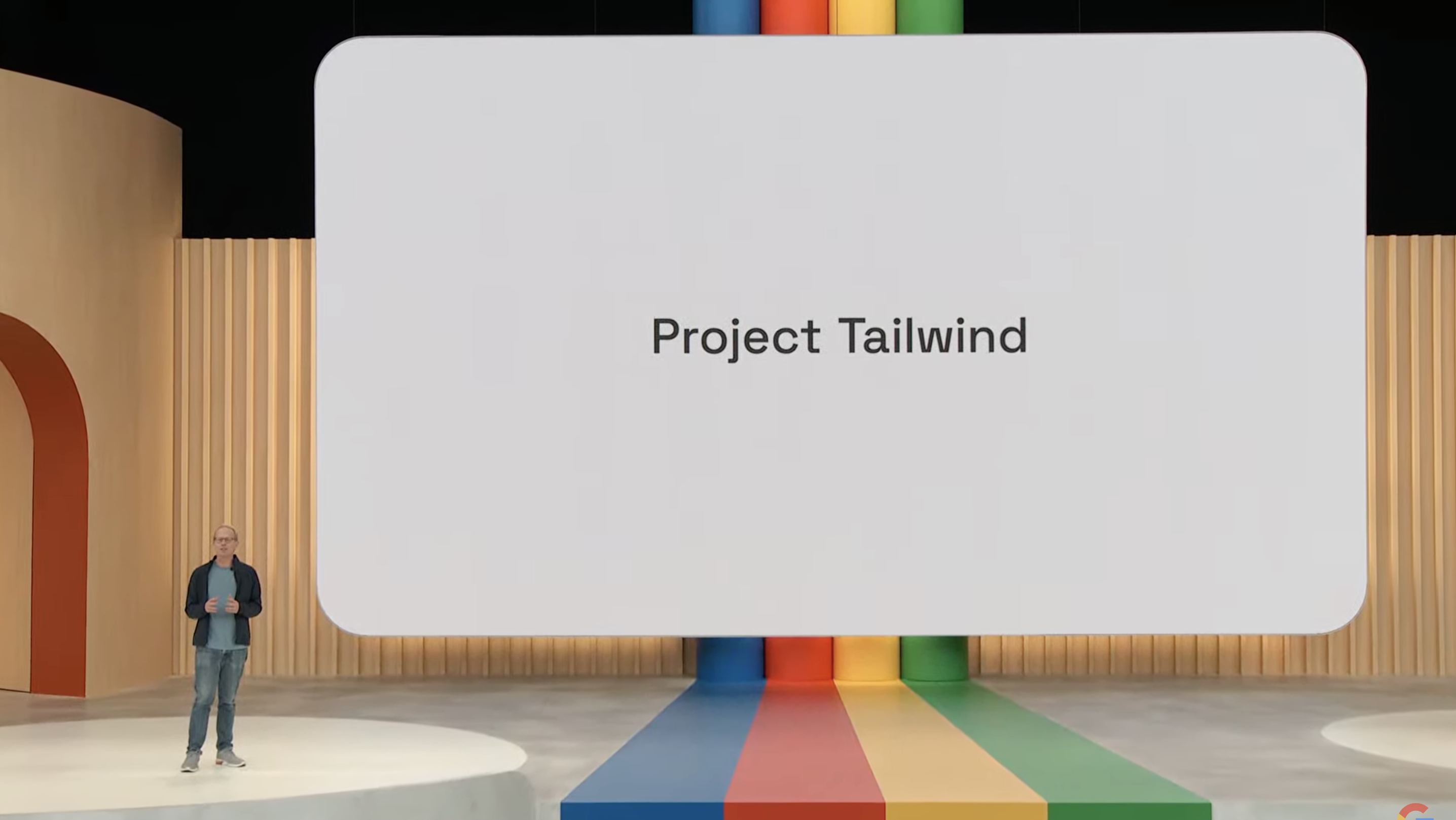
We're getting a live demo of Project Tailwind, an AI-powered work and study prototype. "It's helpful for anyone synthesizing information from different sources that you choose," the Google executive says.
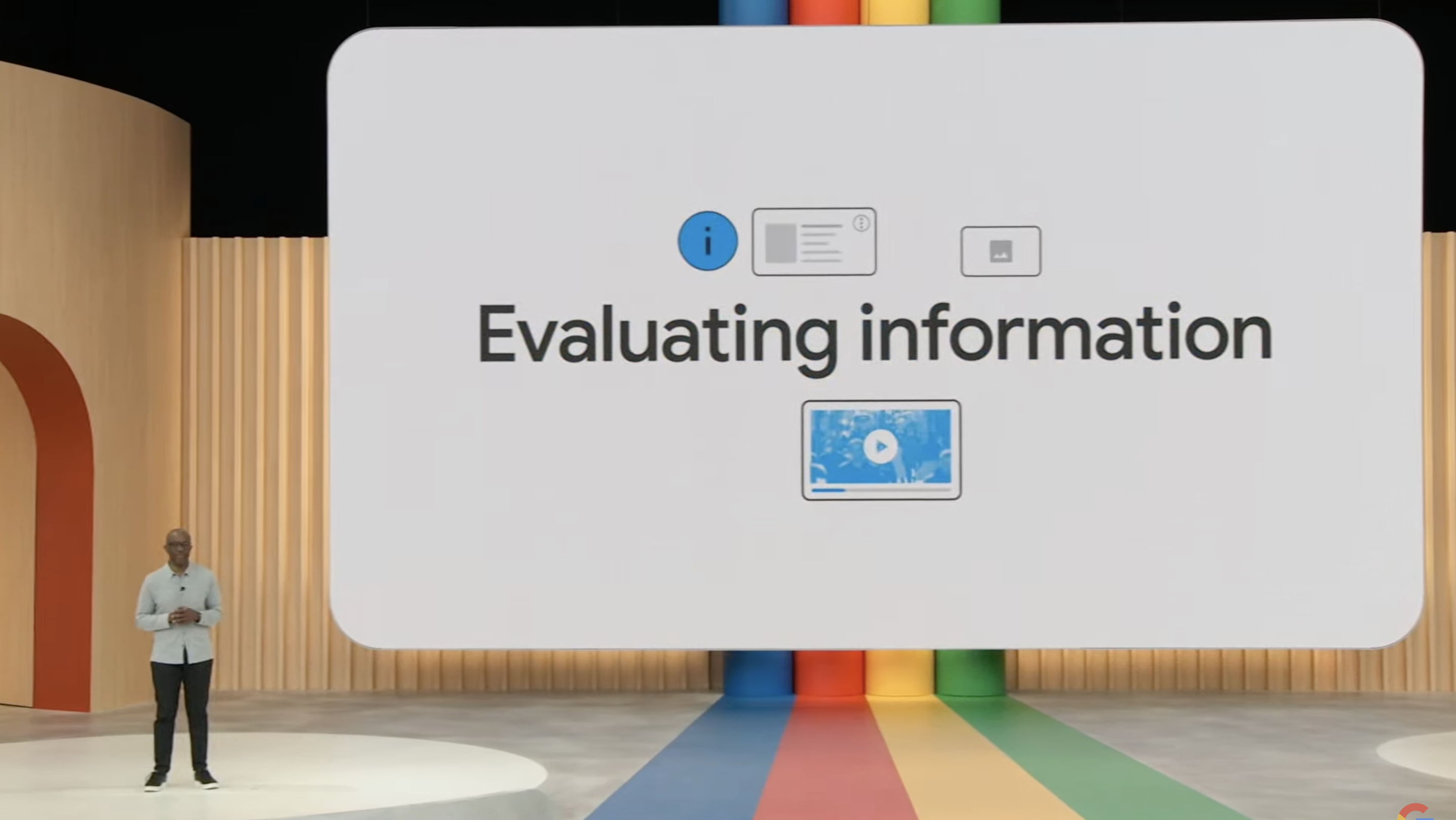
Google is talking social responsibility for AI and among the questions they ask themselves are "Will it be socially beneficial?" and "Could it lead to harm in any way?" Apparently, Google is adding ways to check the veracity of images. The company is also citing the metadata it mentioned earlier.
It's good that Google is looking at ways to minimize the spread of bad information — especially if its tools make that more possible — but we'll have to see just how effective Google's efforts are to make sure AI isn't missused.
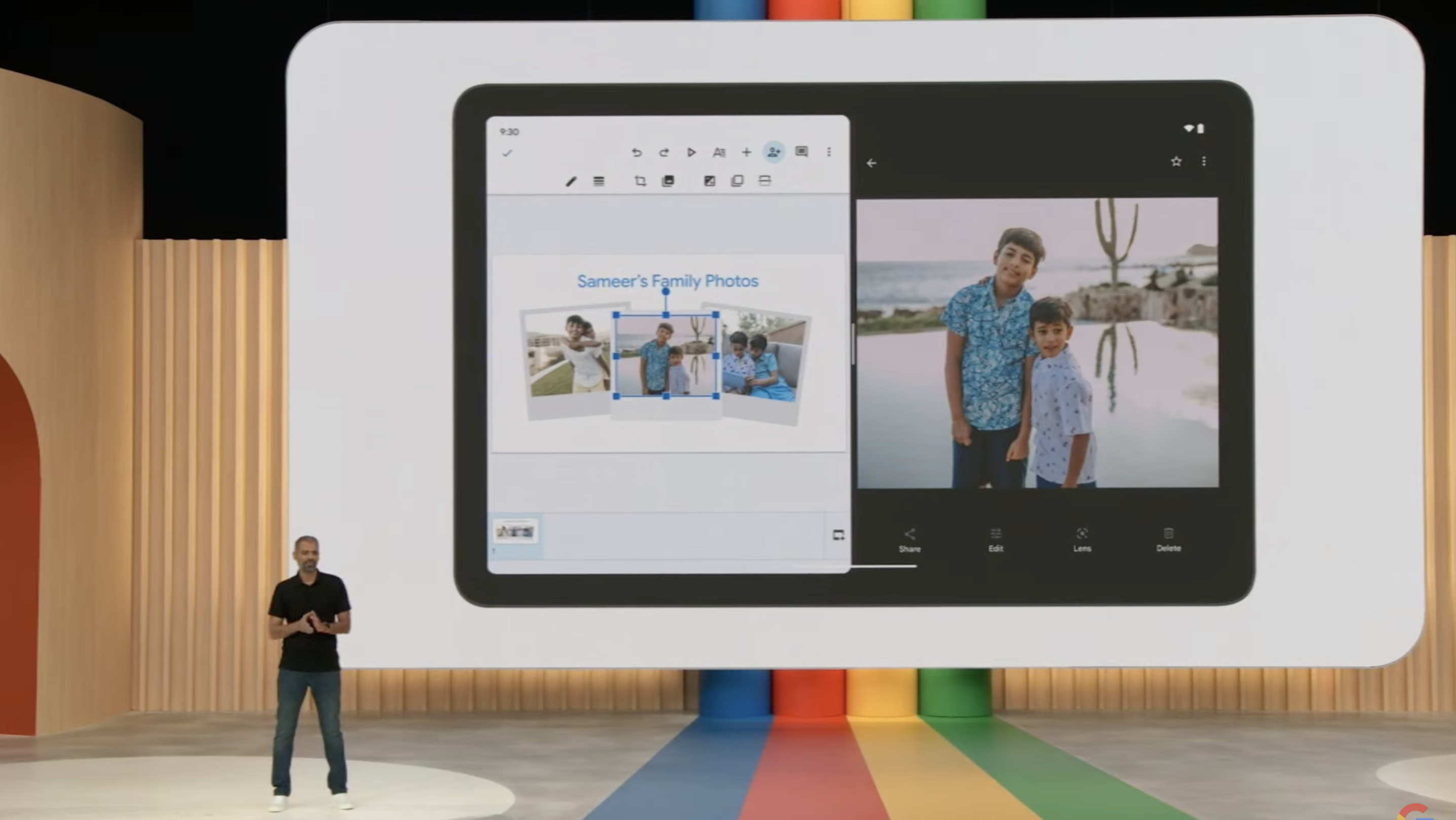
And now we're turning to Android. You can start paying attention again, consumers.
First, though, we are getting a look at AI's role in Android, which includes a recap of how AI is used to protect Android users from spam messages and calls.
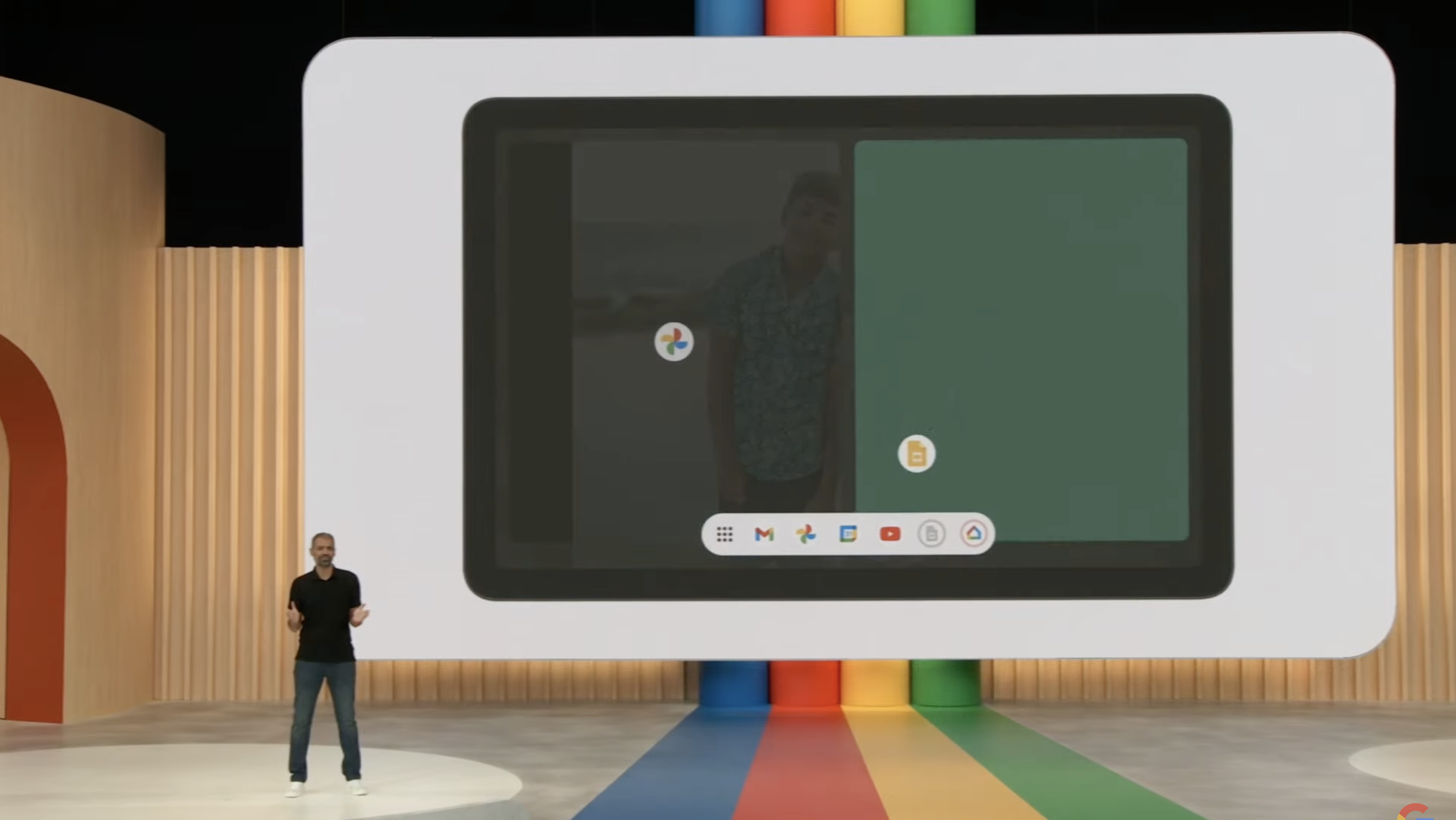
We're going to look at Android's ecosystem of devices, starting with tablets and watches. Tablets, first, as Google talks about how it's optimizing app for larger screen devices. (Included in there was a teaser for the Pixel Tablet — your day is coming, friend.)
As for watches, Wear OS will see a native version of Whatsapp this summer.
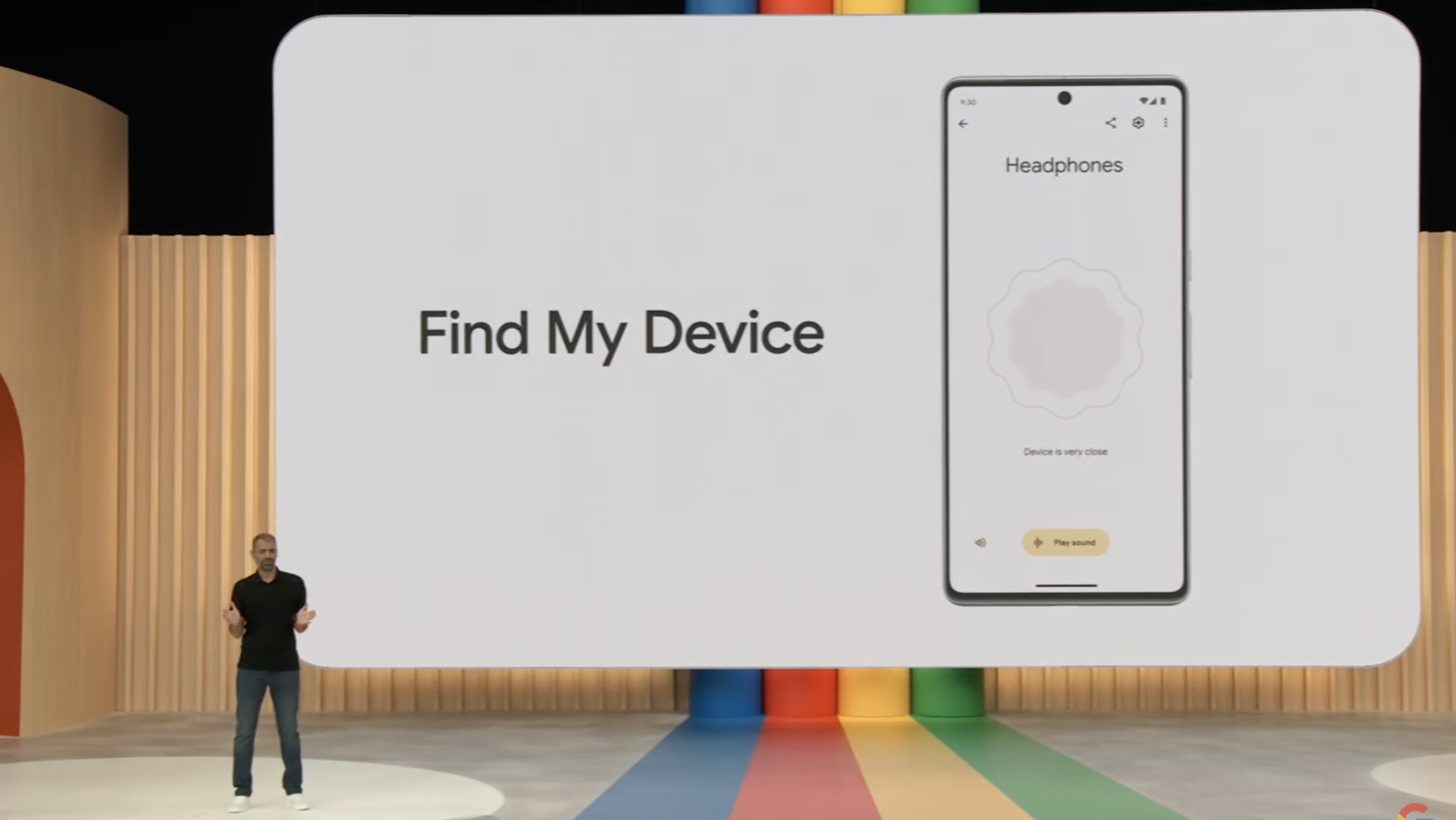
Find My Device is getting a update to support more devices. Leave your earbuds at the gym and other nearby Android devices can help find them via the Find My Device network. Makers of key trackers are participating in this effort, too.
Google is introducing Unknown Tracker Alerts, to let you know when a tracker your phone doesn't recognize is reporting on your location.
These changes are coming later this summer.
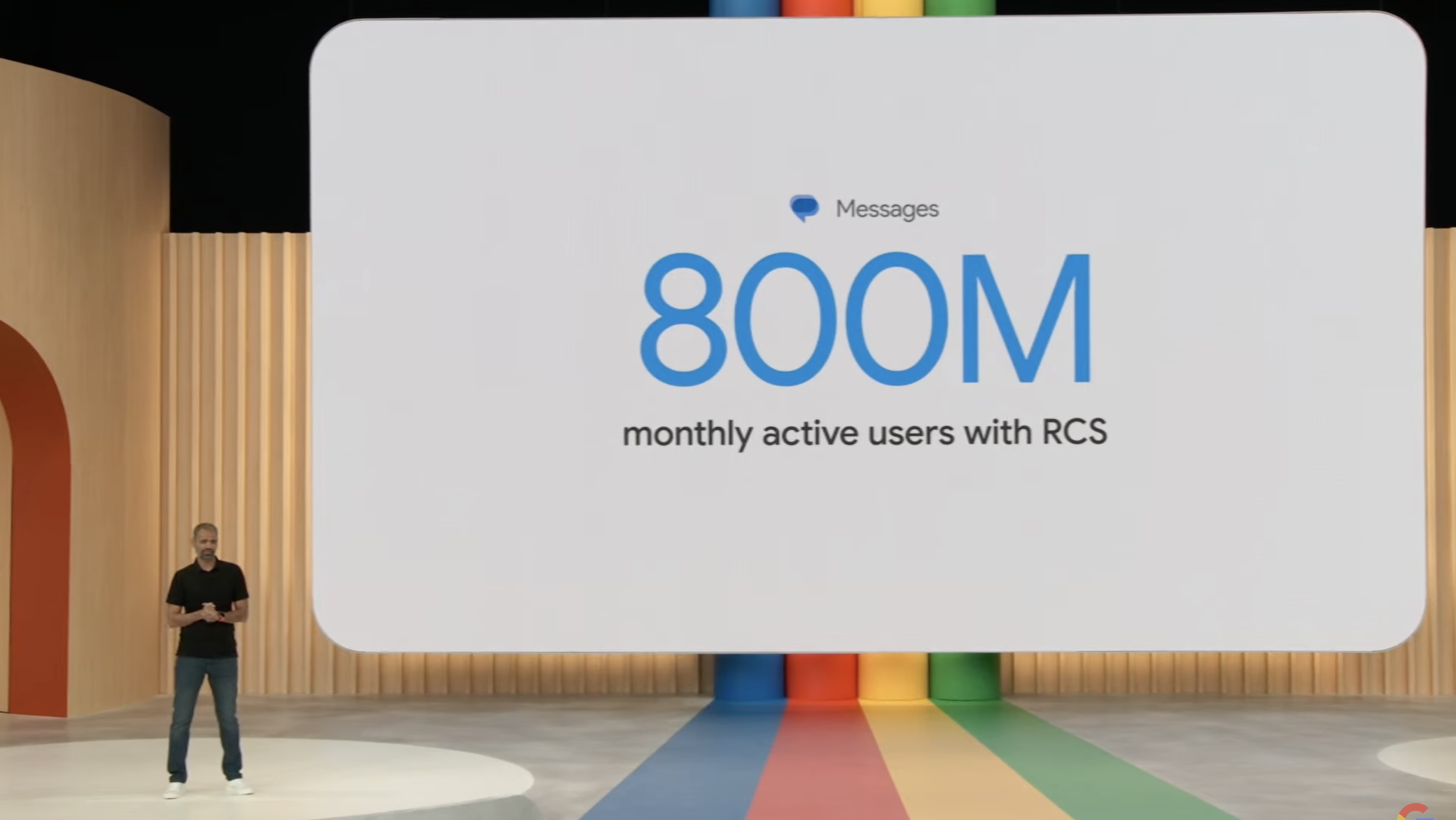
An update on RCS — there are now 800 million people using it. There should be 1 billion later this year. This is a shout-out to Apple to adopt RCS so that everyone can message each other, and those hateful green bubbles finally disappear.
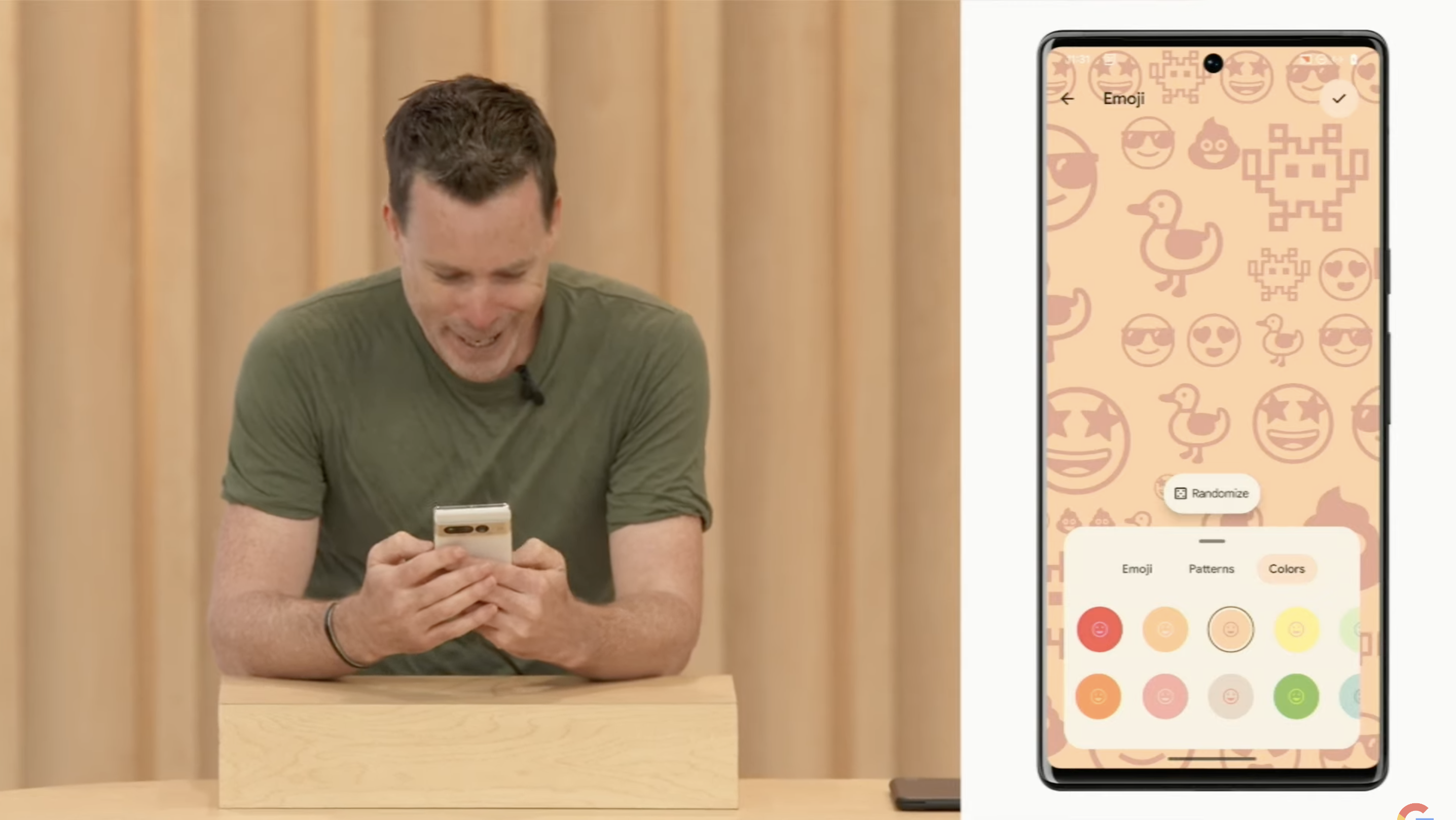
Android customization is getting a does of generative AI as well. In Messages, you can tap a message and then choose how you want to sound — your message is then tweaked by AI to fit that mood. (Could be handy if you've ever wanted to text in iambic pentameter, as apparently, there's a Shakespeare option.)
Lock screen clocks are getting more customization features, and there's a lock screen shortcut coming that will help that out. Emoji wallpaper is coming where you pick your favorite emojis to generate your own customized wallpaper, picking patterns and colors as well.
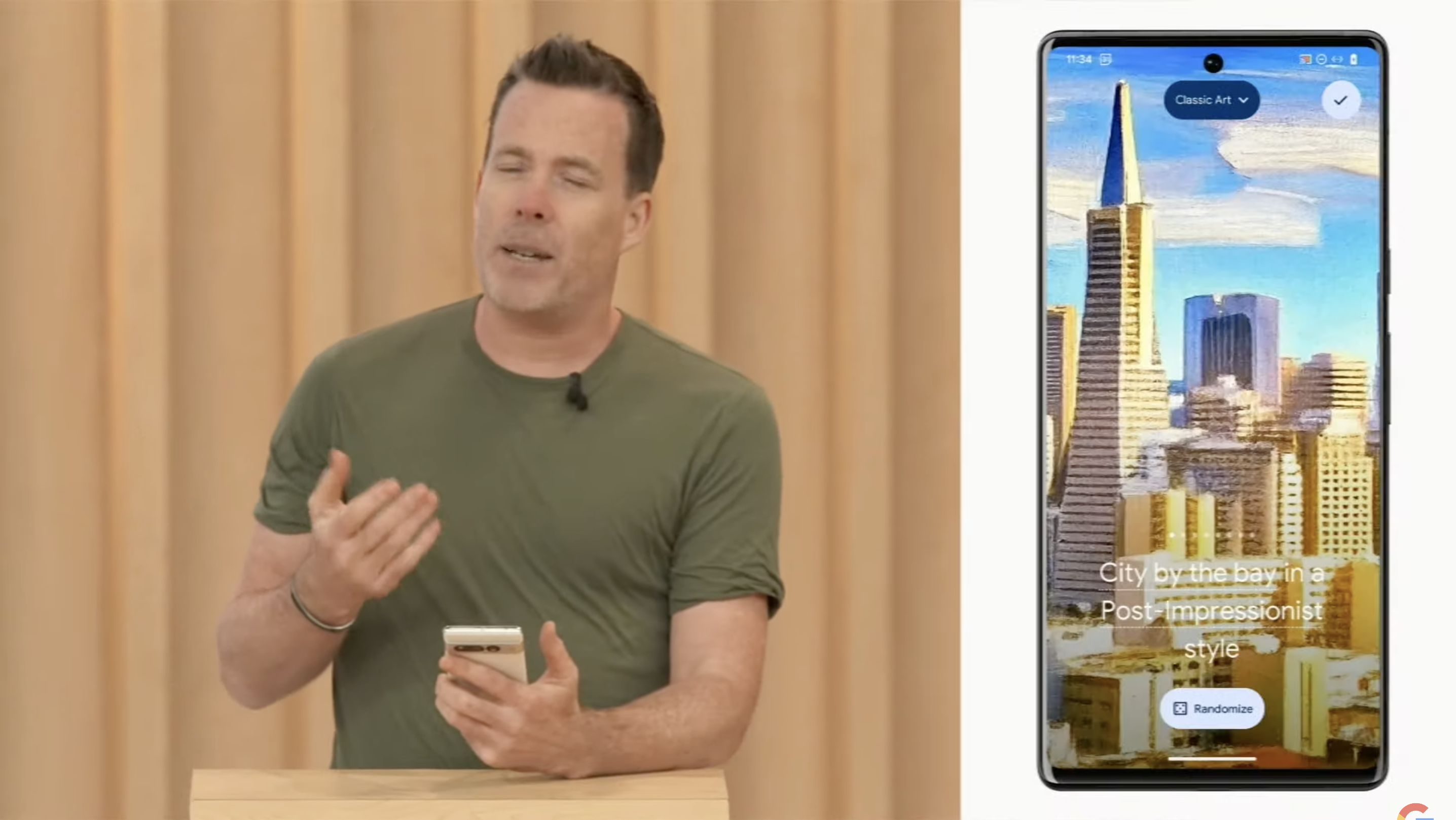
There's other examples of using AI to generate wallpapers — prompt your phone to create something from "photos of city by the bay in a post-impressionist style" for stylized San Francisco shots. That's coming in the fall, which would seem to imply it's an Android 14 feature.
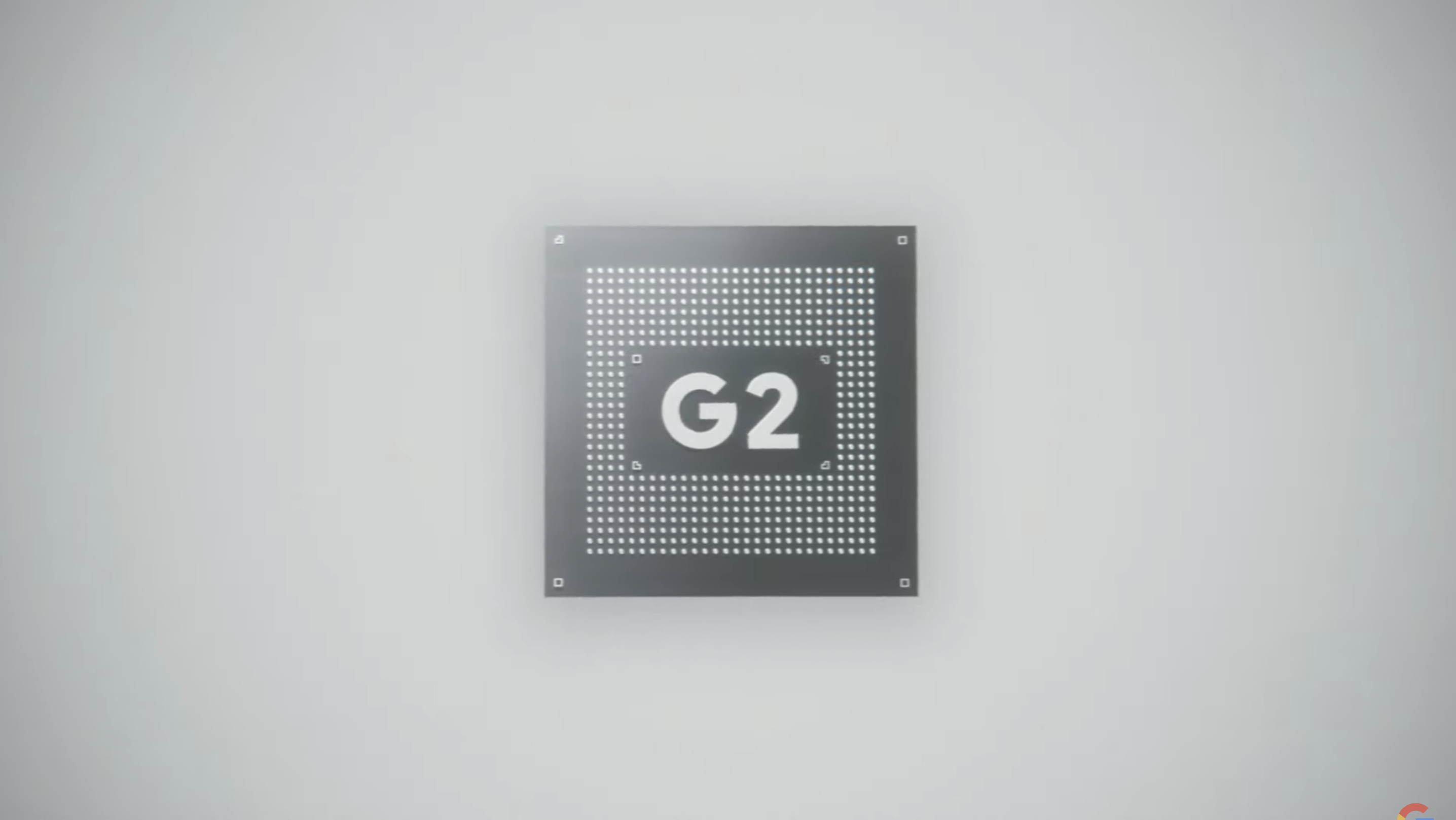
And now here's Rick Osterloh, so we're about to see some hardware after a brief recap of the Tensor G2 chip that came out last fall and brings on-device, personalized AI to mobile. Among the highlights are Direct My Call for managing phone calls, Pixel's Recorder app and its ability to recognize different speakers, and the AI-driven photo processing features of Pixel device cameras.
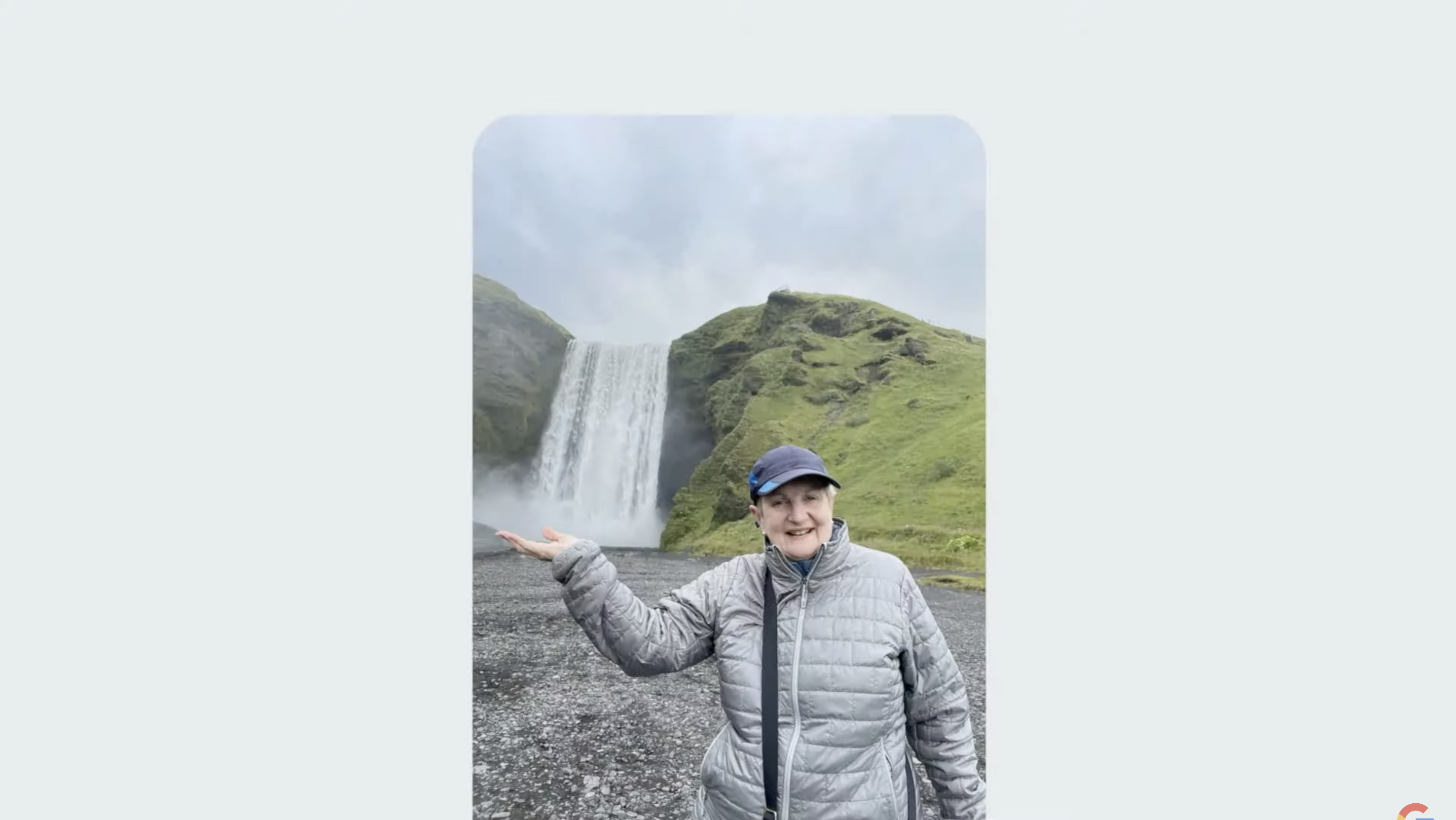
Flash back to the Magic Editor feature coming out later this year — that's going to be available to Pixel phone users first, apparently
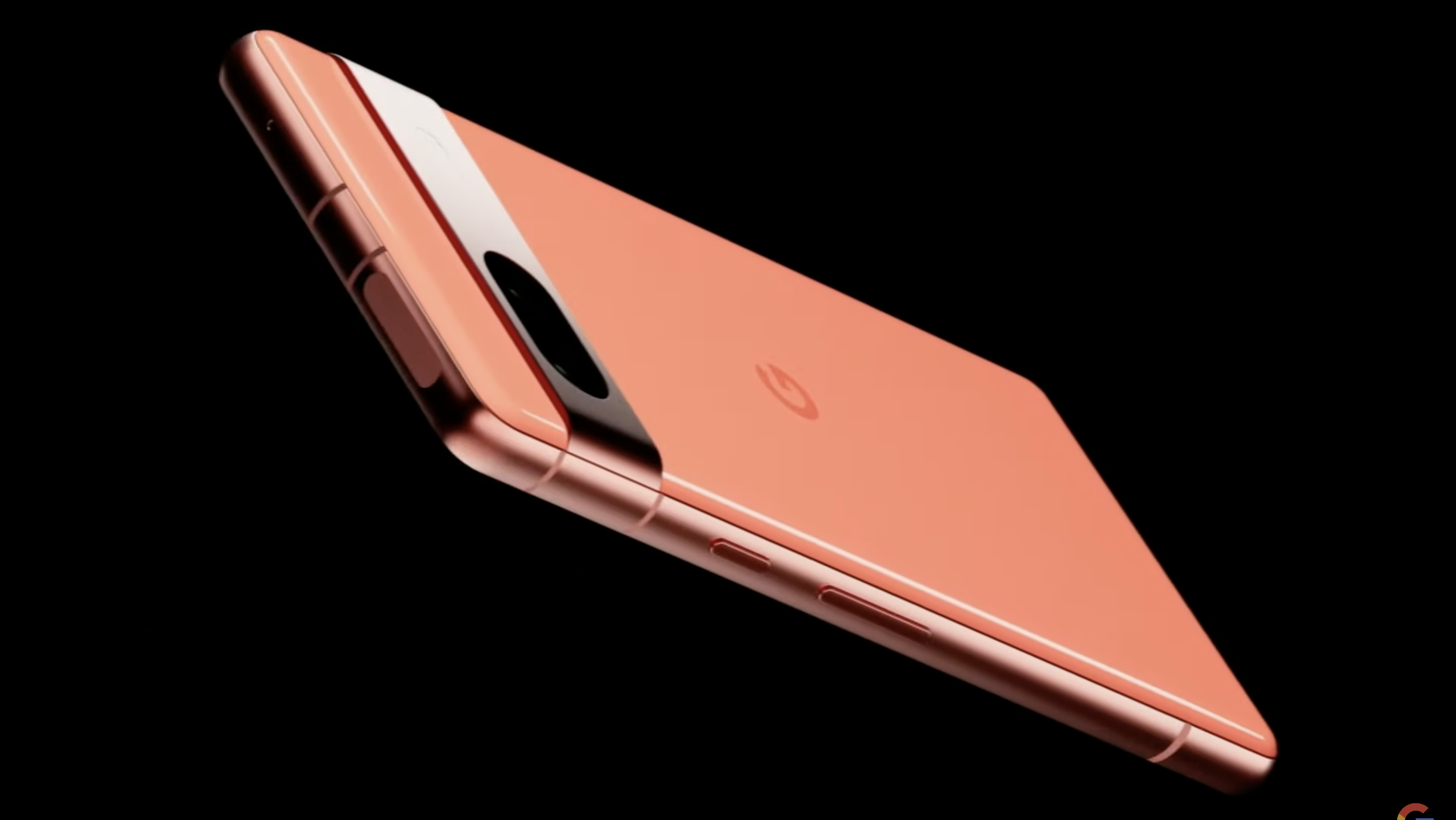
We've got a hardware announcement — the Pixel 7a. It's got the Tensor G2 chip, 8GB of RAM and a 72% bigger main camera sensor among other features.
It's available today, and it'll cost $499. That's $50 more than the Pixel 6a. Buy it from the Google Store and you can pick an exclusive Coral color from the three colors that will be available to everyone else.
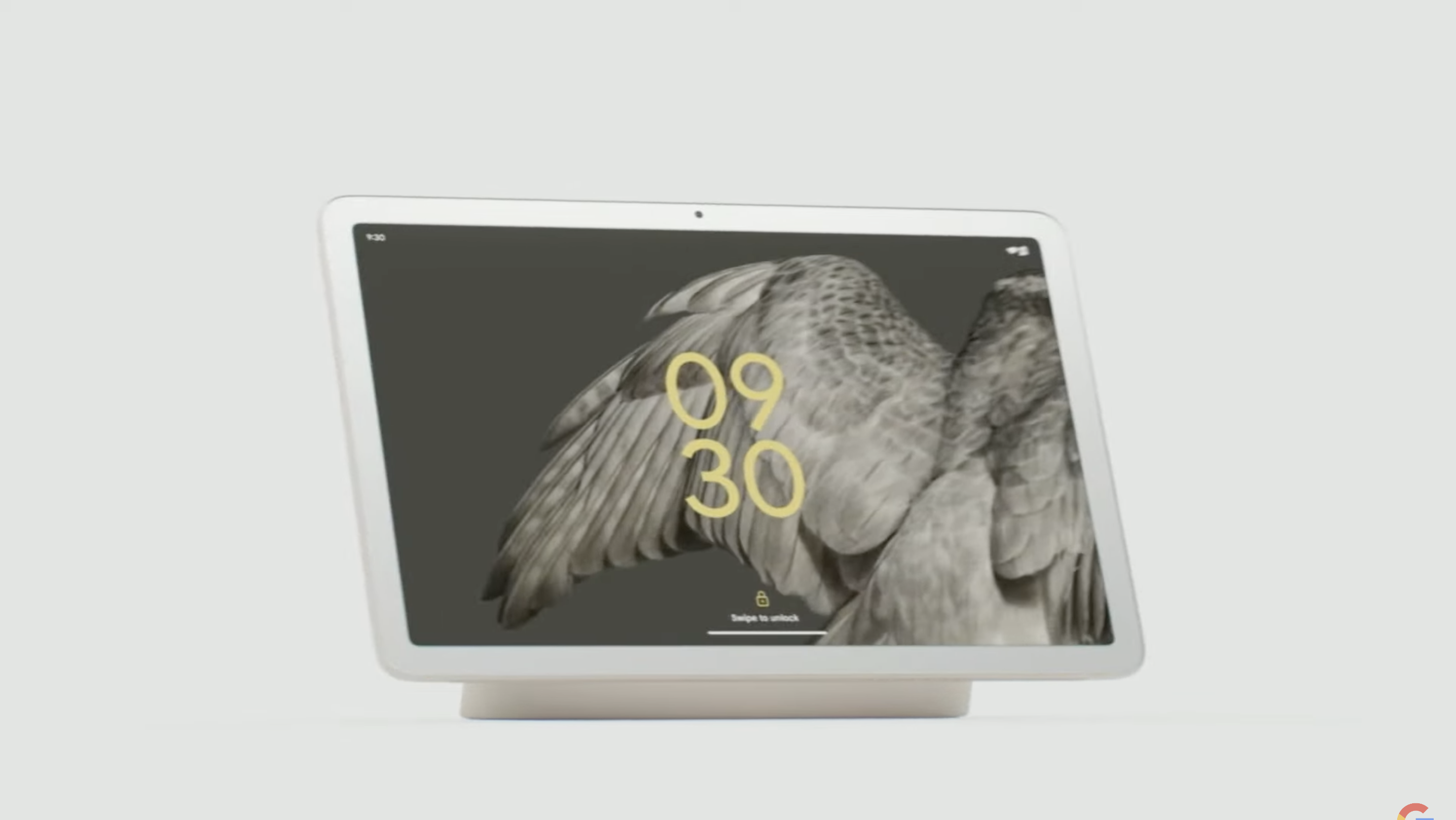
But what about larger screen devices? Let's talk about the Pixel Tablet, which we've seen at past Google events. But to recap — 11-inch display, premium aluminum enclosure, and a Tensor G2 chip, among other features. Tensor has been optimized for video calling and photo editing, both features you'll appreciate on a tablet.
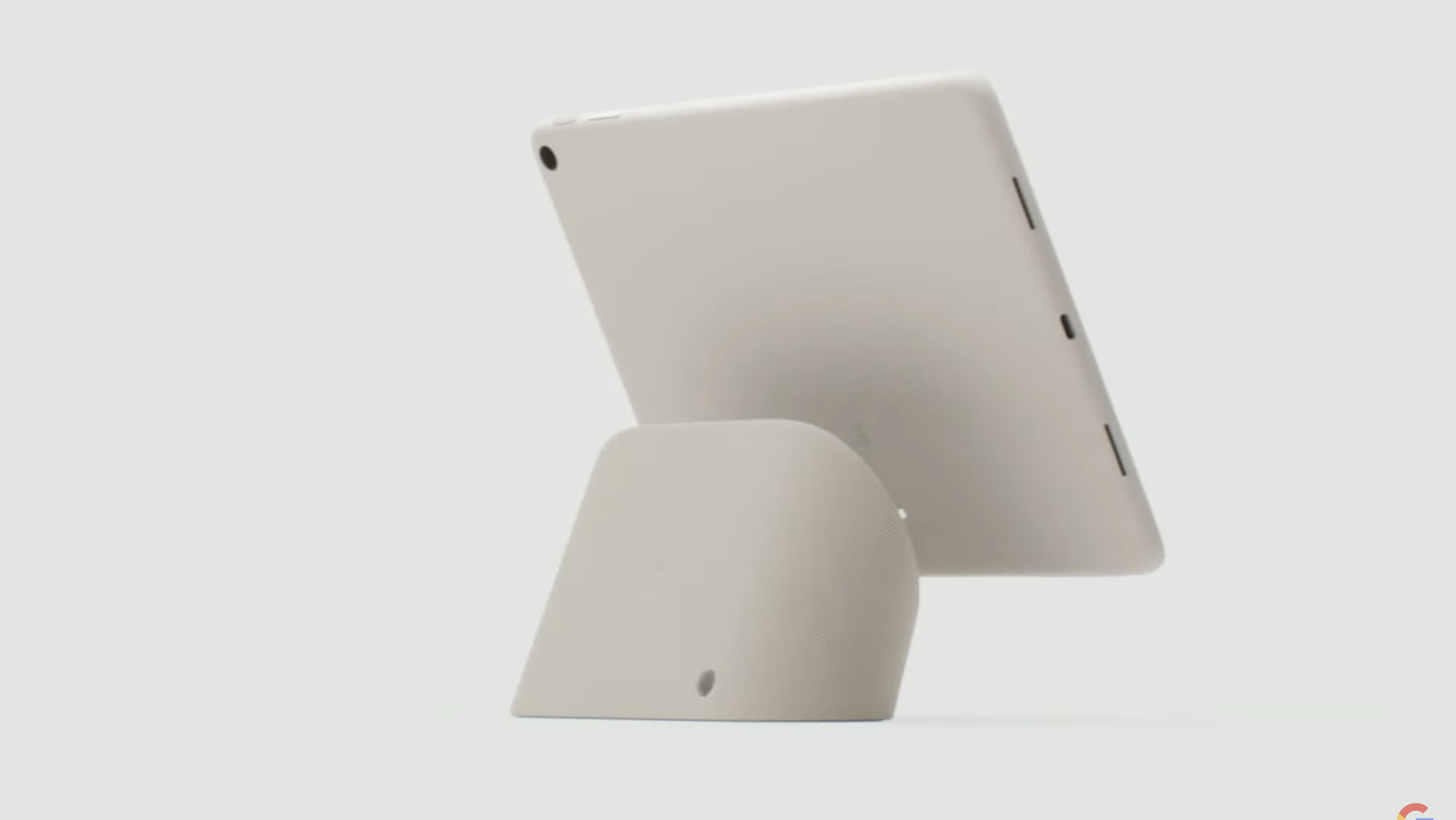
The tablet is getting a charging speaker doc, so that your tablet has a home when it's not in use. Basically when docked, it's a smart screen where you can display pictures, play music and control smart home devices. But you can unlock it, too, and get access to Android apps.
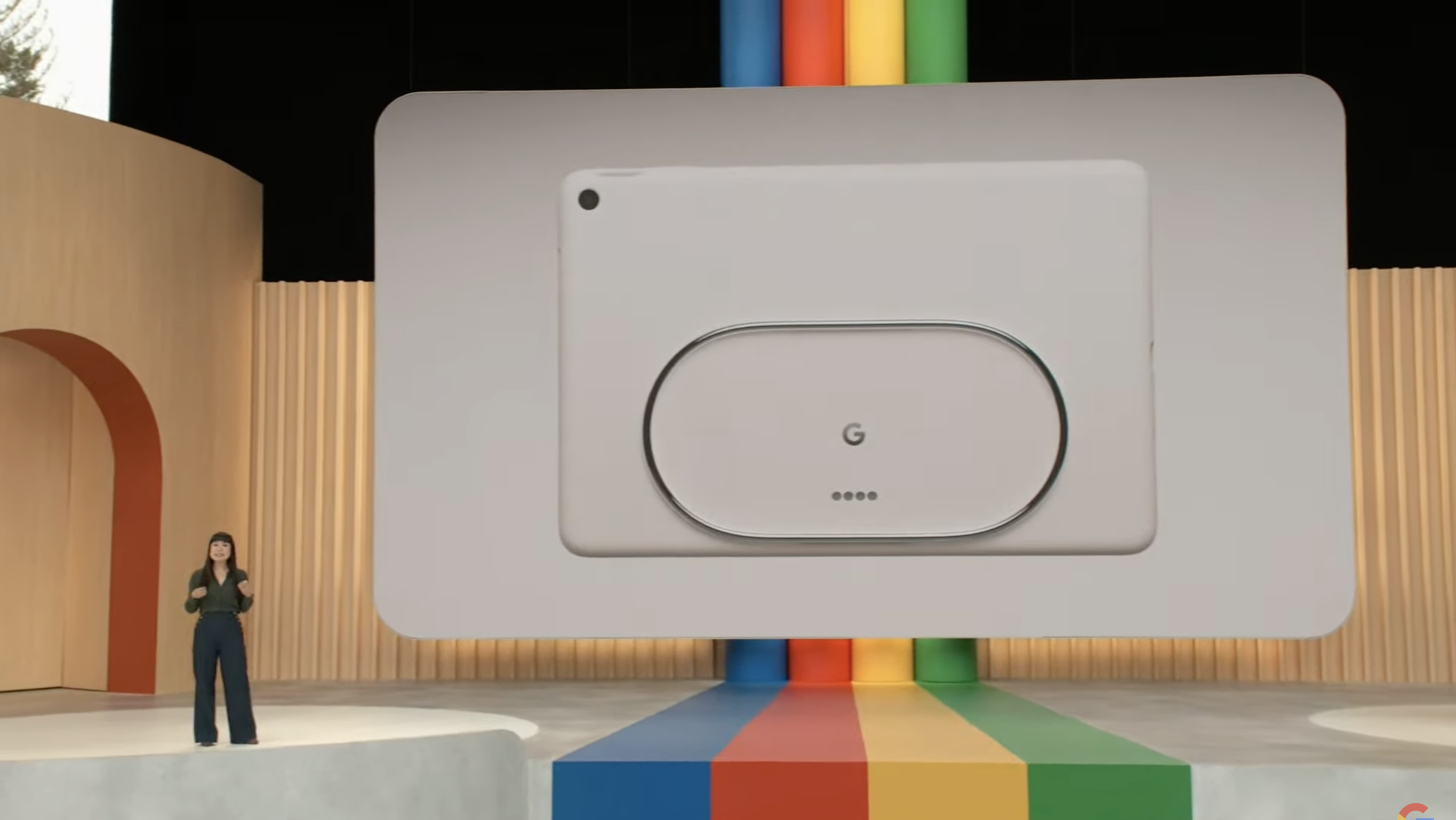
Pixel Tablet also has Chromecast built-in, so you can cast things from your phone to your tablet and watch from the dock or on the go.
There's a case, too, with a built-in stand. You can dock with the Pixel Tablet inside the case, too.
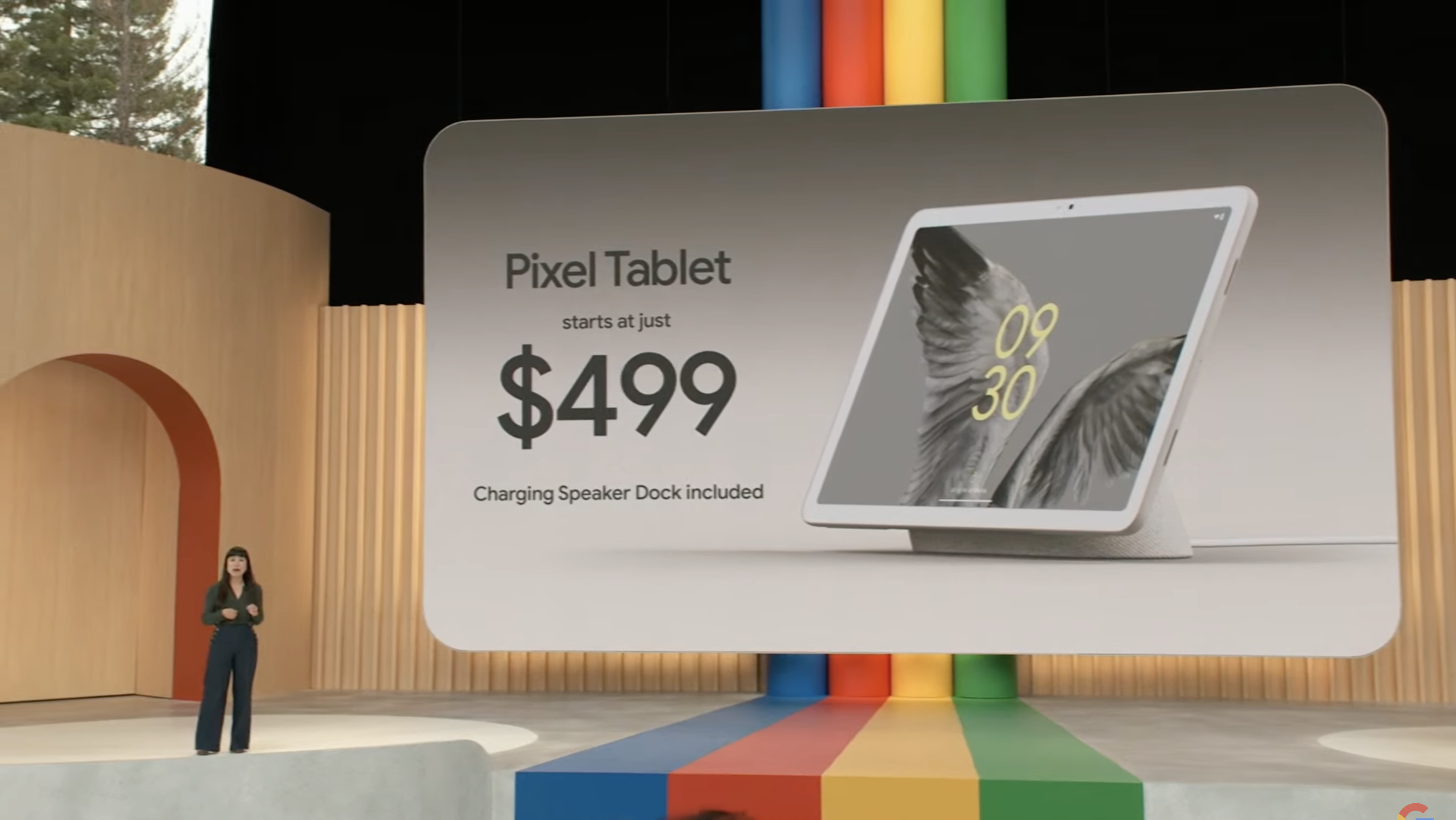
There are three Pixel Tablet colors. You can order it today, and it costs $499. That price includes the charging stand.
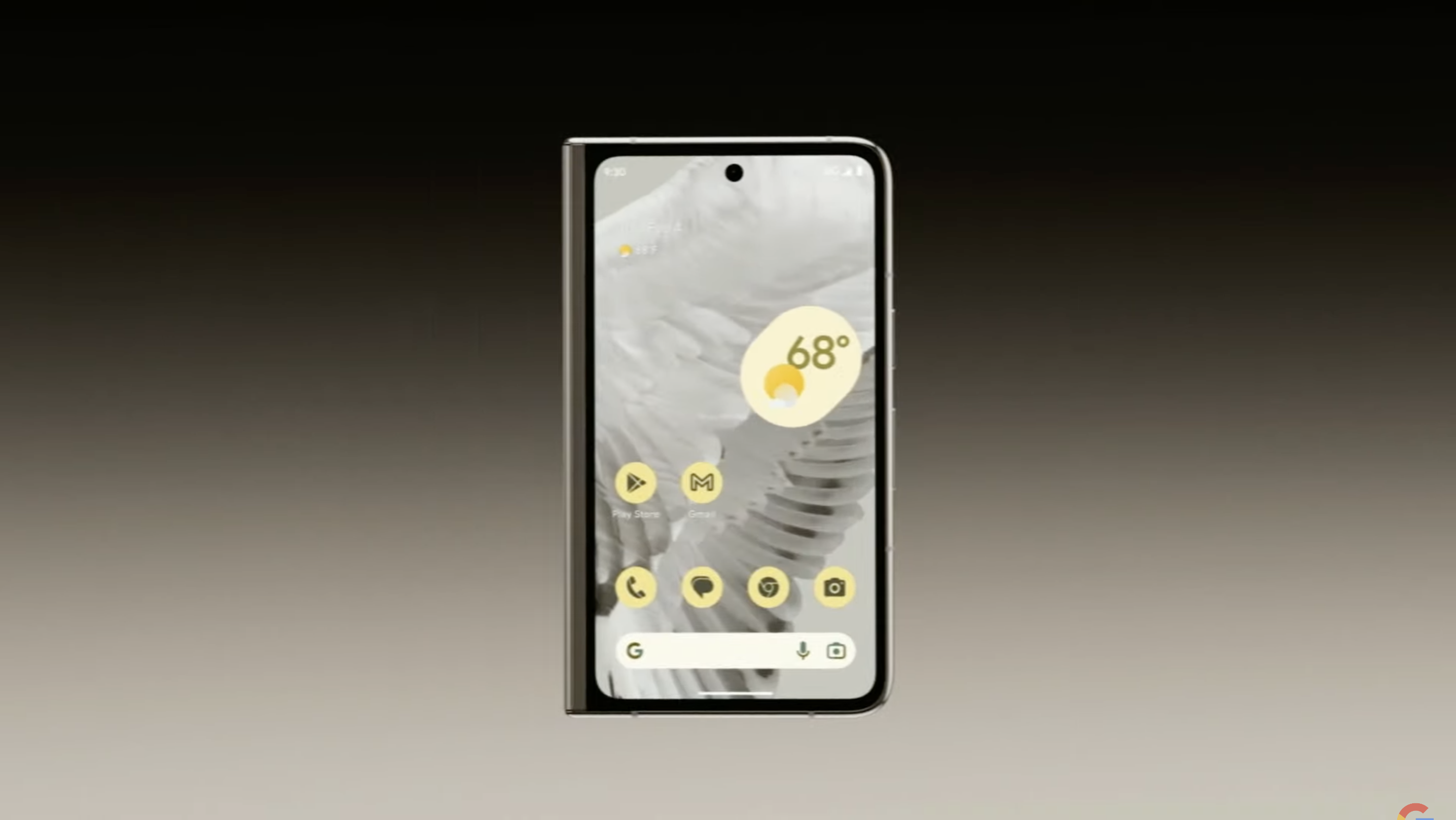
Rick Osterloh is back to talk about foldables. It's exciting to see foldables take off, and see how Android is driving that, he says.
So Google has its own foldable now — the Google Pixel Fold. It's a Tensor G2-powered phone that unfolds into a tablet. You've got a front display and a larger 7.6-inch interior screen that Osterloh calls our "thinnest phone yet." That's with the device unfolded, obviously.
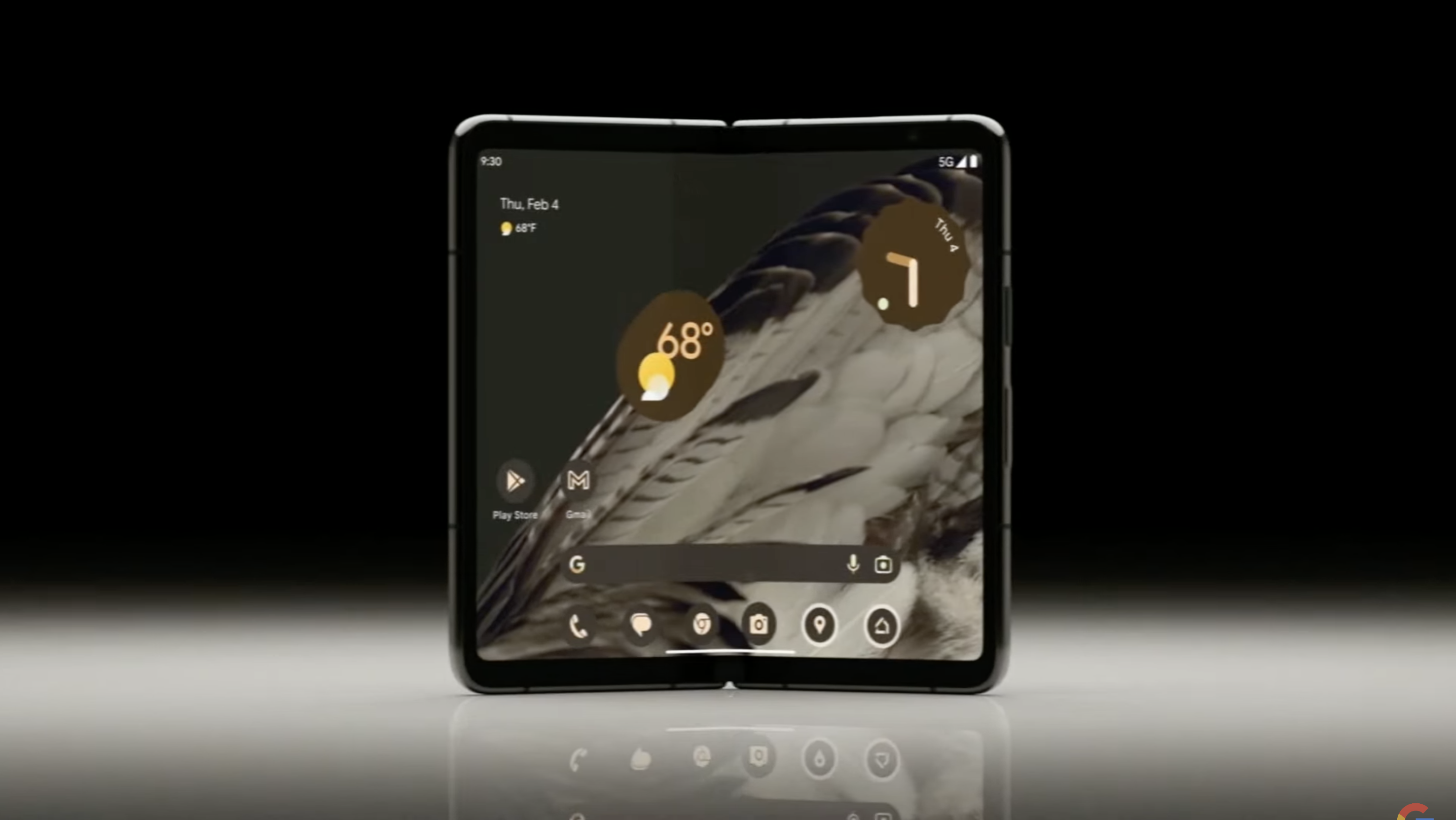
Gorilla Glass Victus and IP68 water resistance provide the durability assurances. Google's also touting the zoom lens as the best zoom on a foldable, and points out that you can partially open up the phone to have it act as its own tripod. It's the "best foldable camera system," Osterloh says, while Samsung undoubtedly pouts.
I'm intrigued by the dual interpreter mode that Google is touting for the Pixel Fold, which seems to use the multiple screens to have you carry on a conversation in real-time with someone in another language. Foldable phones need to justify their reason for existing and this is a big step toward doing that.
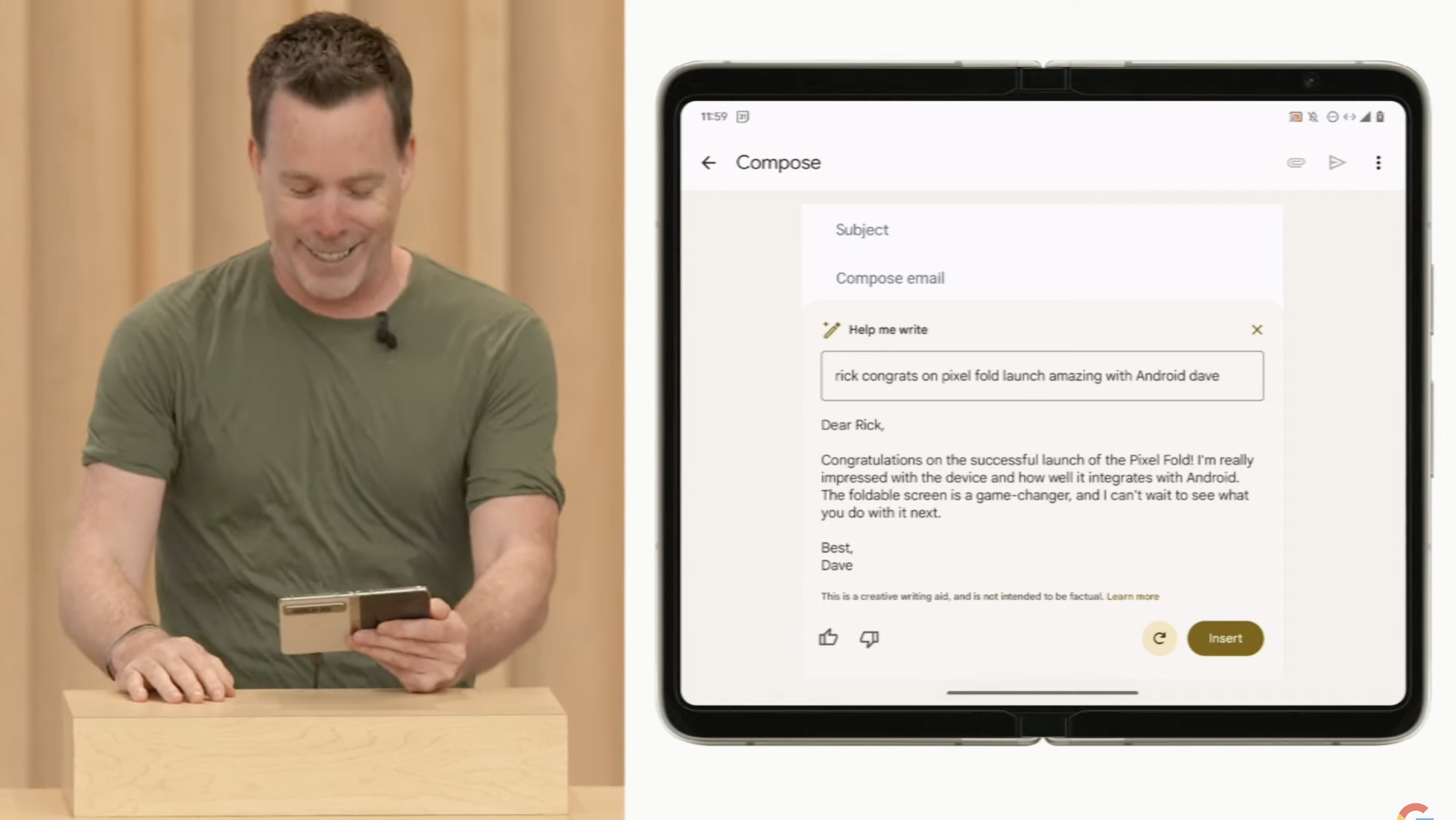
We're also getting a look at how apps can take advantage of the expanded interior screen, with apps running side by side, a split screen keyboard and a tabletop mode (think of Samsung's Flex mode) where playback is on one half of the screen and controls are on the other.
The Pixel Fold looks good but about that crease… #GoogleIO pic.twitter.com/f3QoWbRISIMay 10, 2023
Yes, we can see a crease in that Pixel Fold screen.
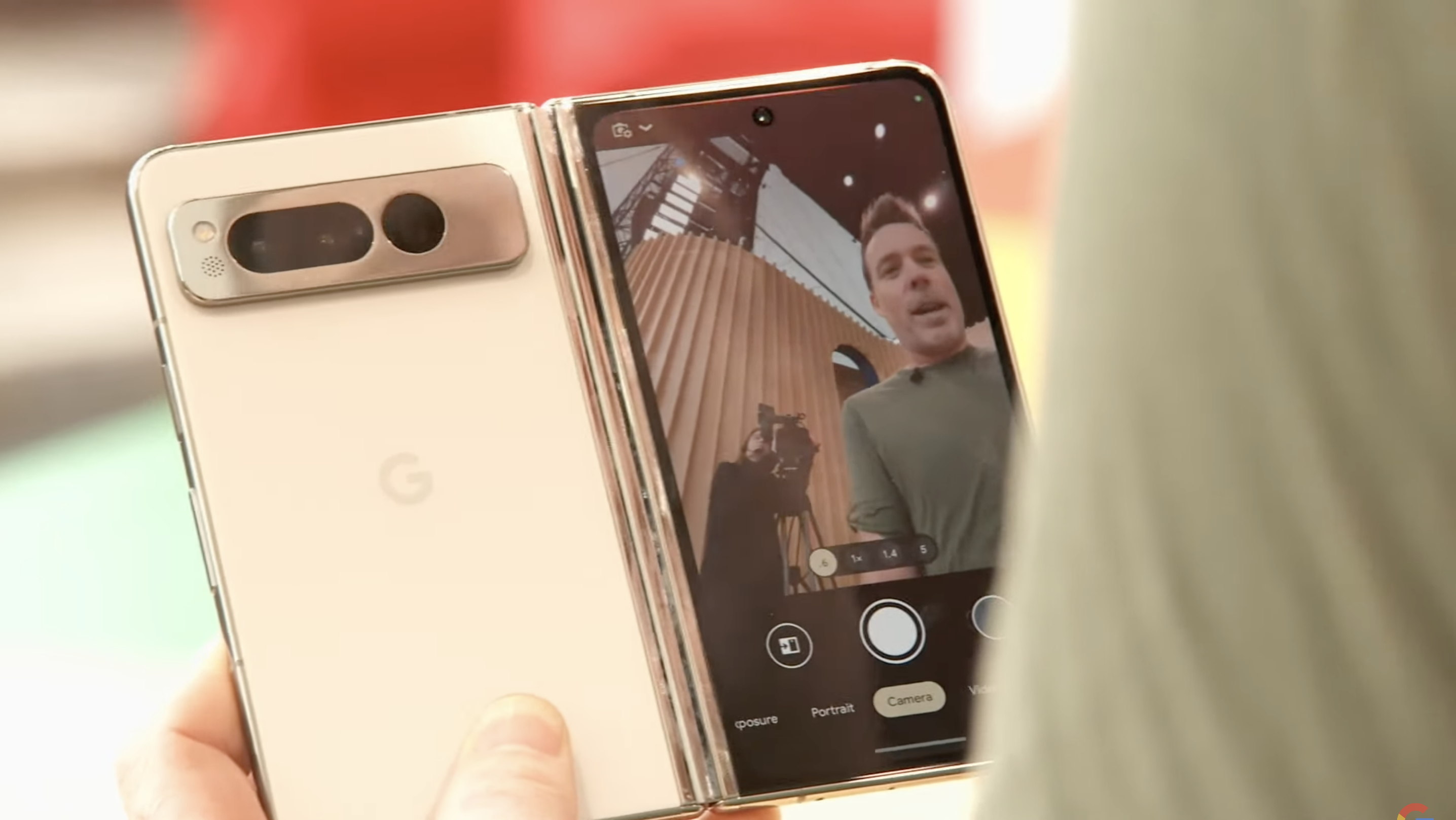
You can preorder Pixel Fold today. It ships next month. Rick Osterloh specifically didn't mention the $1,799 price, but preorder the foldable and you get a Pixel Watch, so there's that.
And Sundar Pichai returns to wrap up a two-hour, AI-heavy affair. I'm sure there will be more to say about these assorted products, so don't close the tab on this keynote just yet.
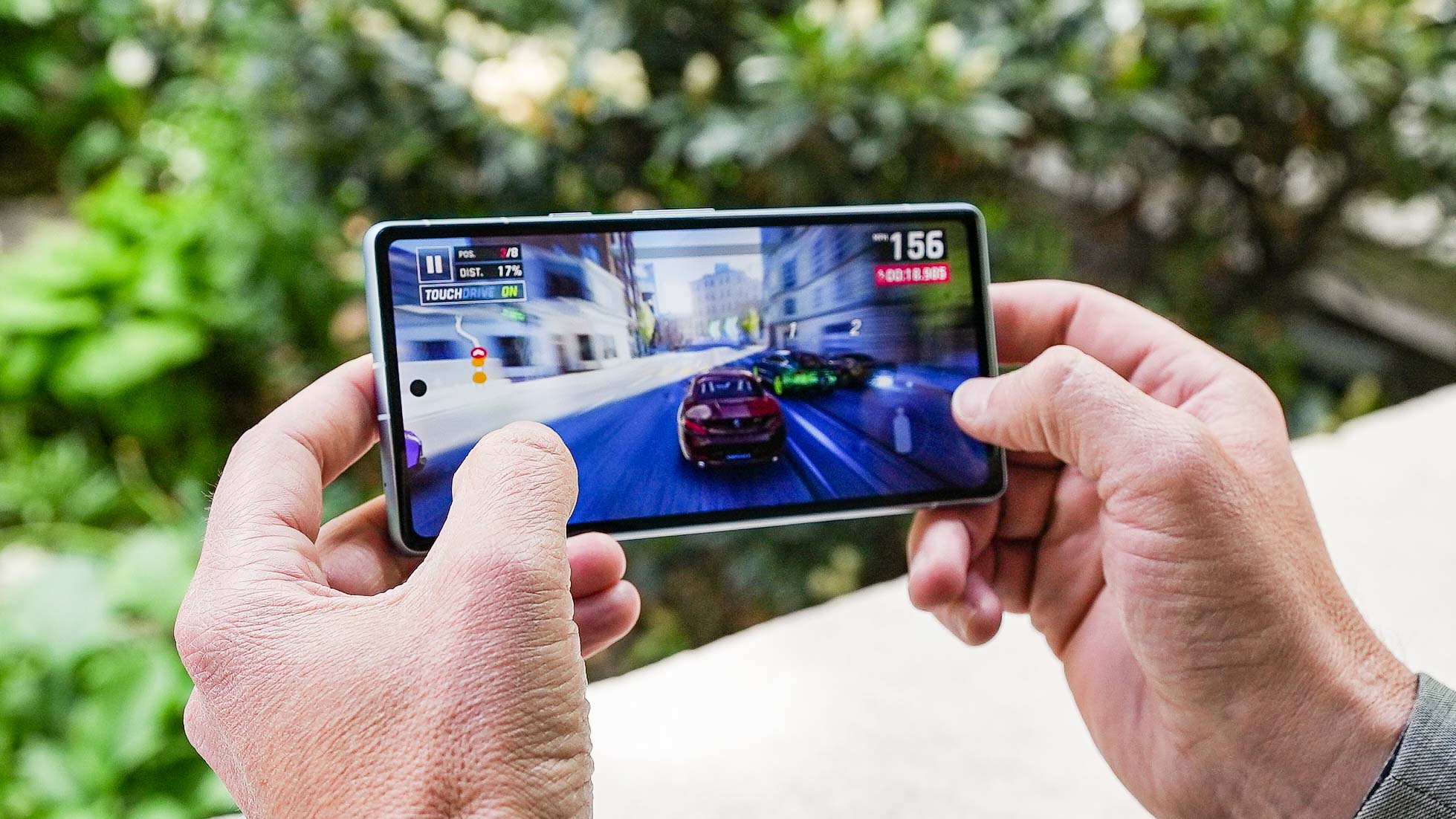
Who wants to read a Pixel 7a review? I know I would.
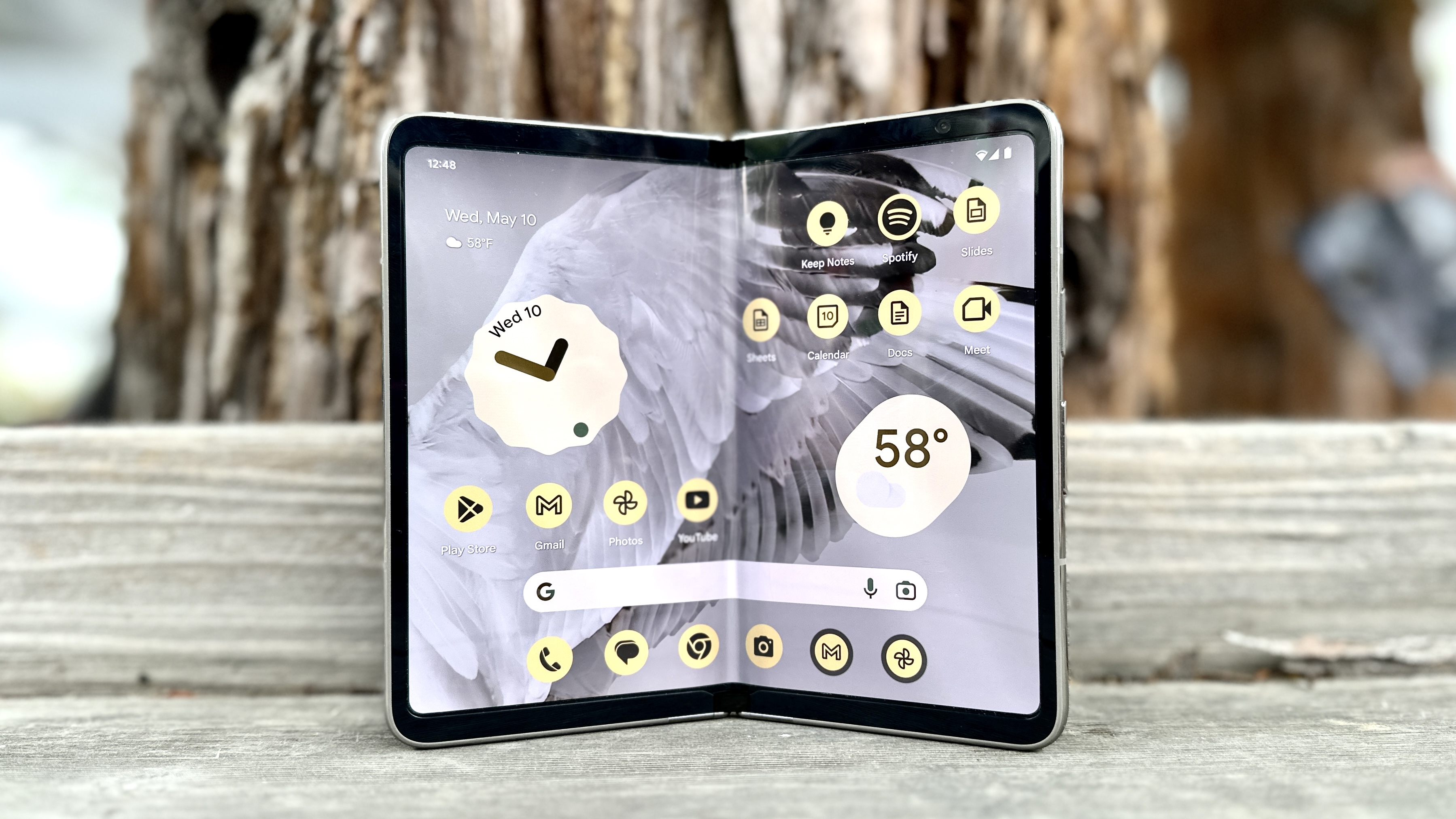
Our Google Pixel Fold hands-on review is live, and this is an impressive first foldable phone from Google. It's the world's thinnest foldable, and Google claims the 180-degree fluid friction hinge is the most durable on the market. We also love the wide front display that's easy to use and the multiple usage modes, including, tablet, tent and tabletop.
In short, this is one versatile foldable phone, but it's also $1,799. And we're not fans of the large bezels. See our first impressions for much more info.
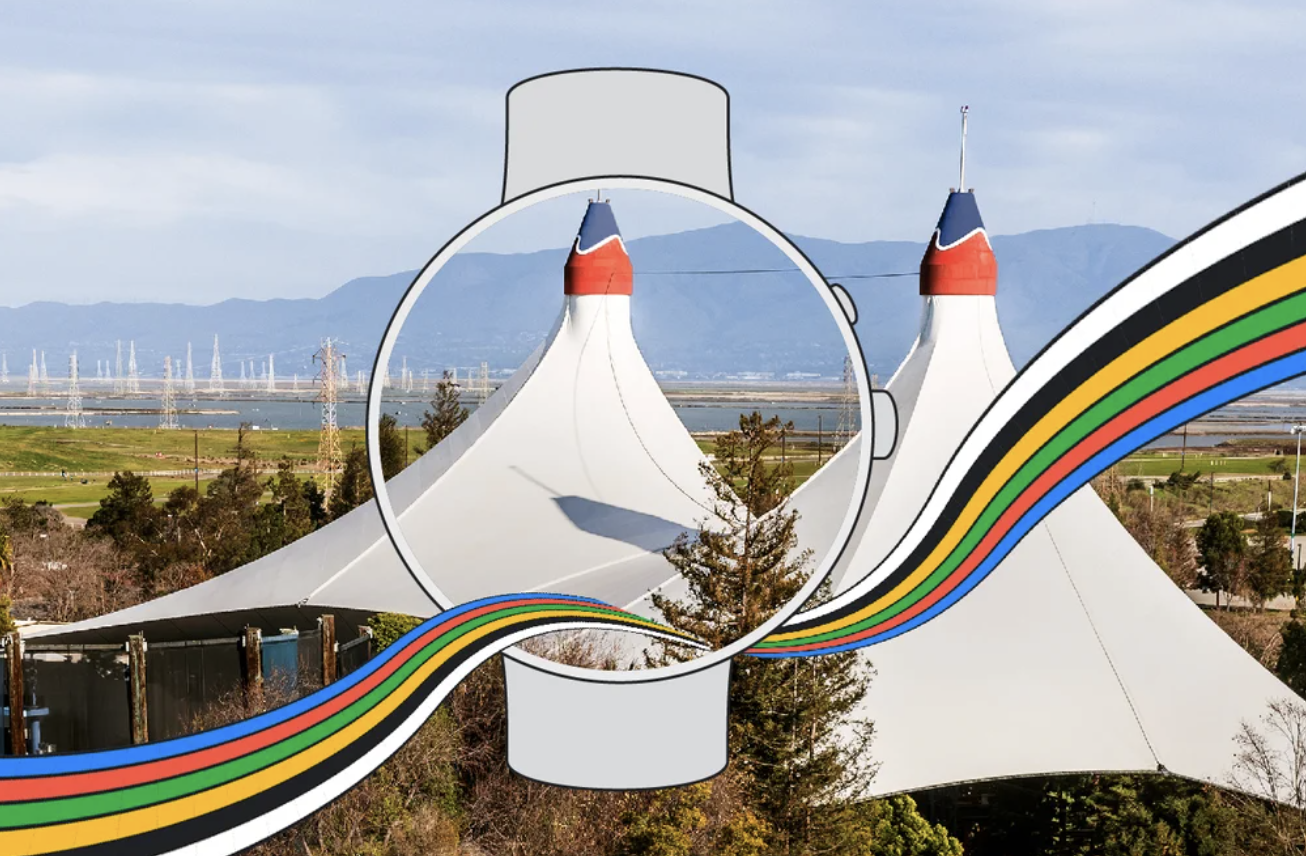
While the I/O keynote saw the announcement of WhatsApp for Wear OS, Google buried the lead: Wear OS 4 was confirmed via a blog post on The Keyword. The new software version is becoming available to developers, and promises battery life improvements among other user-facing improvements compared to Wear OS 3.
Our Google Pixel Fold video hands-on is live on YouTube. See my hands-on impressions!
Here's the gist. The Pixel Fold shines with its wide front display and super thin design. I also like the multiple usage modes — include tablet top and tent — and the 7.6-inch main display is great if you want a mini tablet in your pocket.
Just watch out for the big bezels and the very big $1,799 price.







